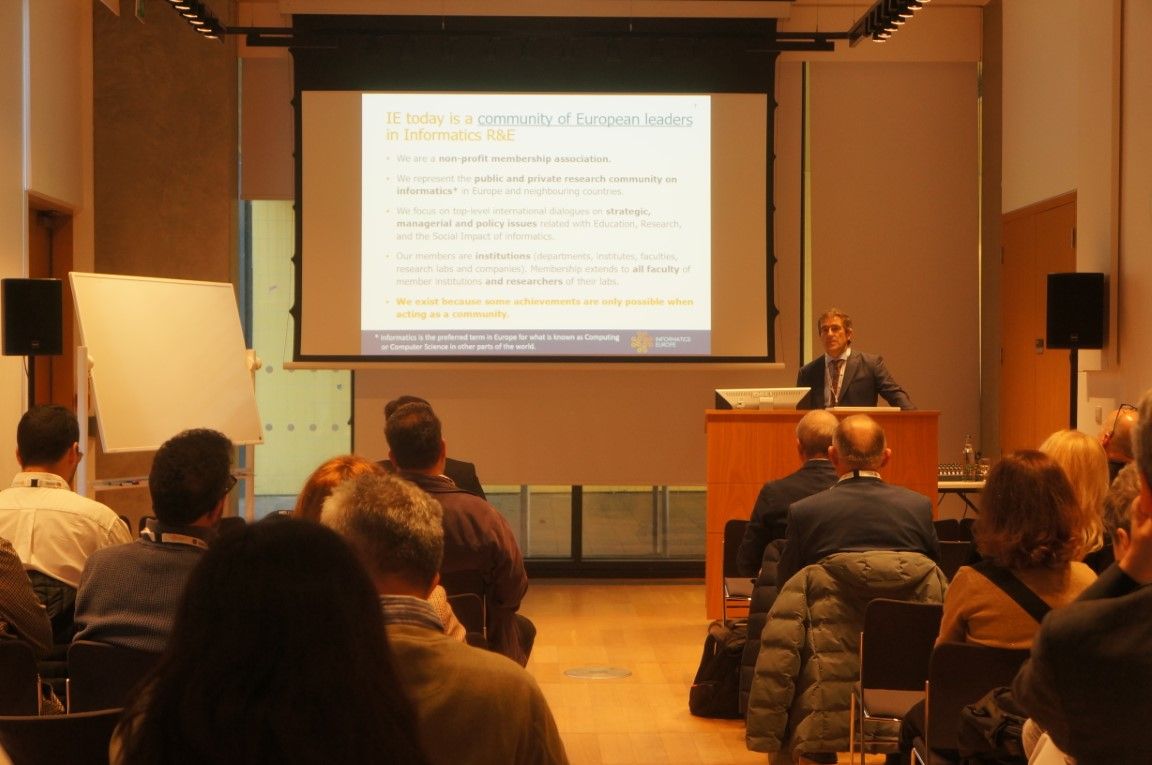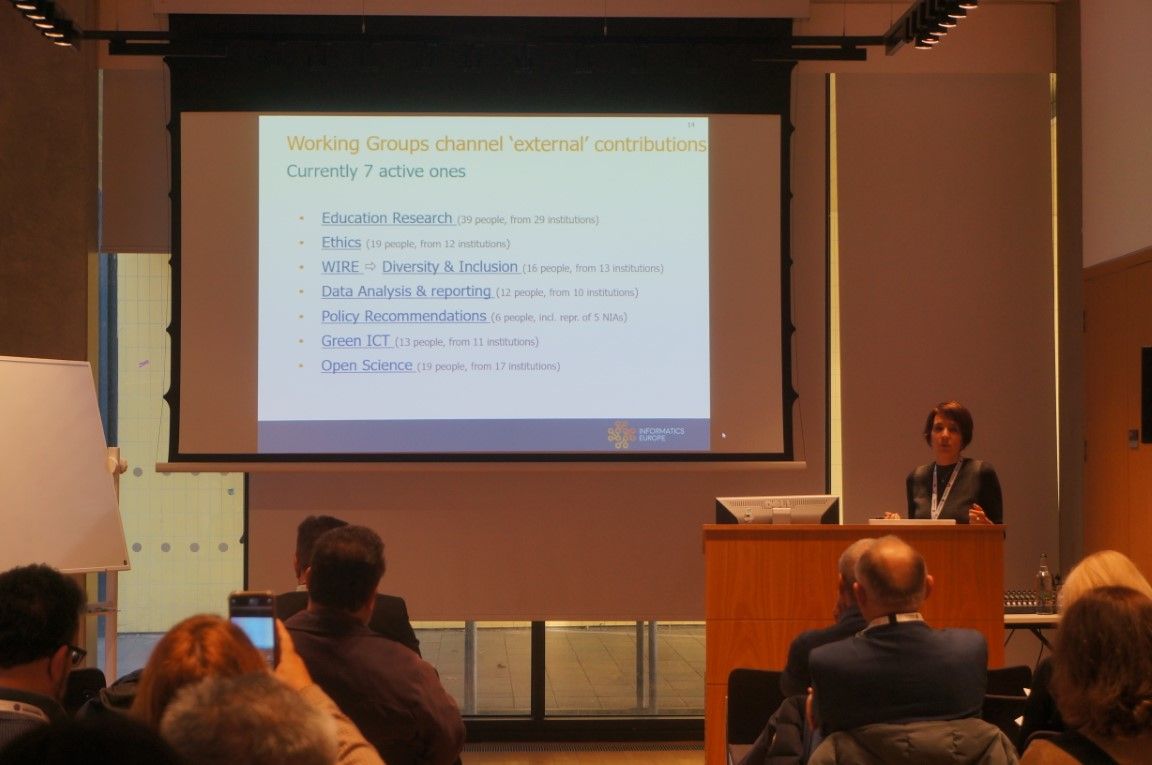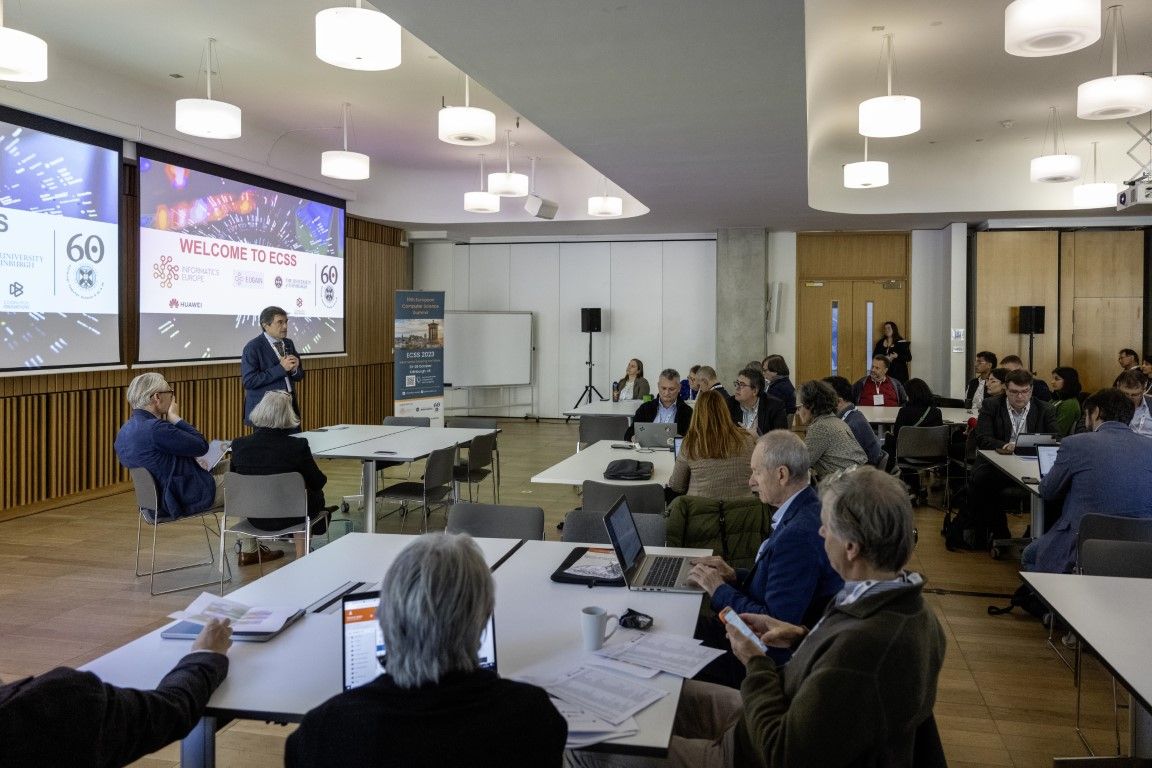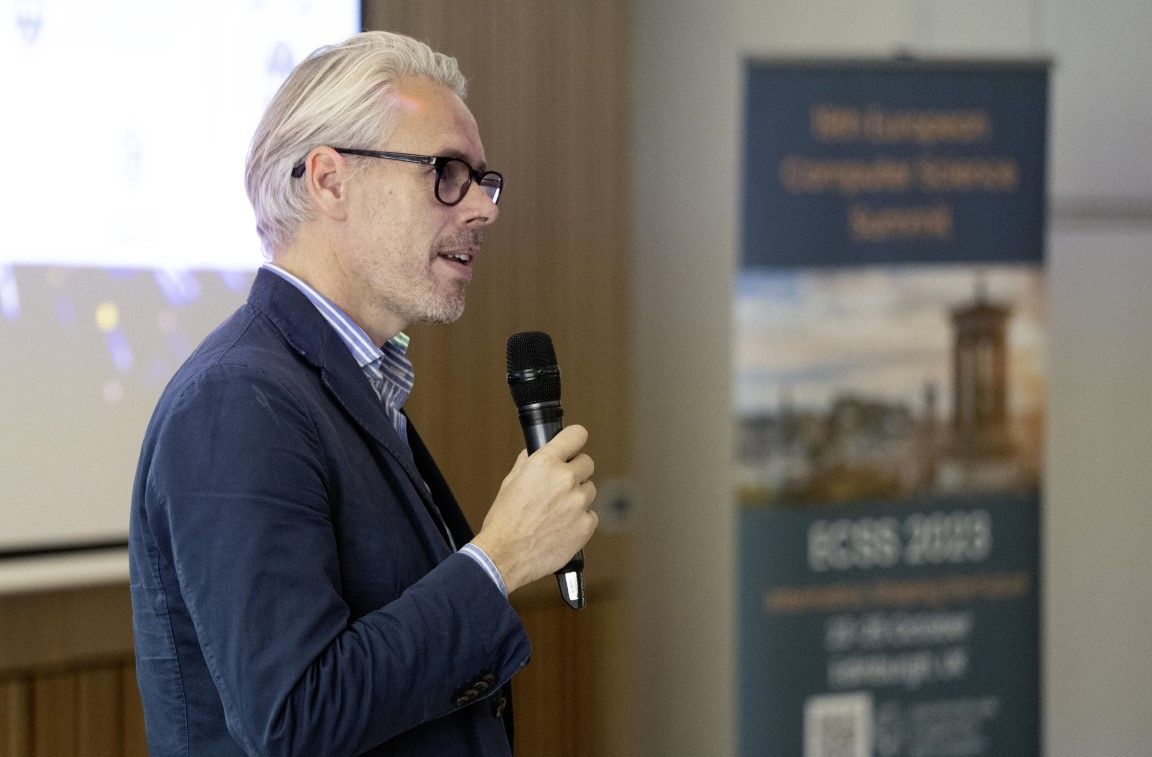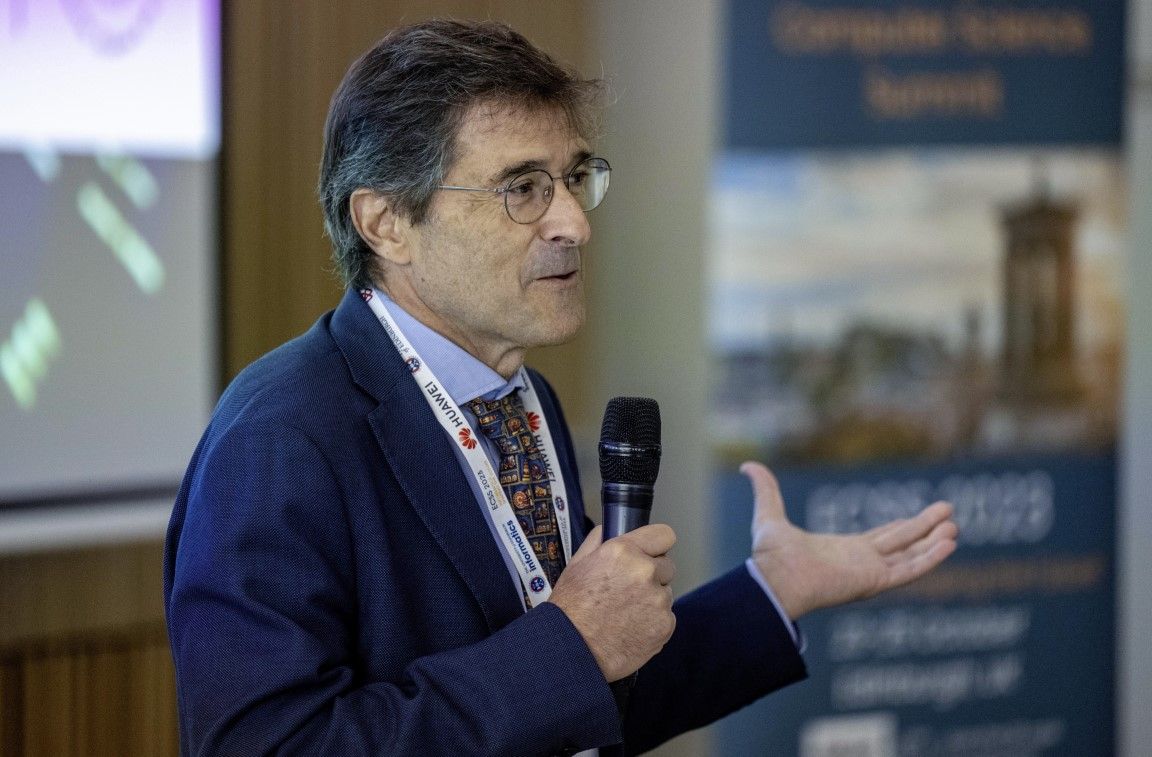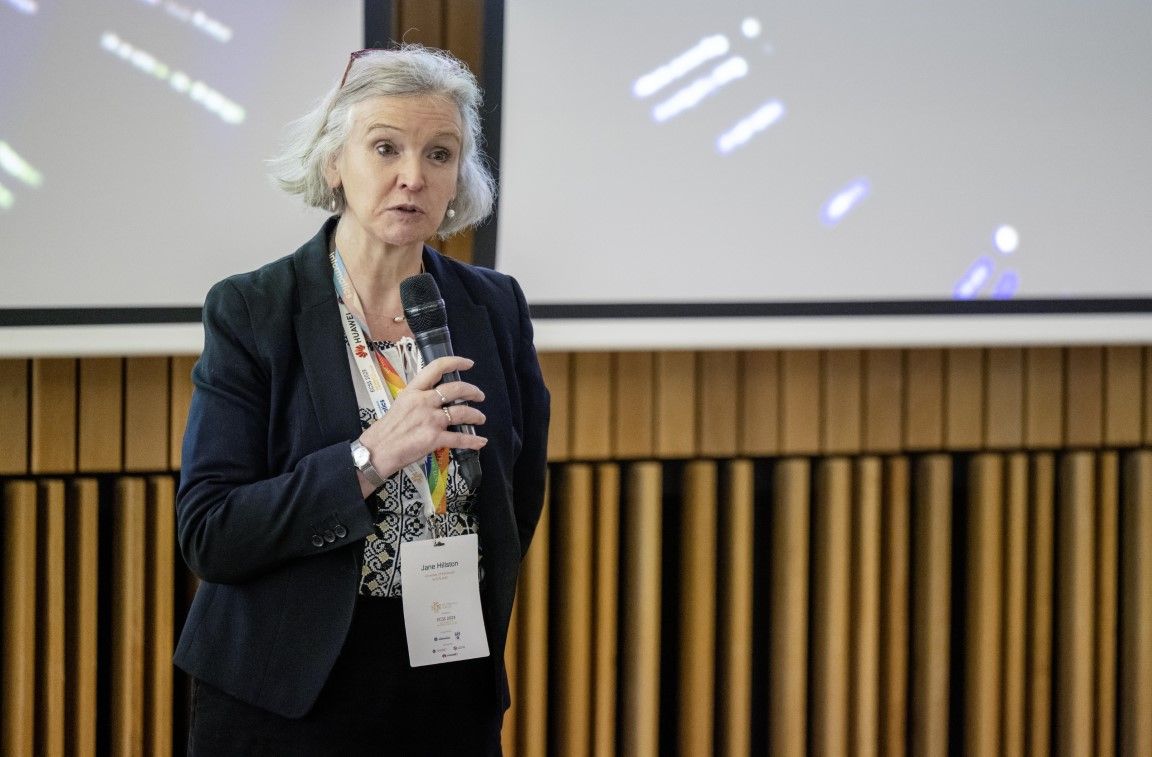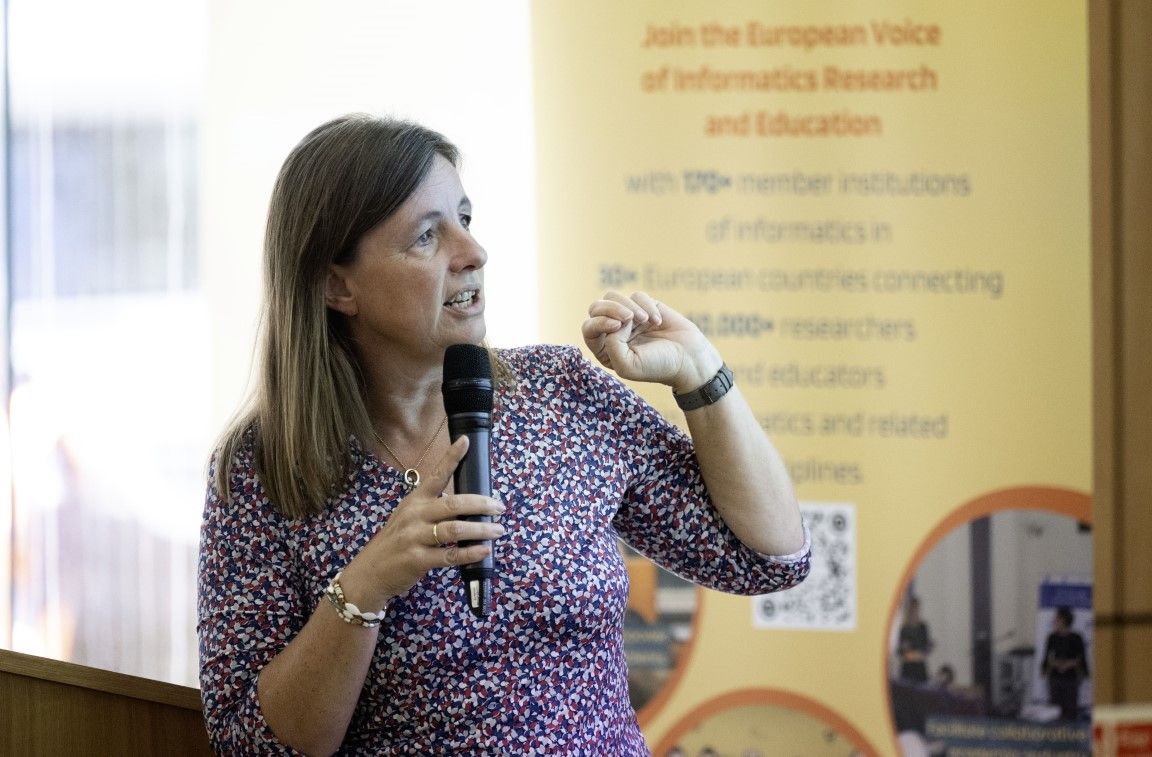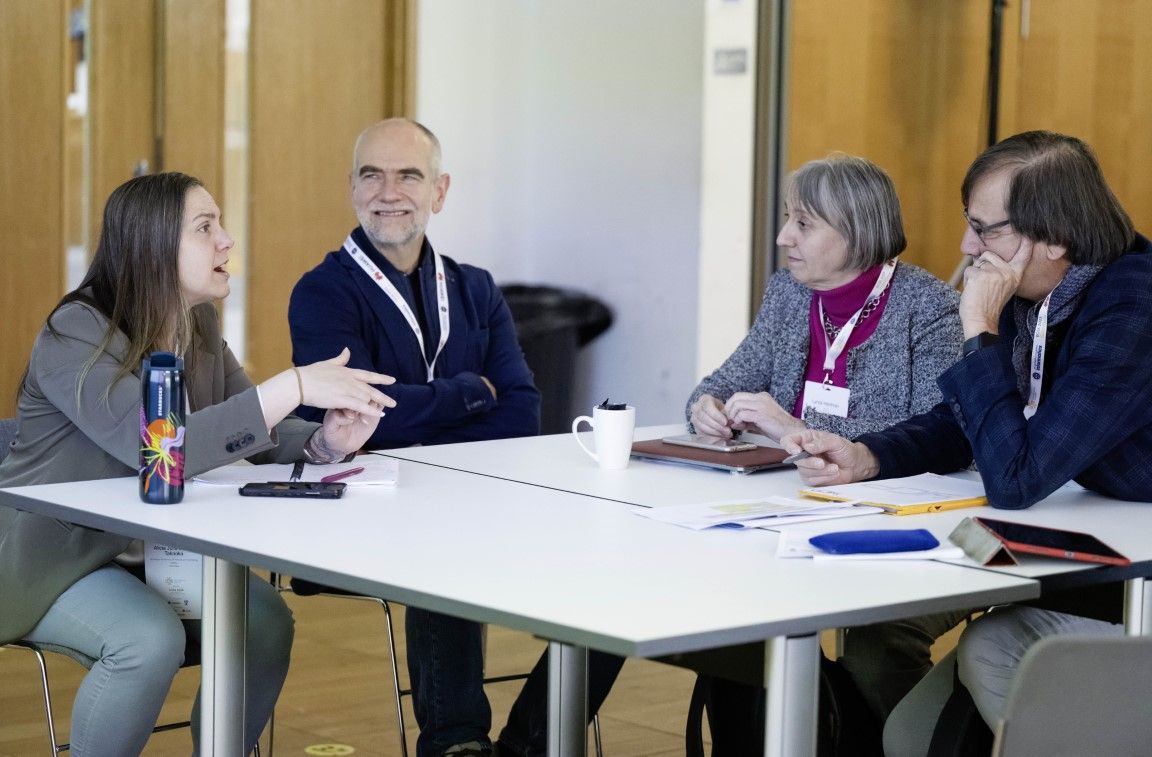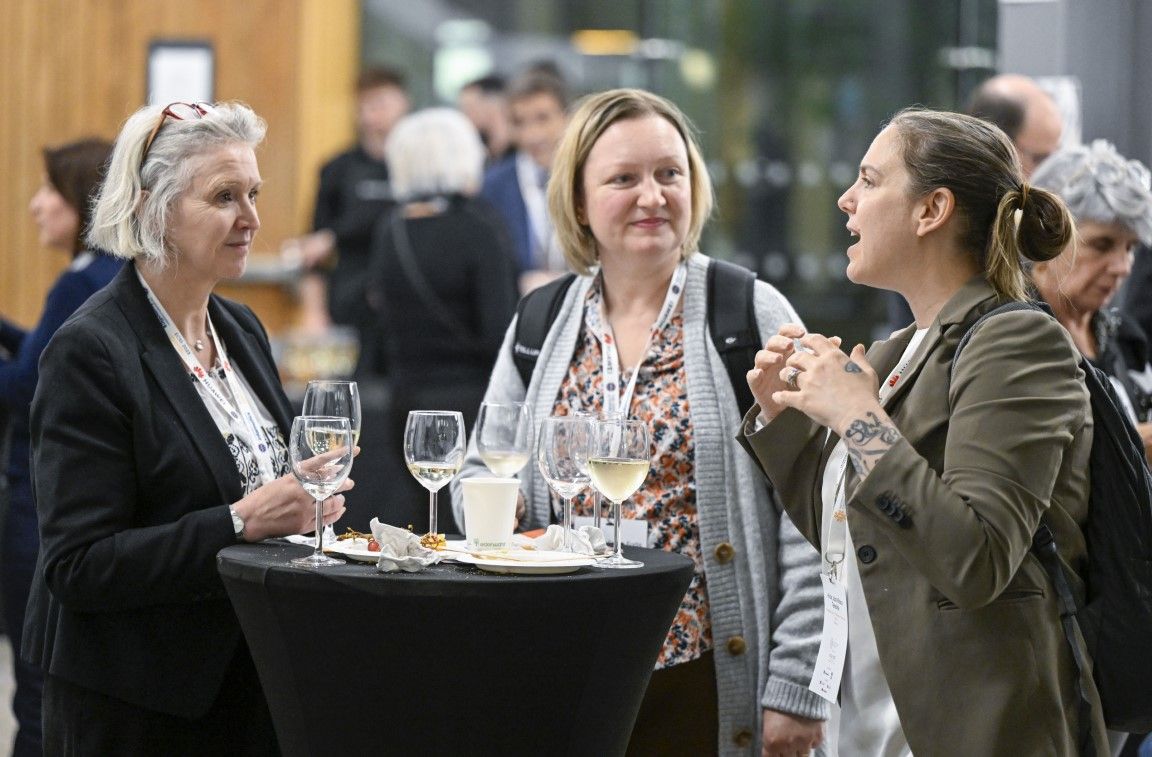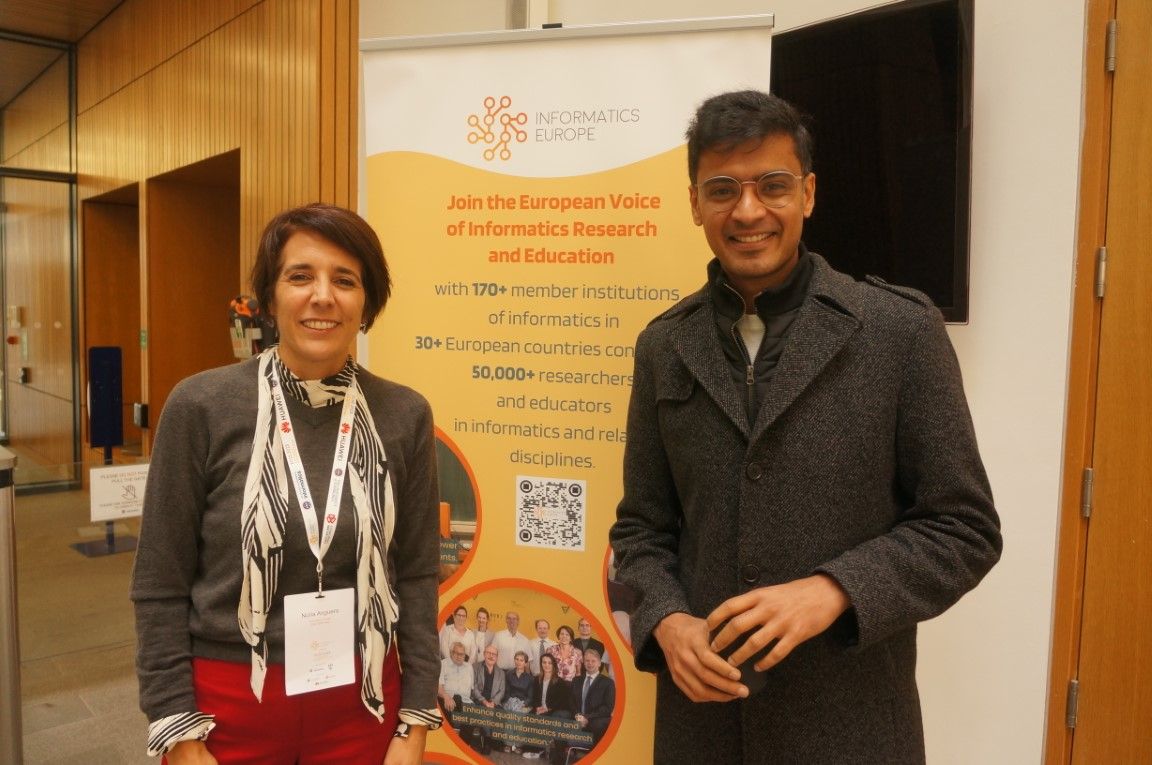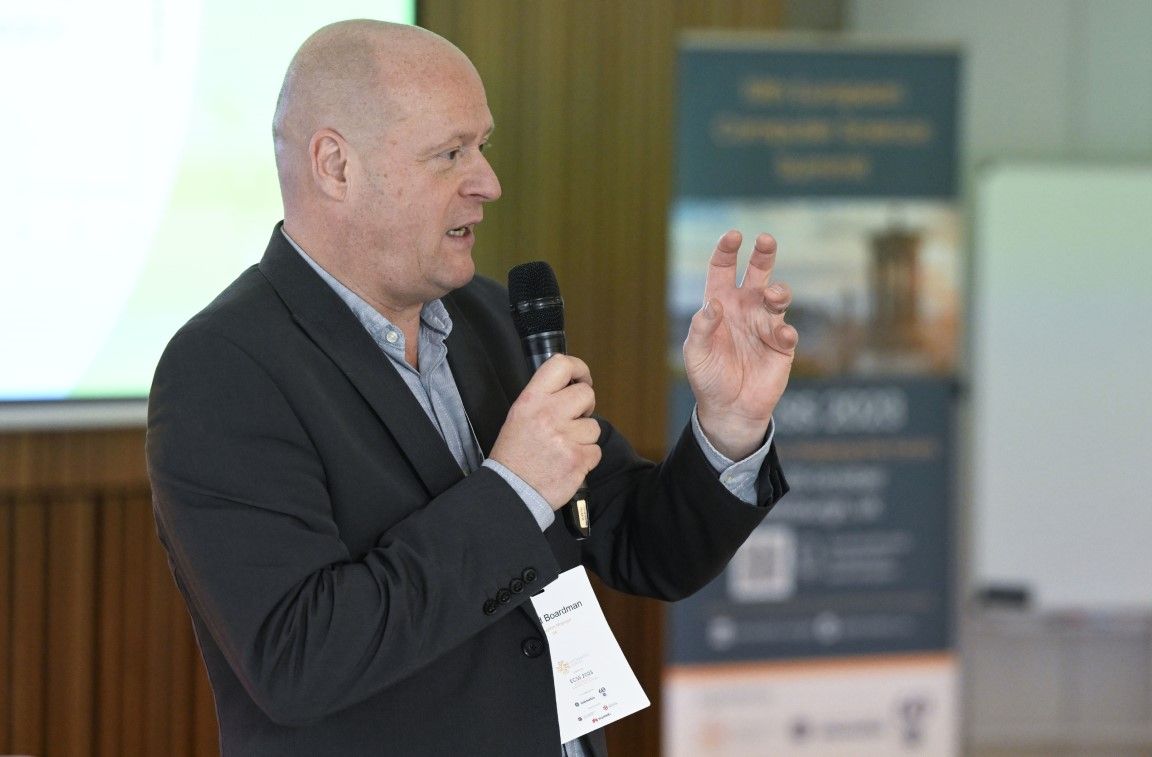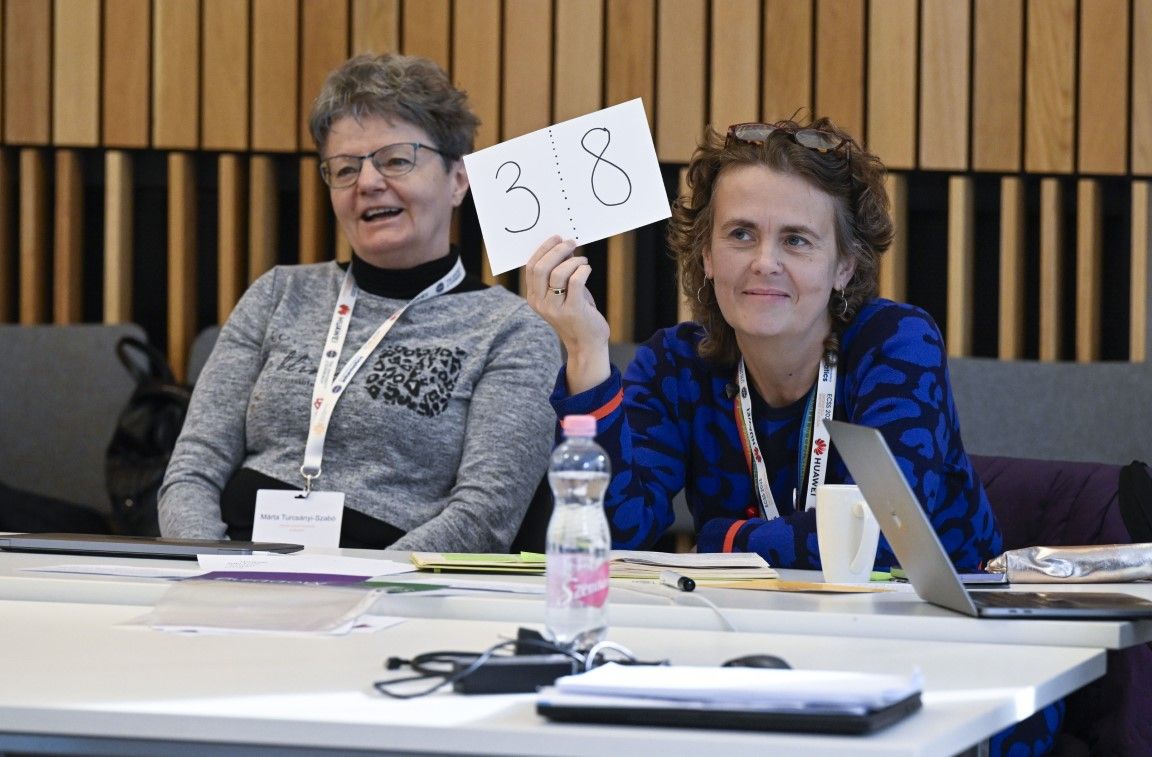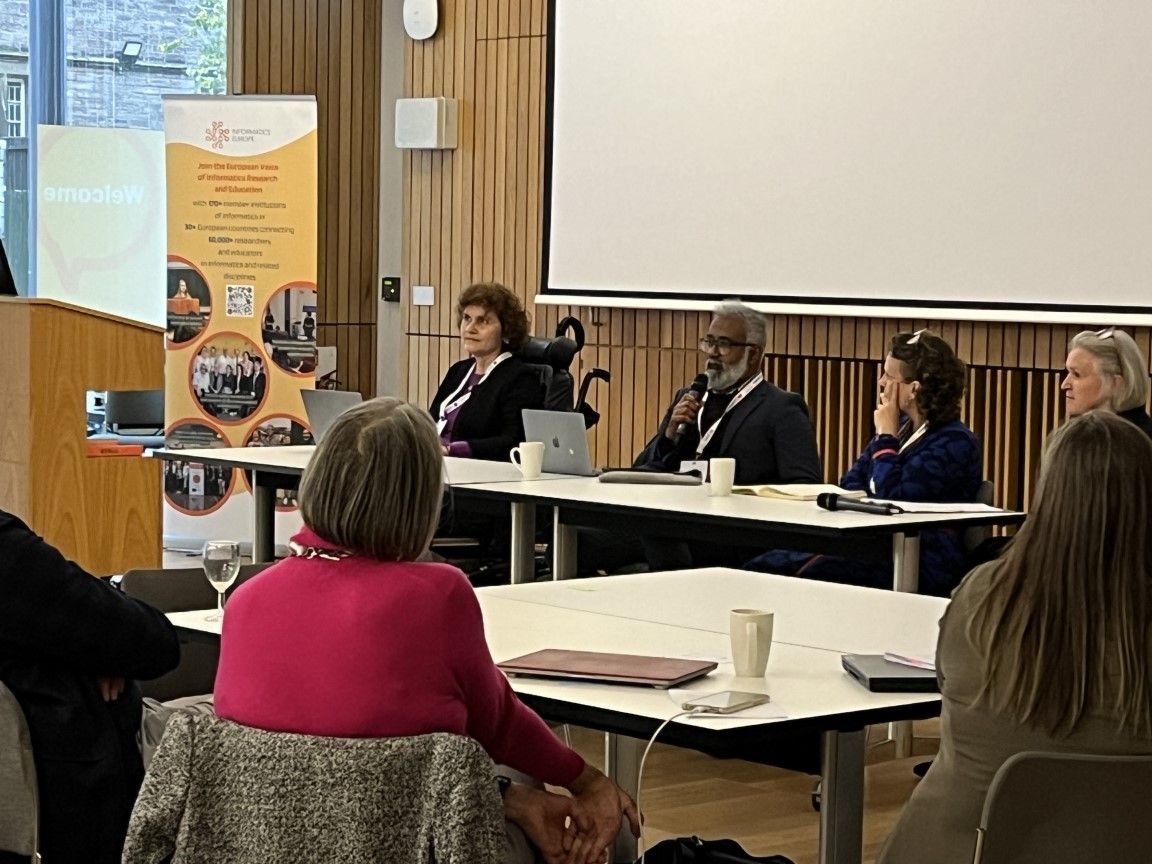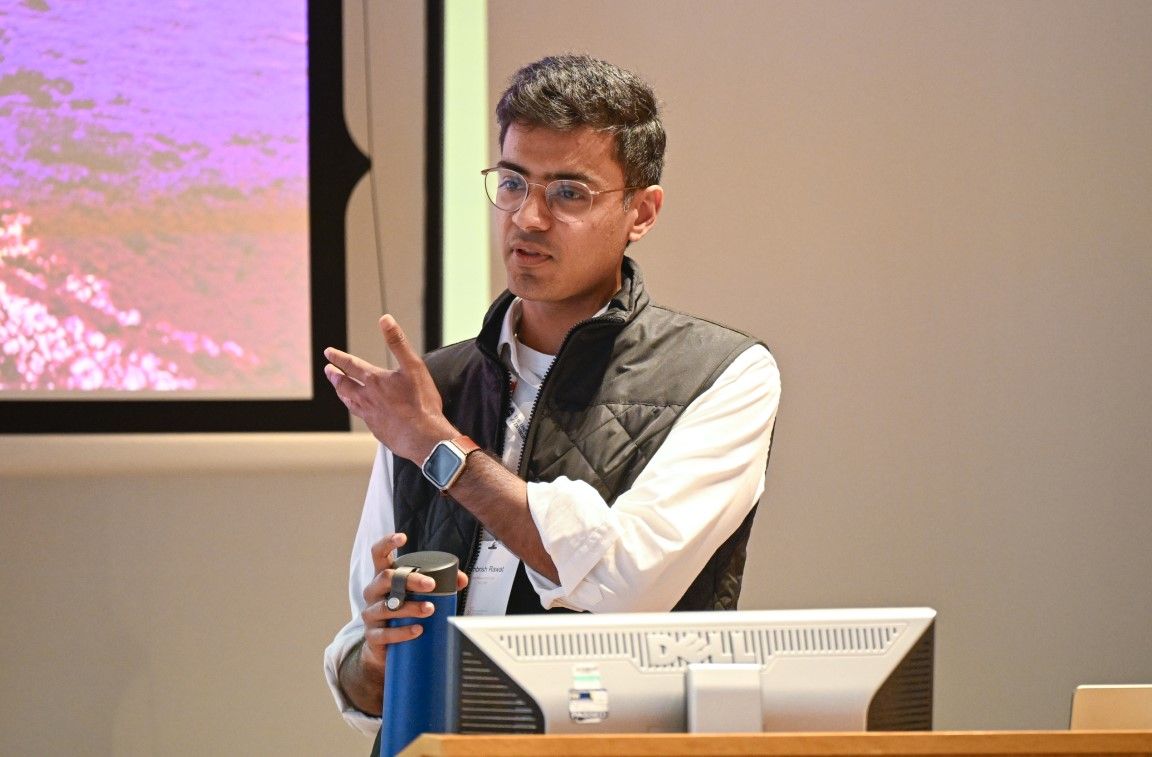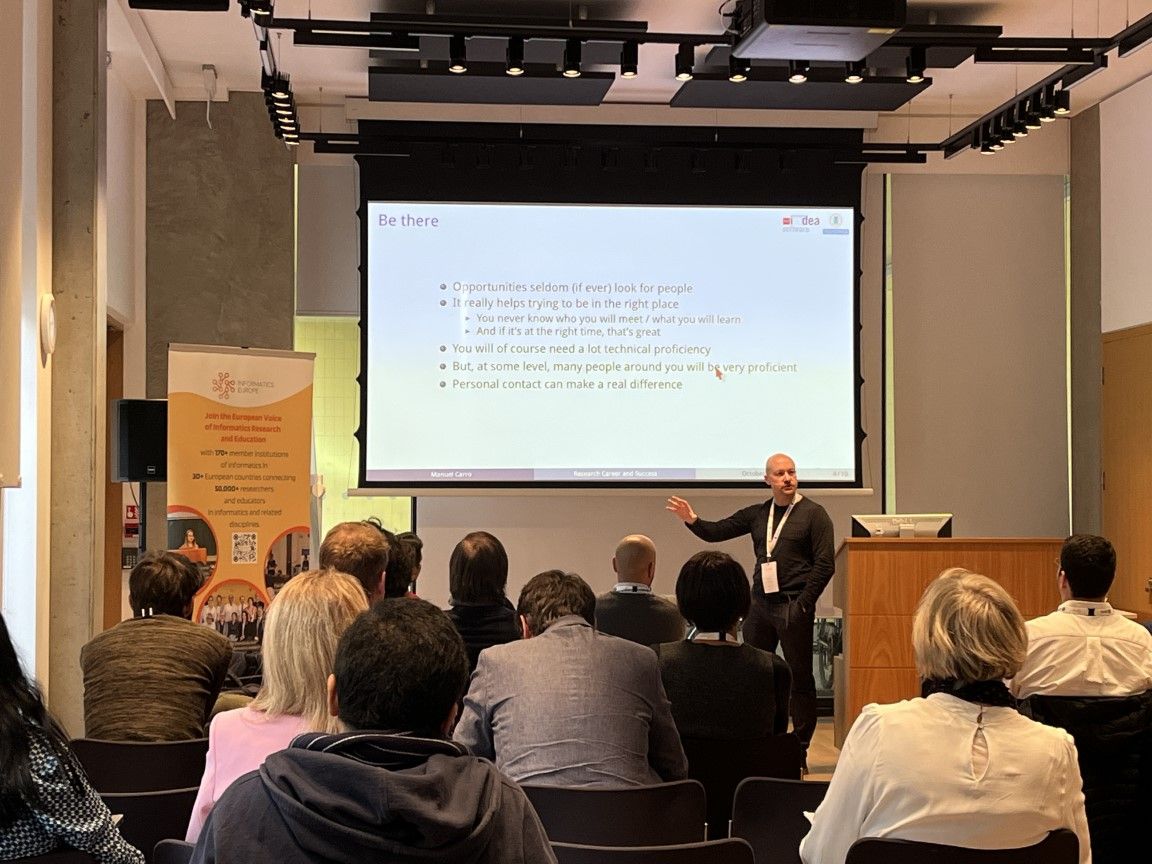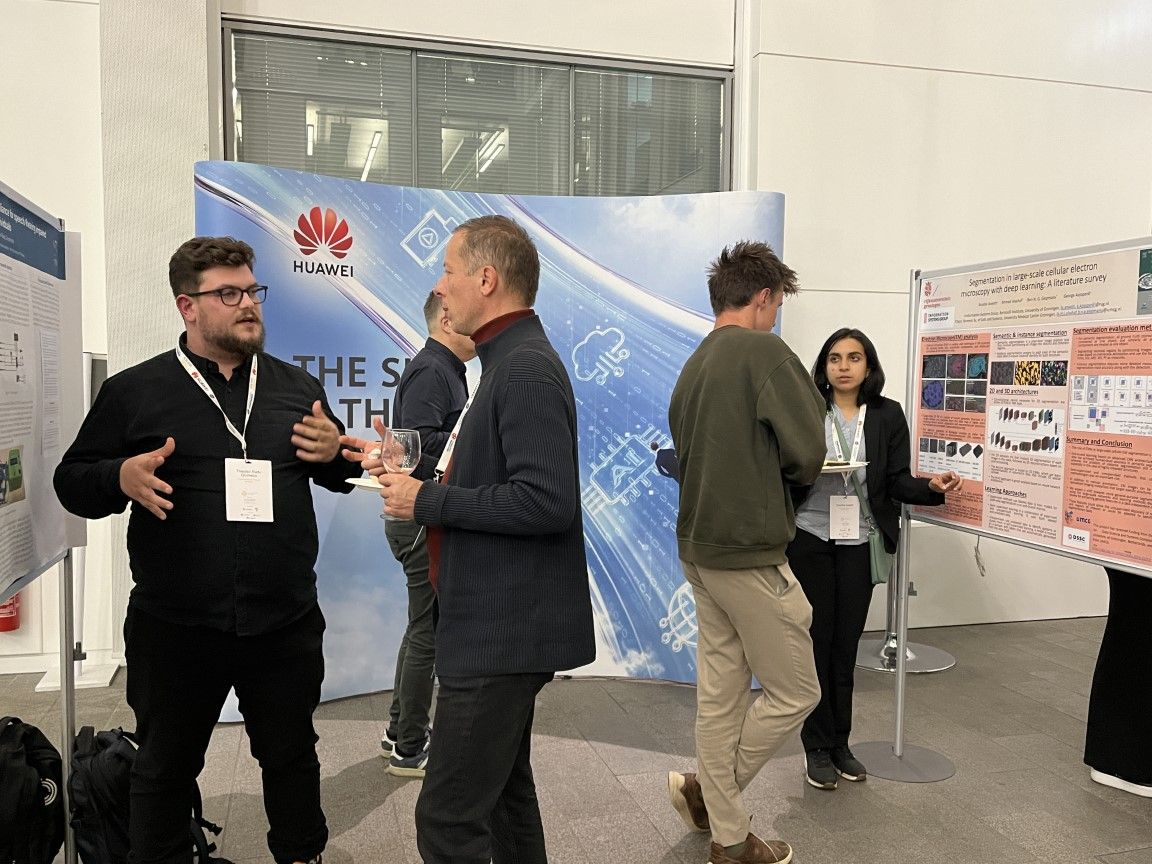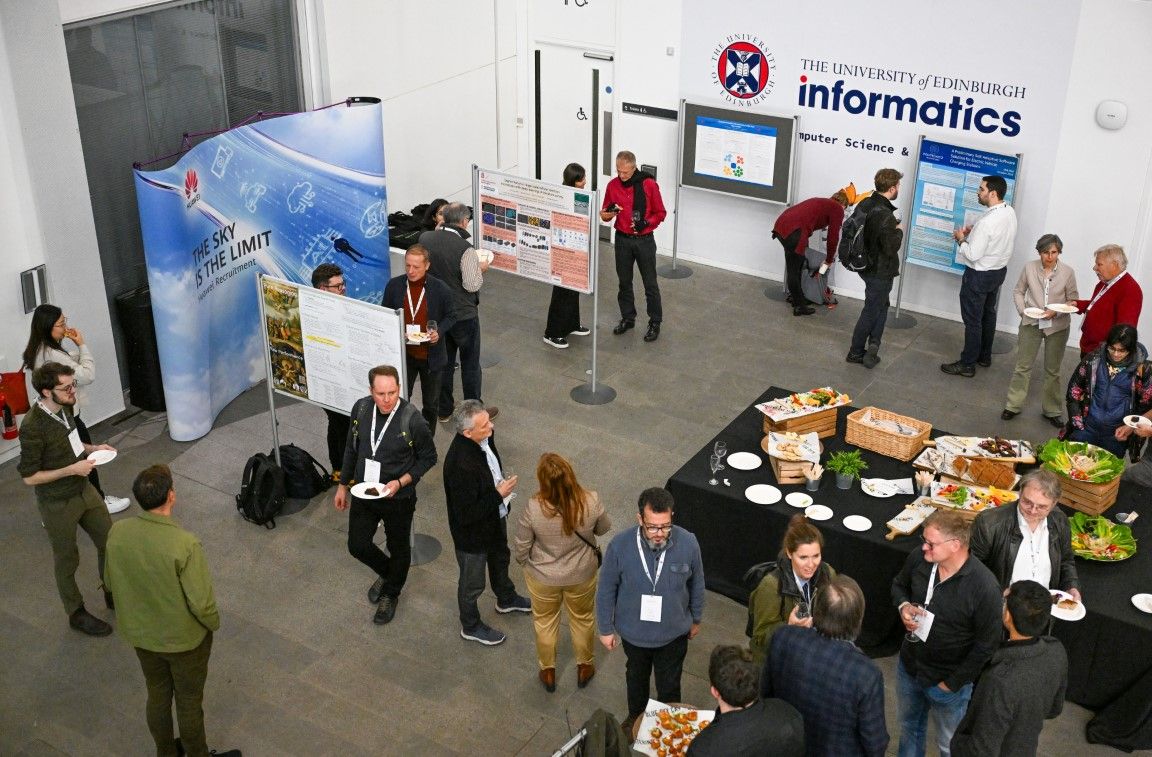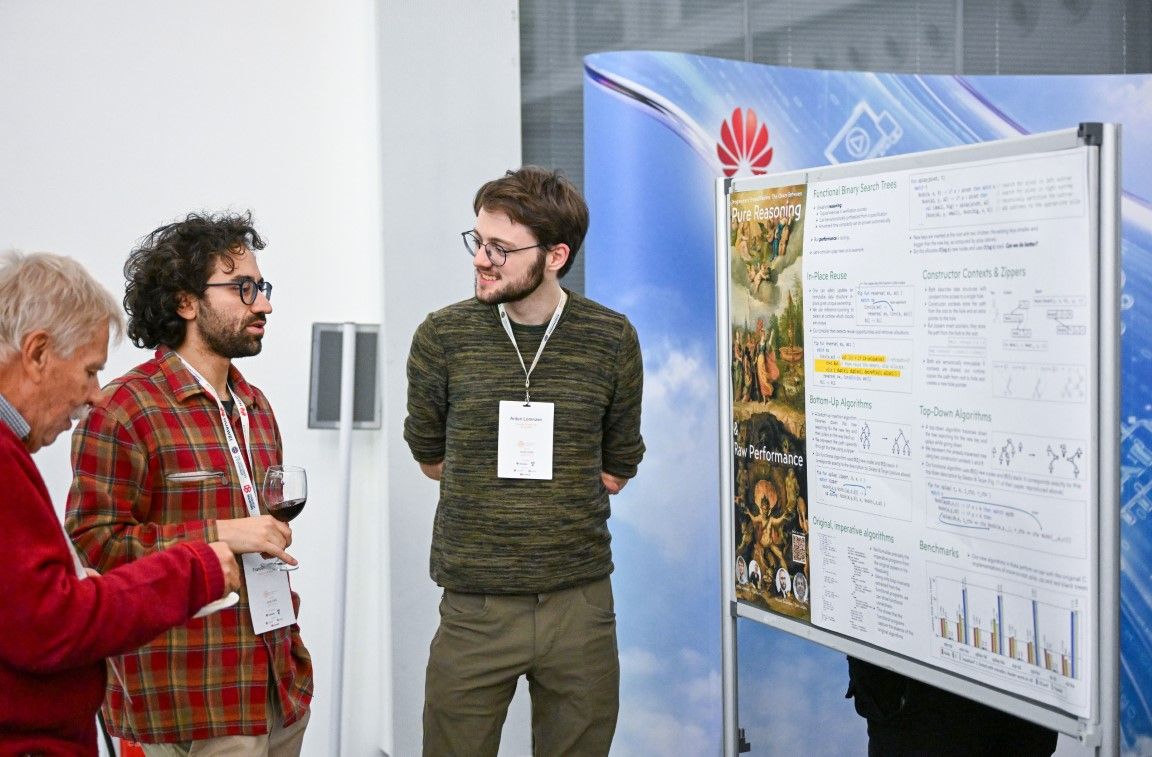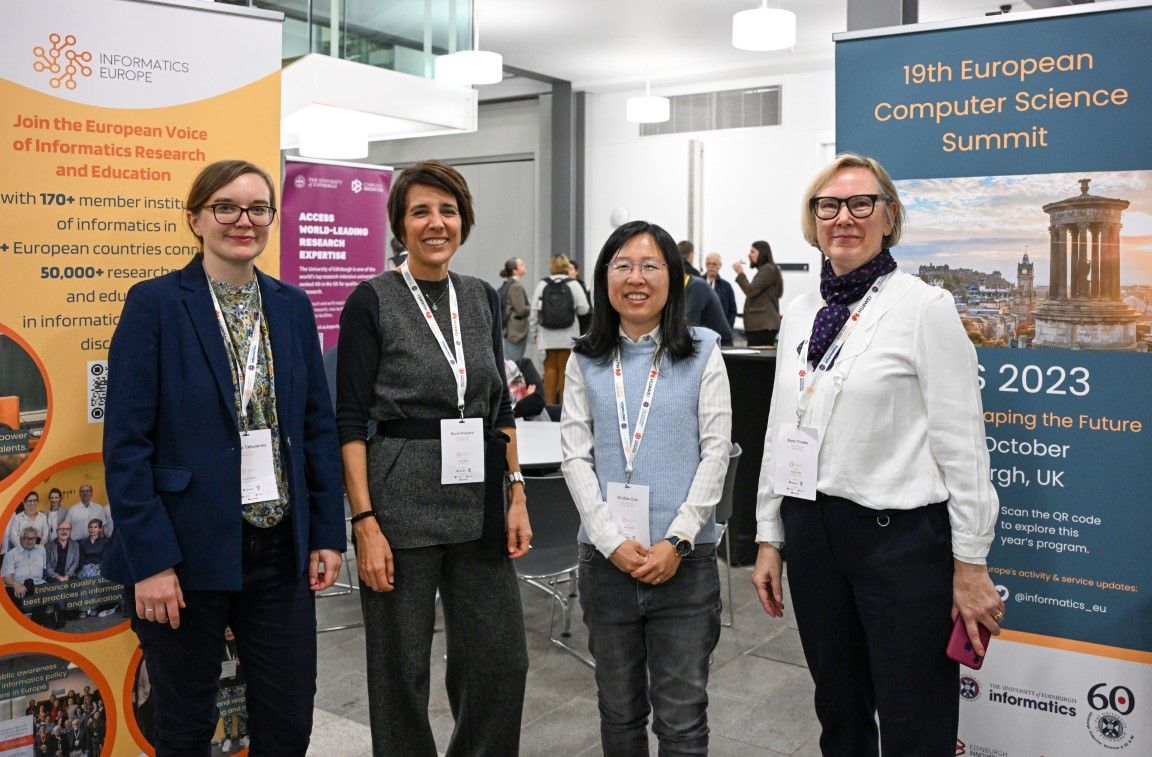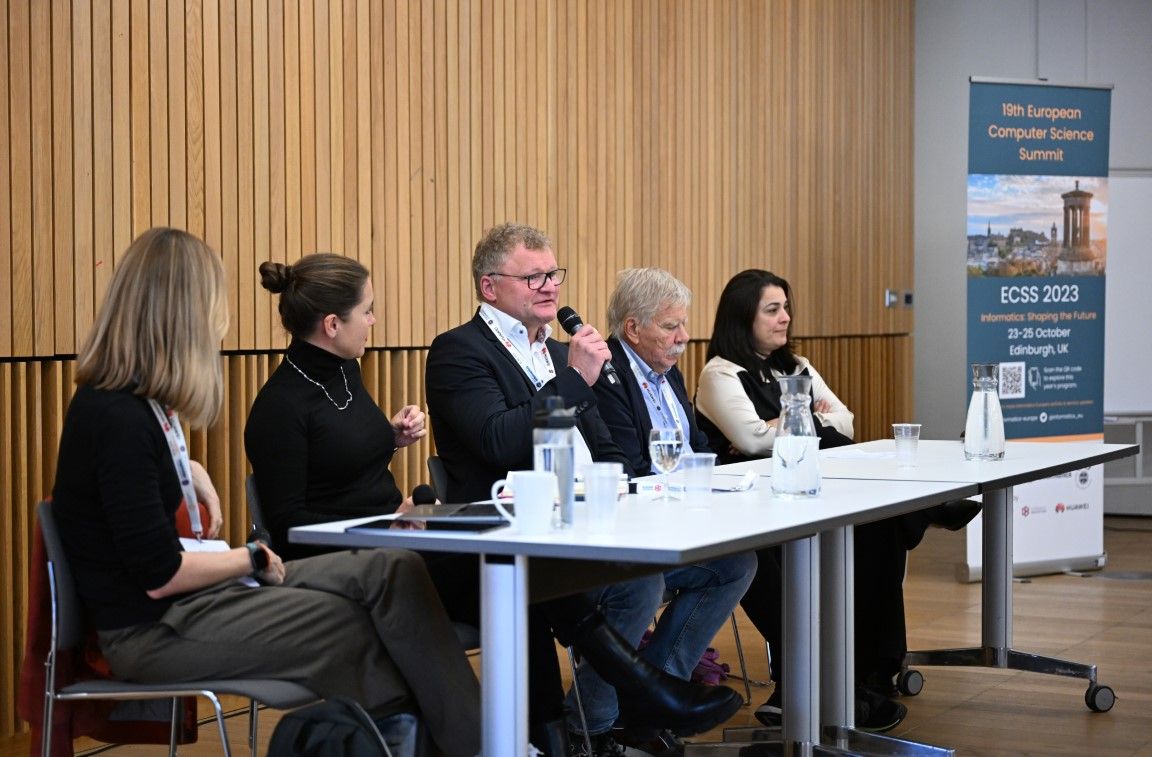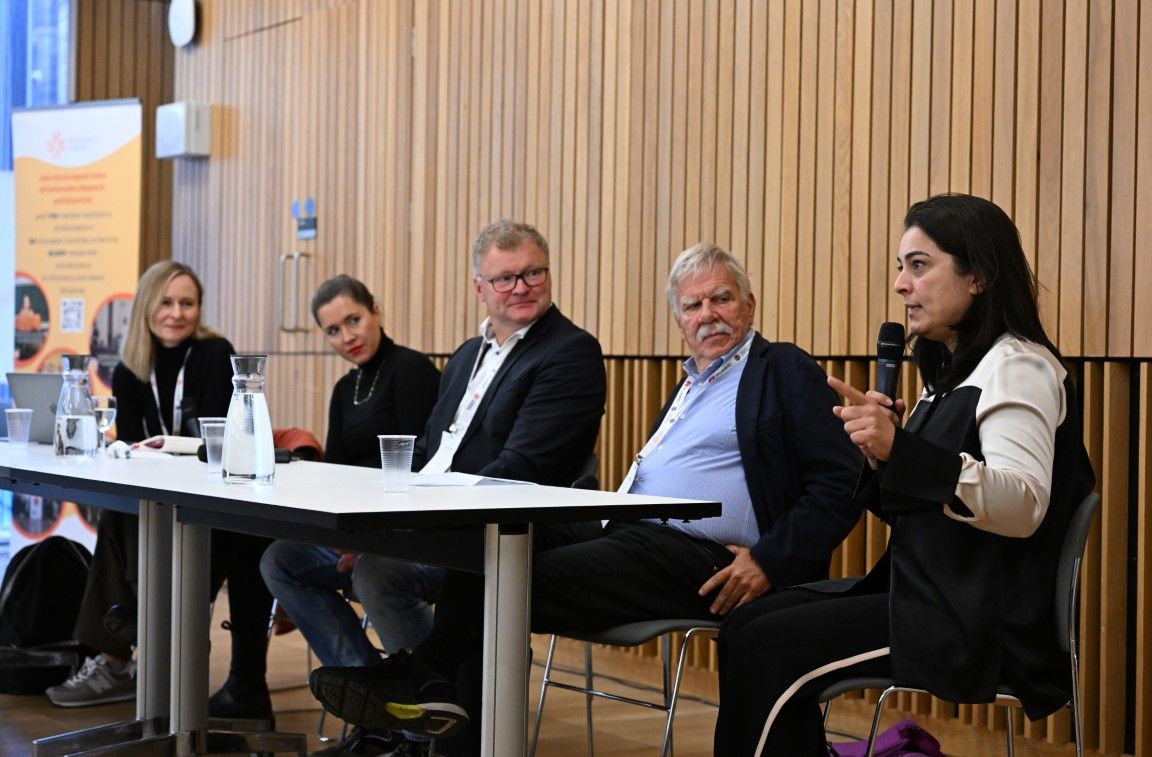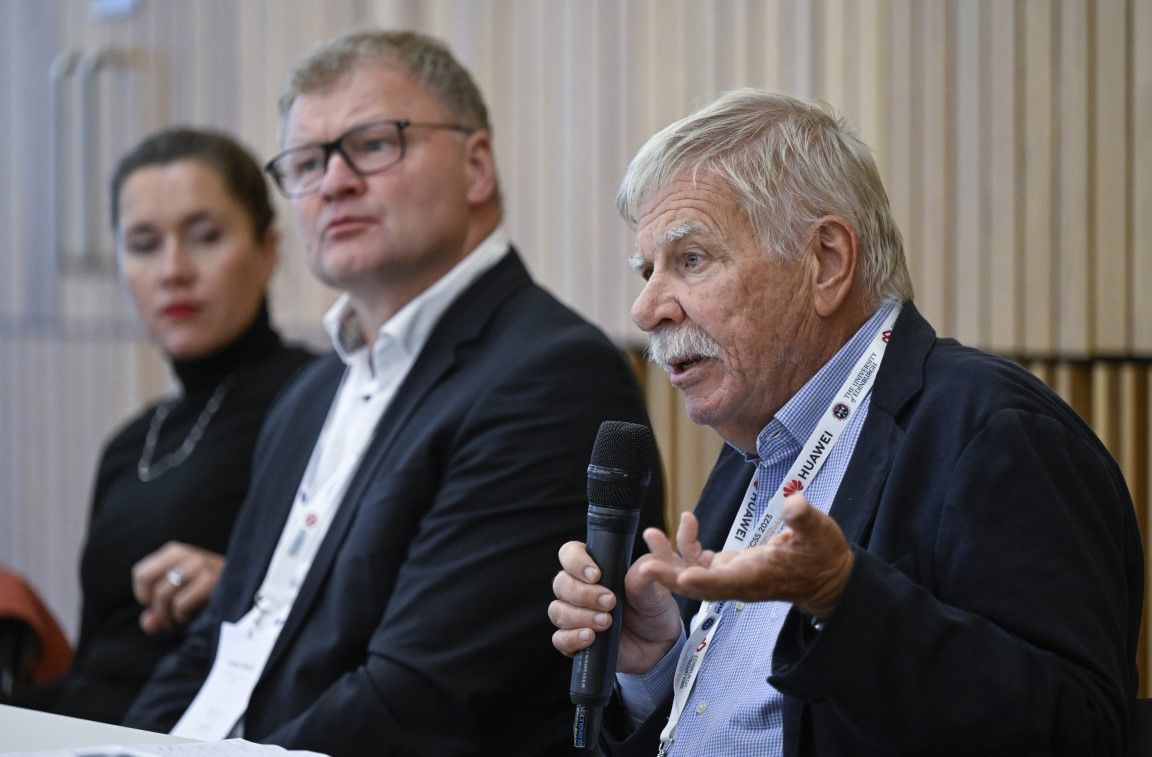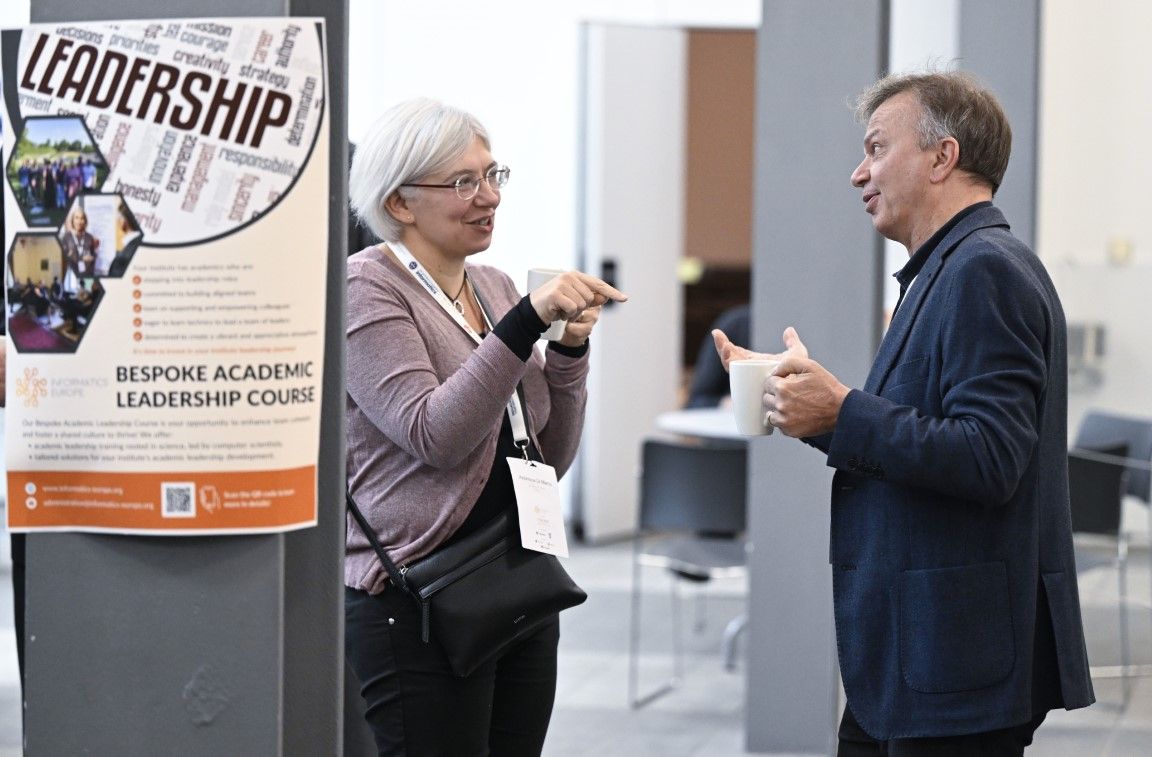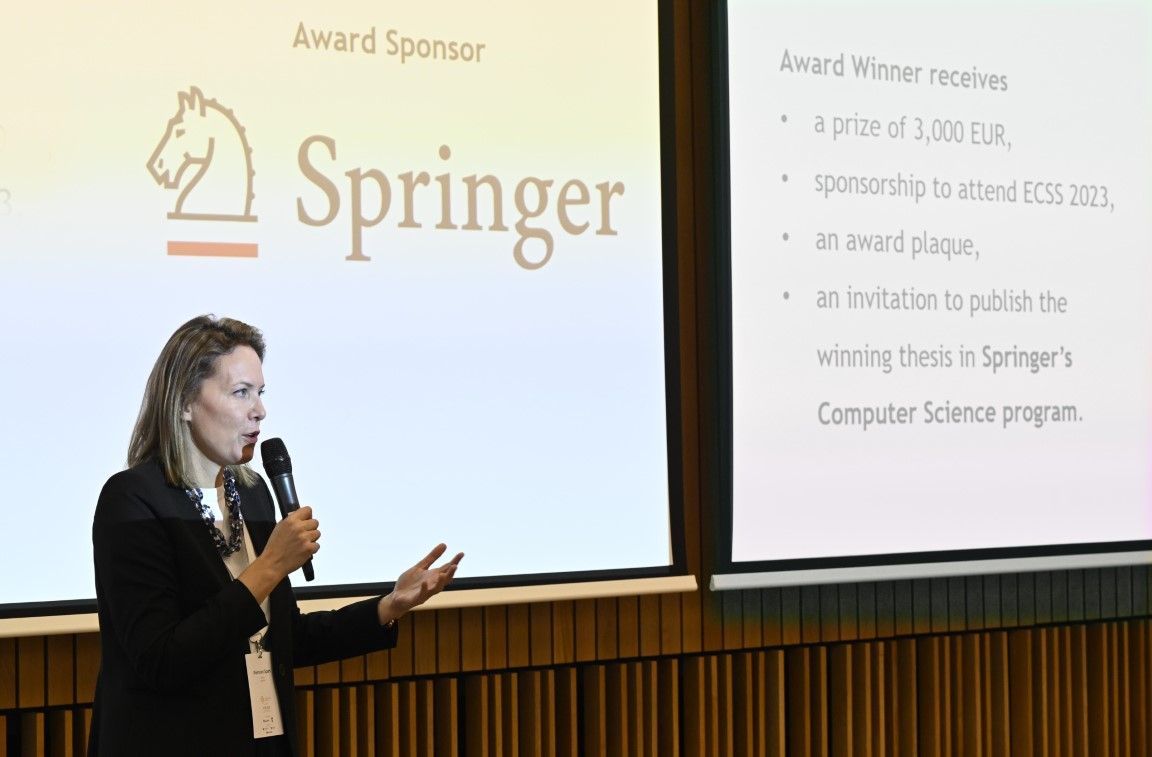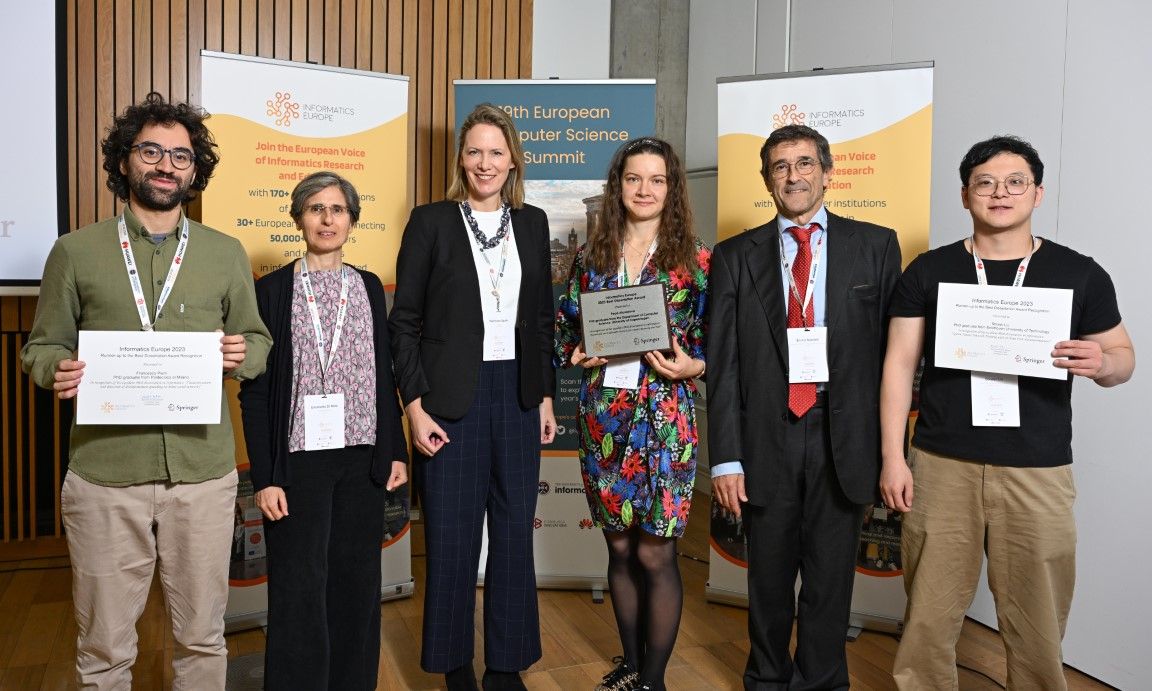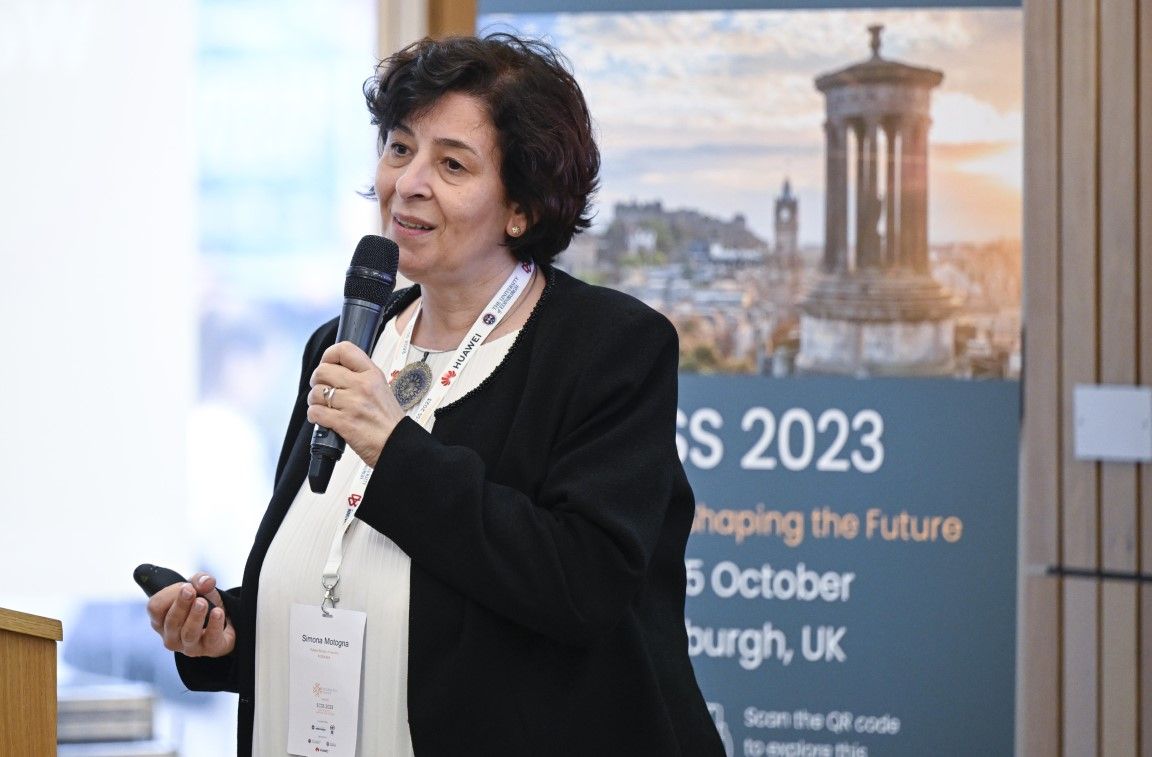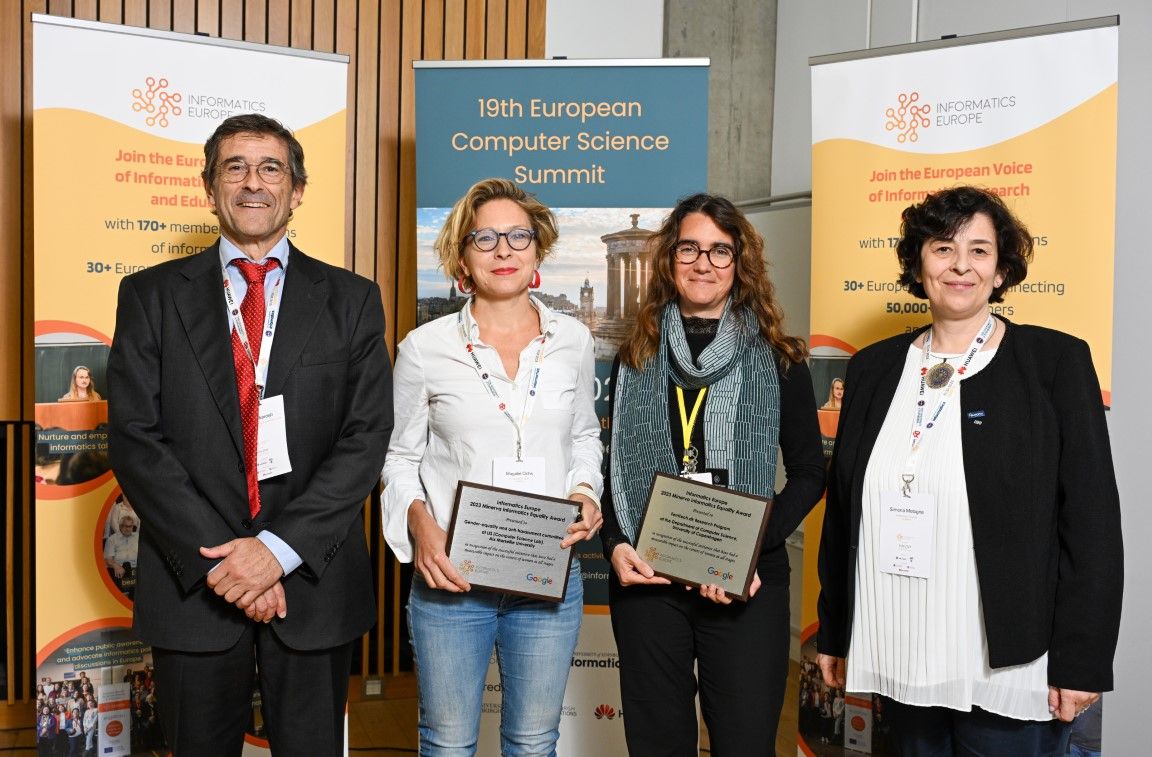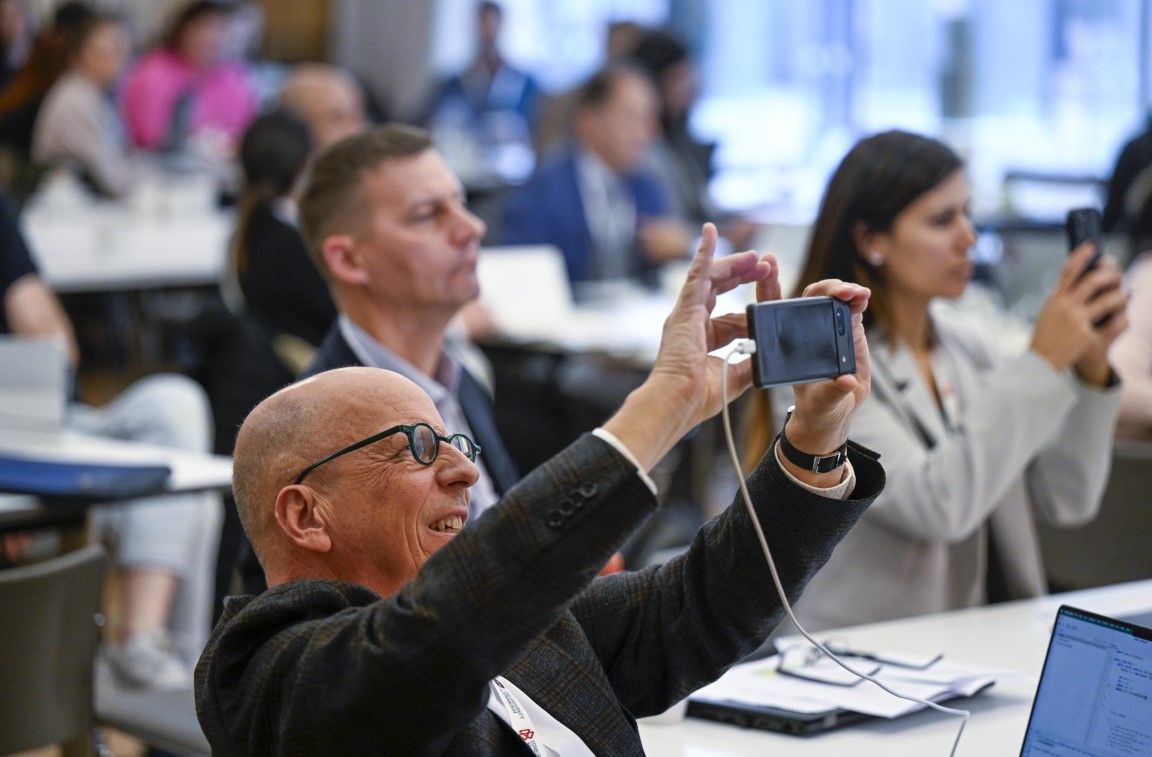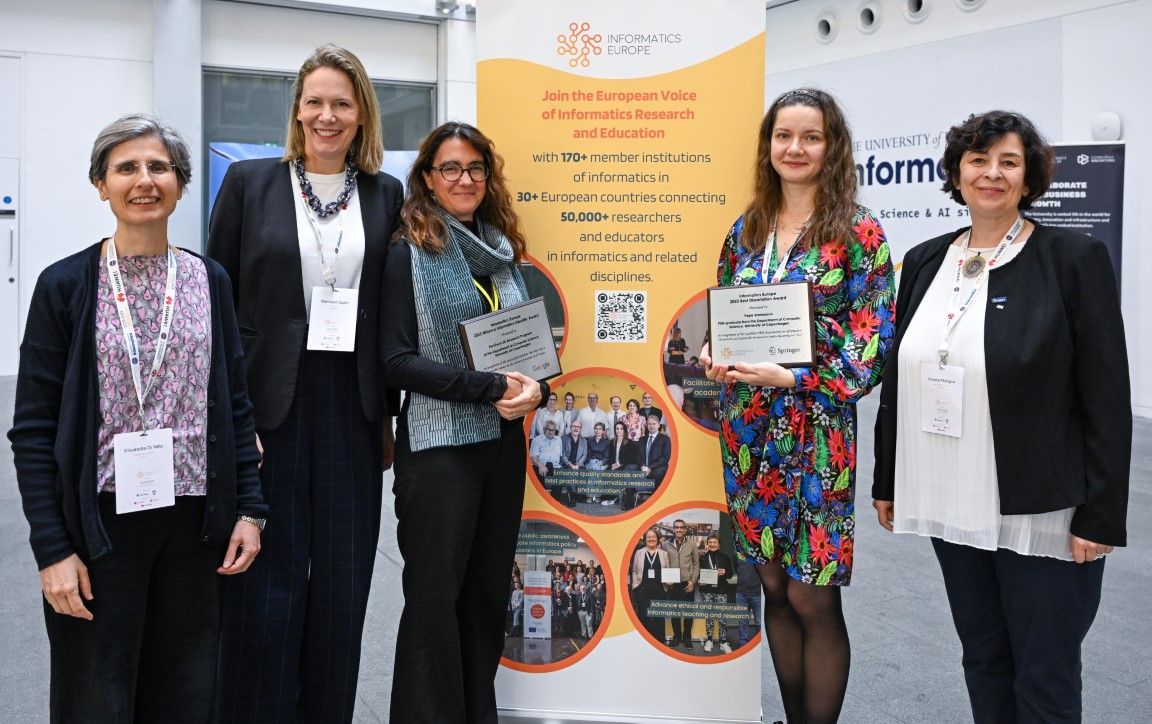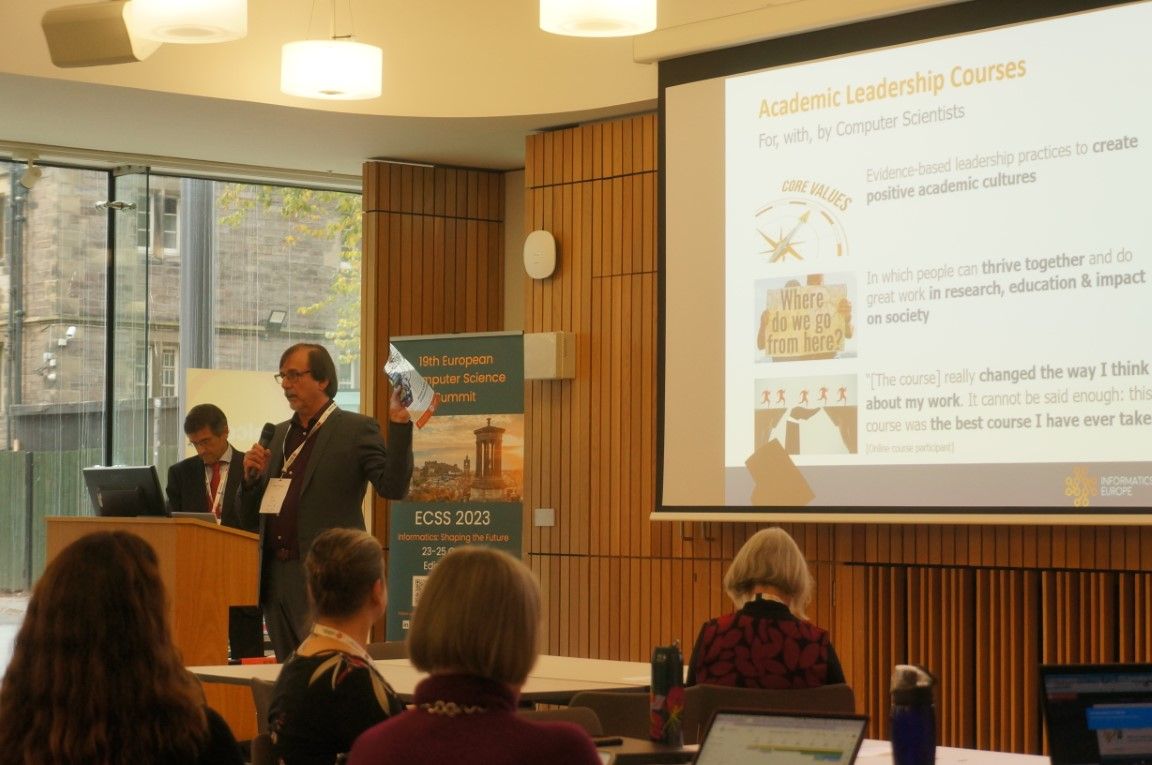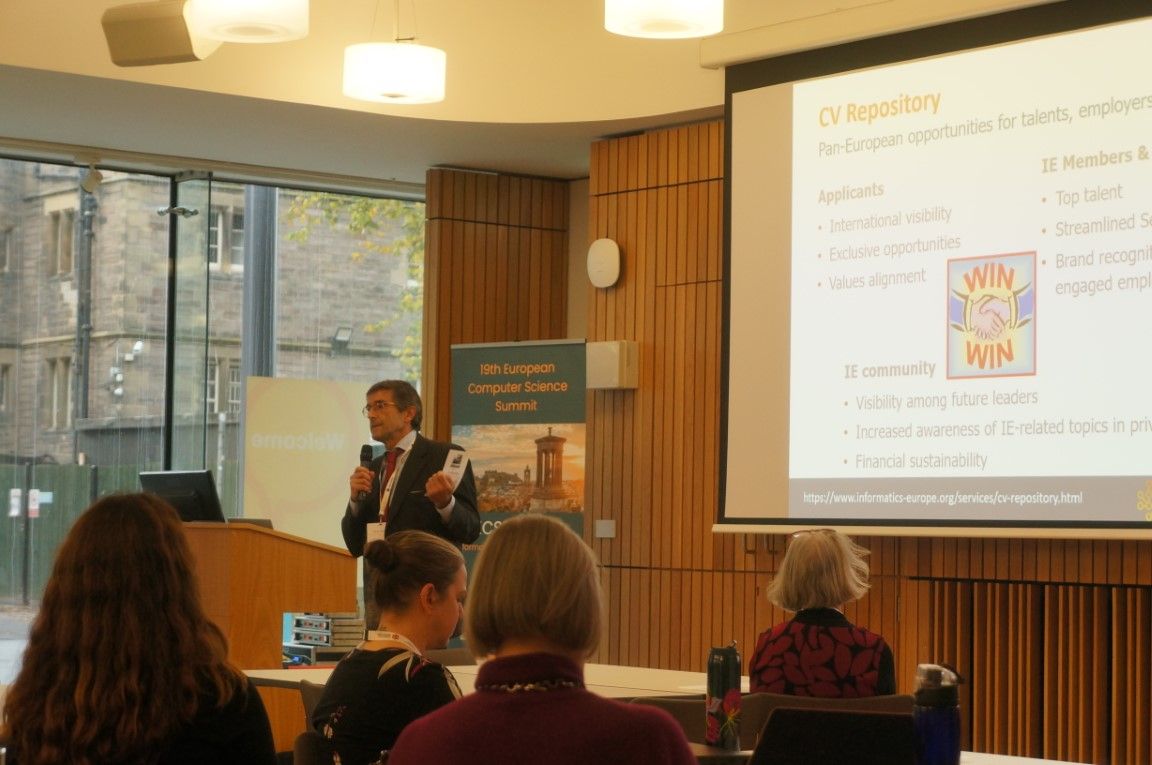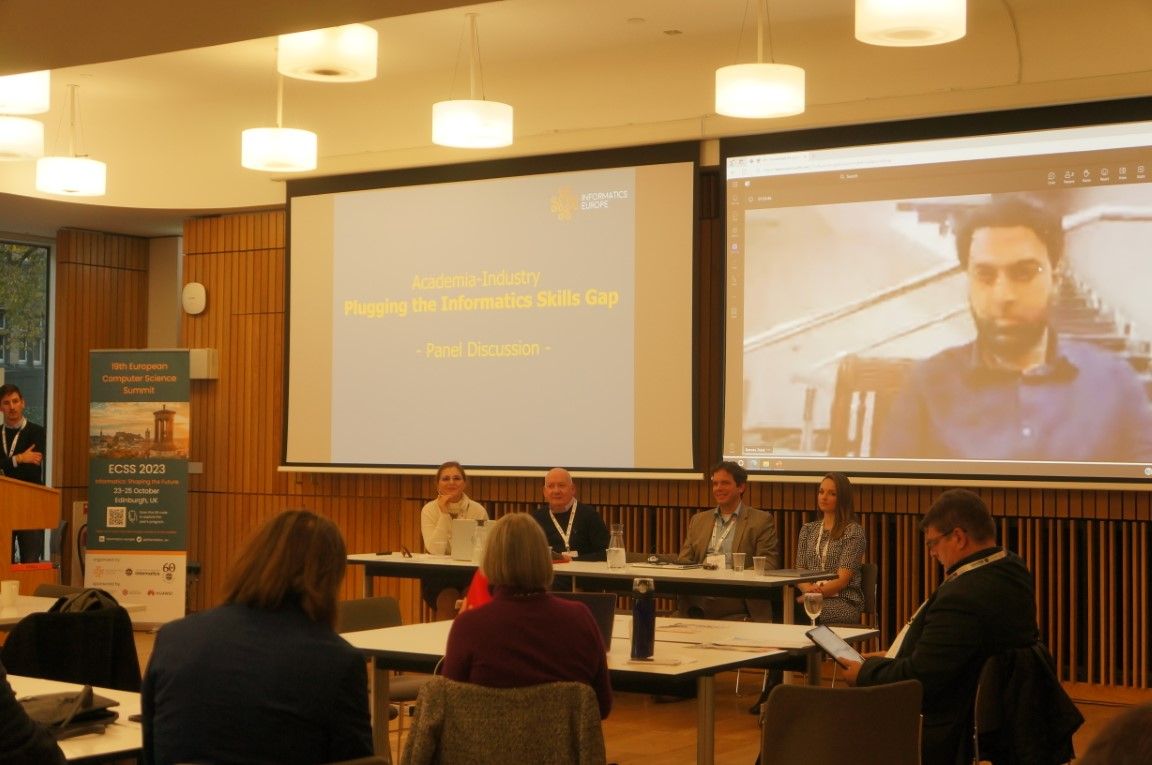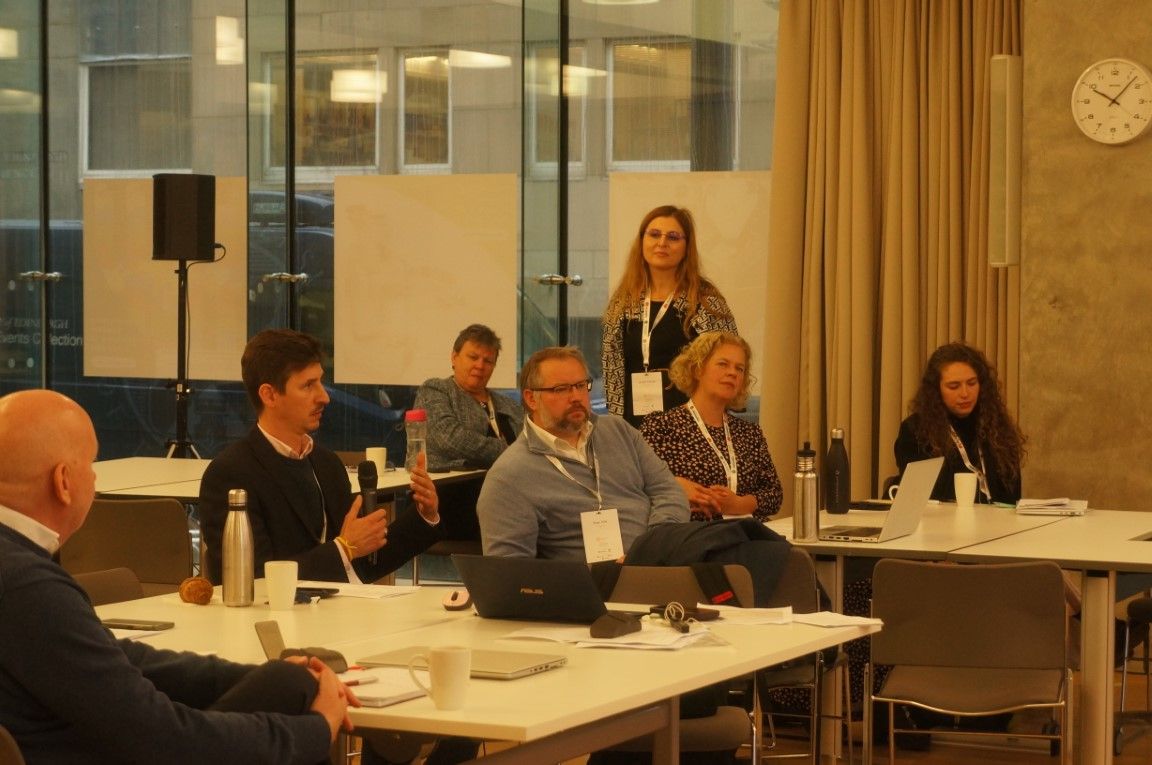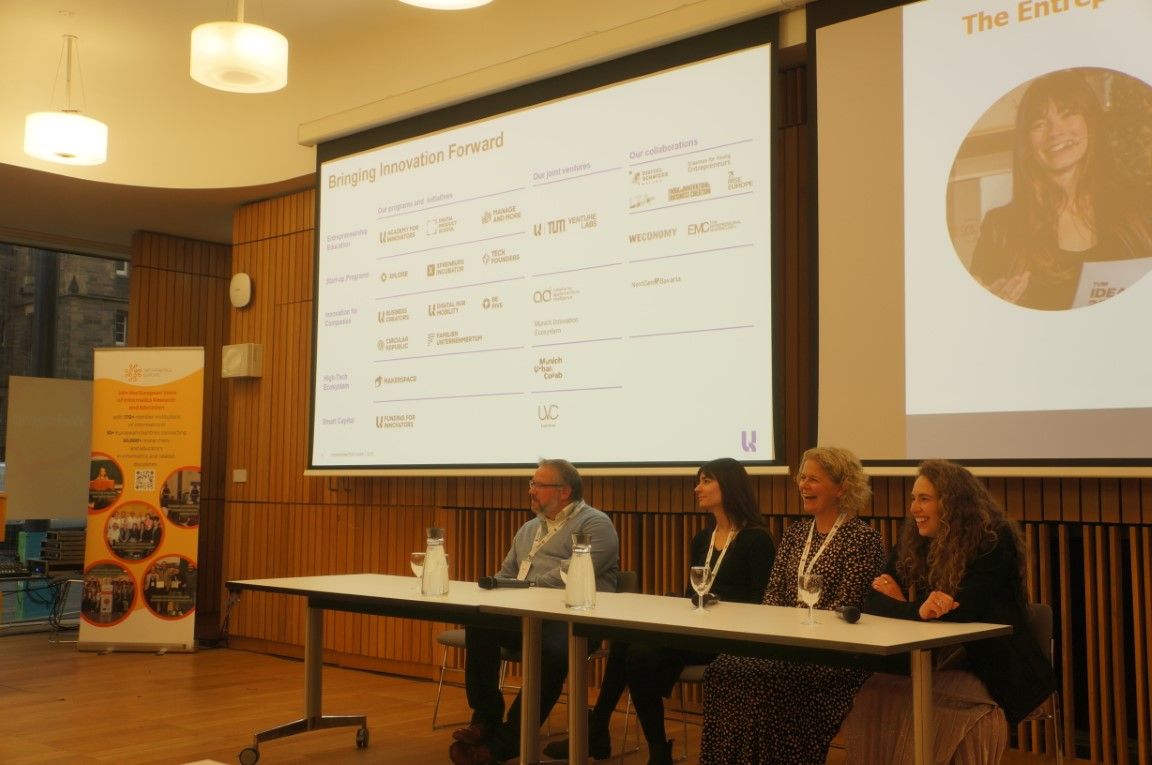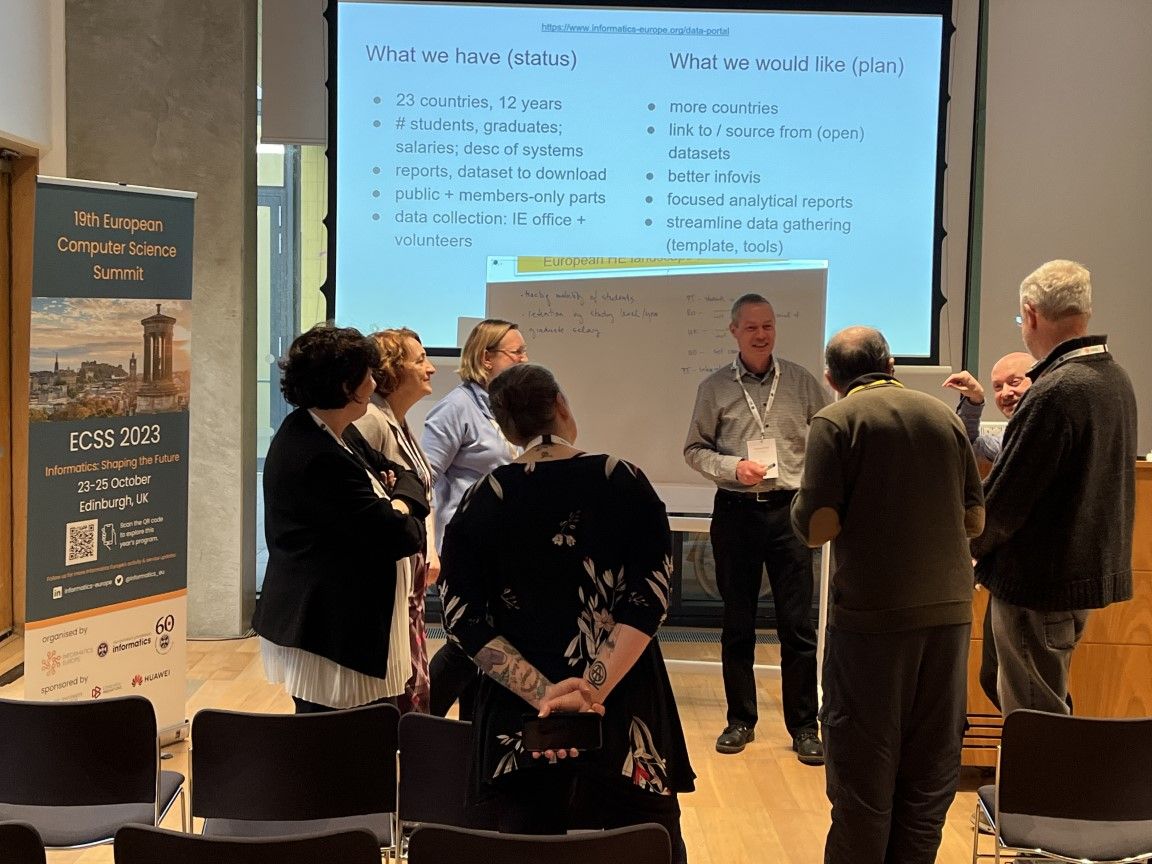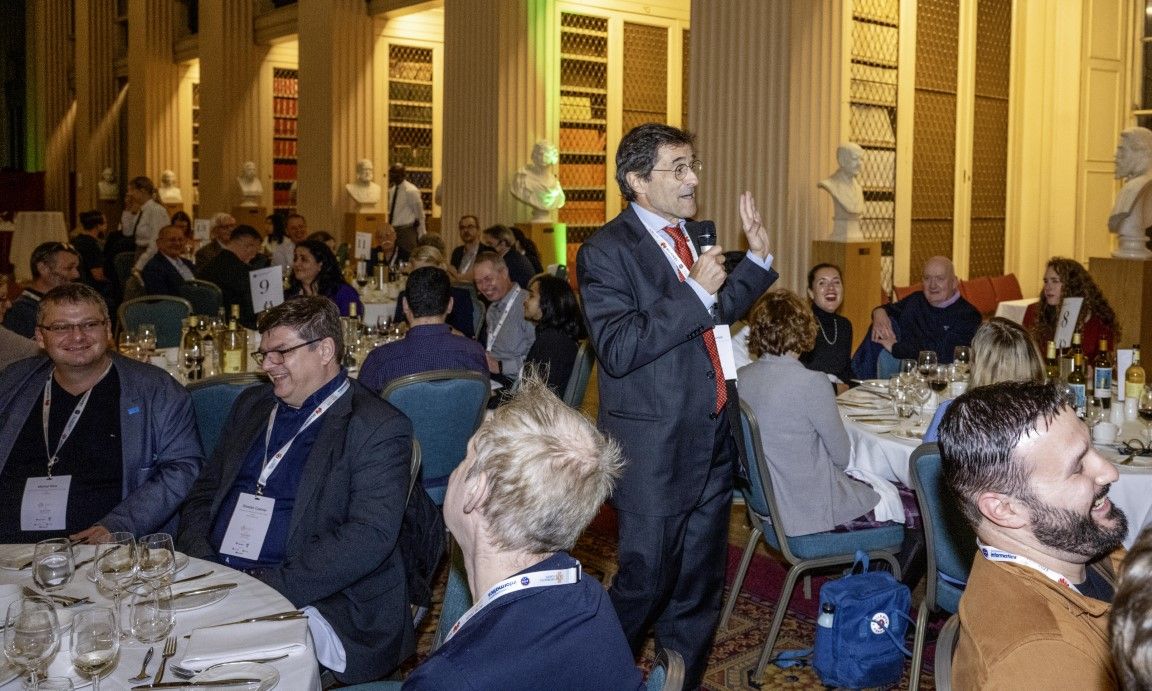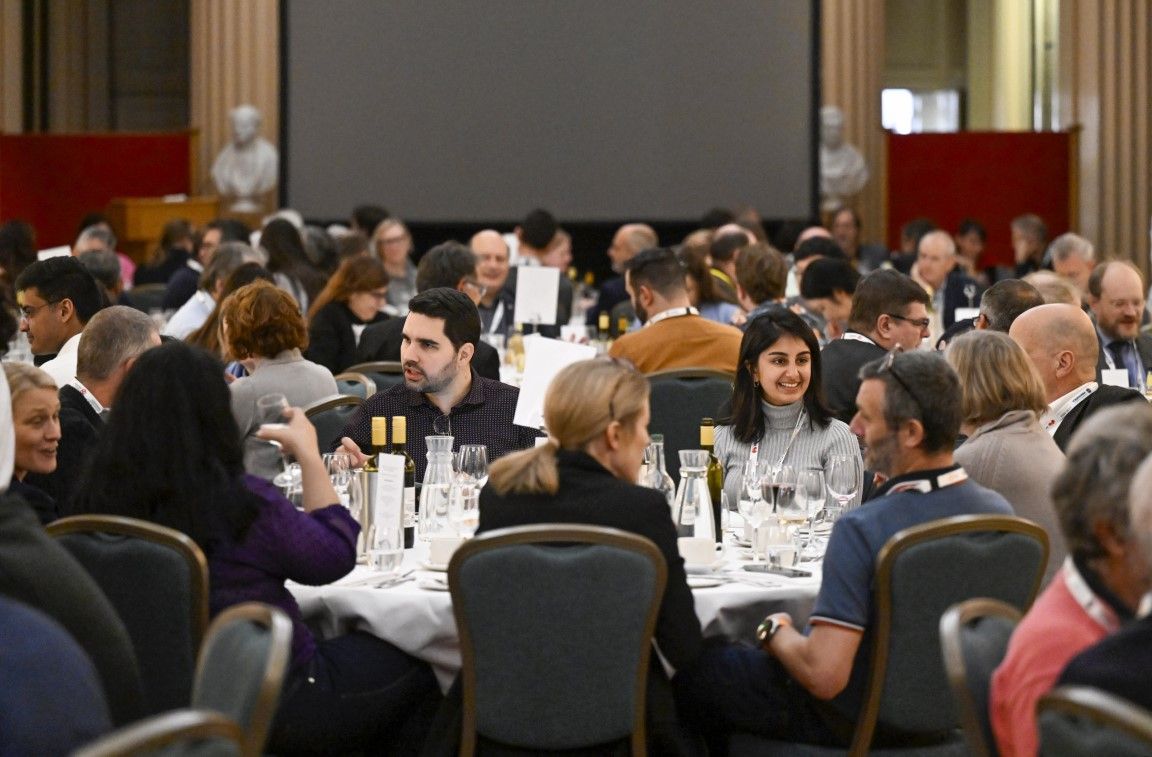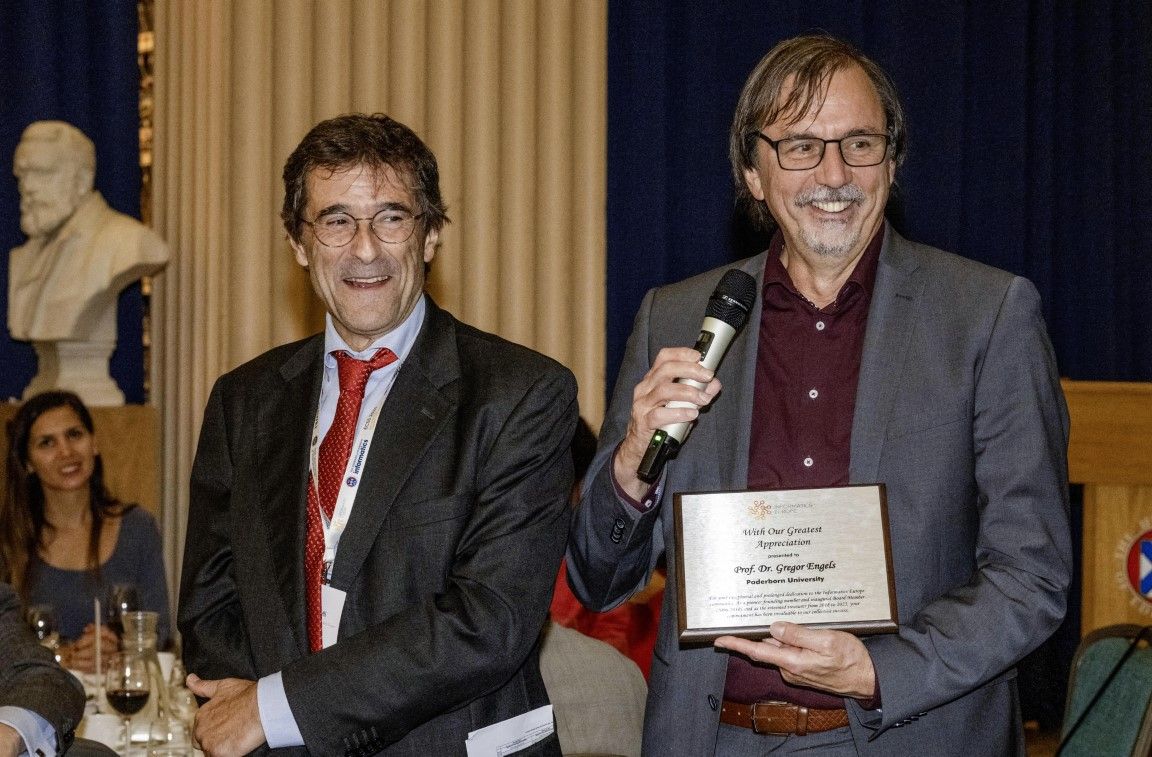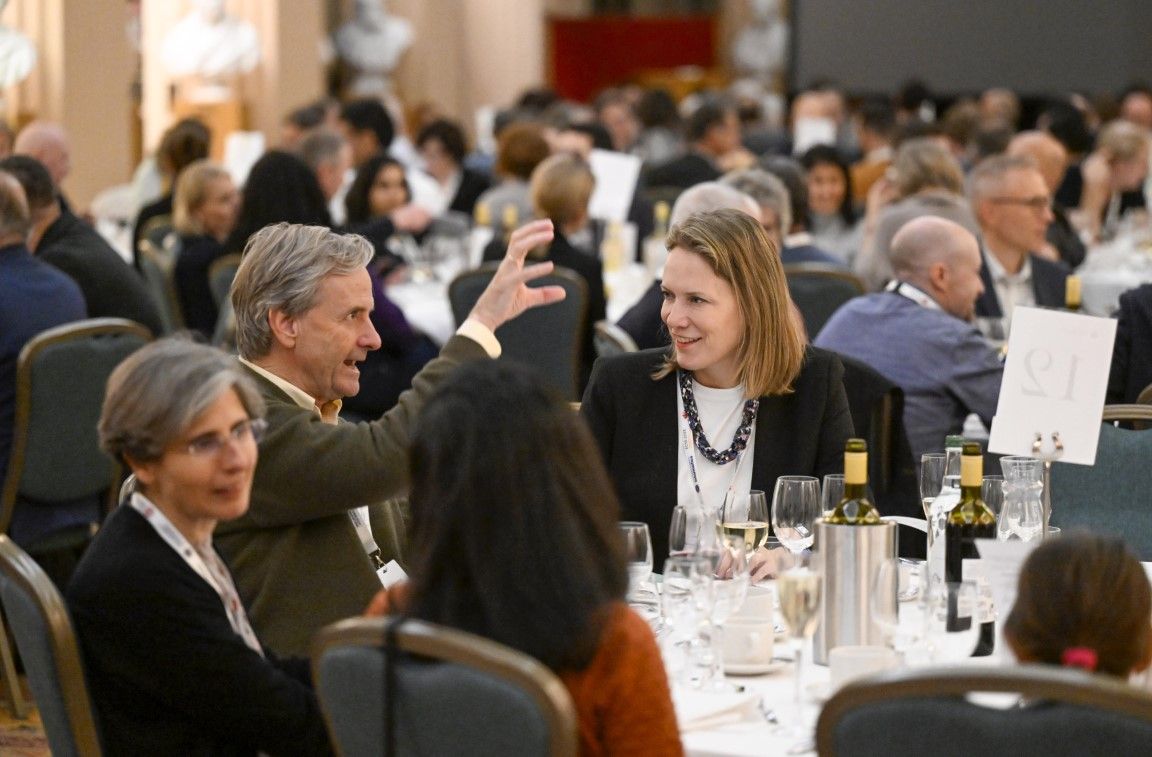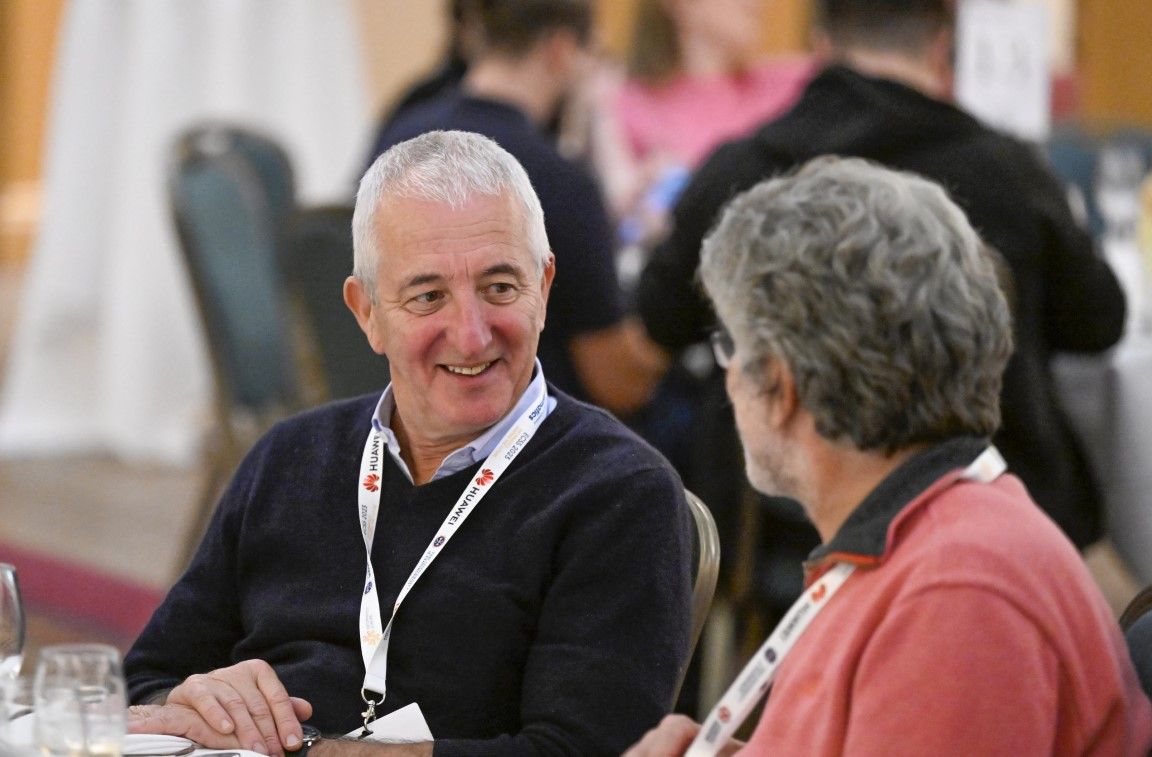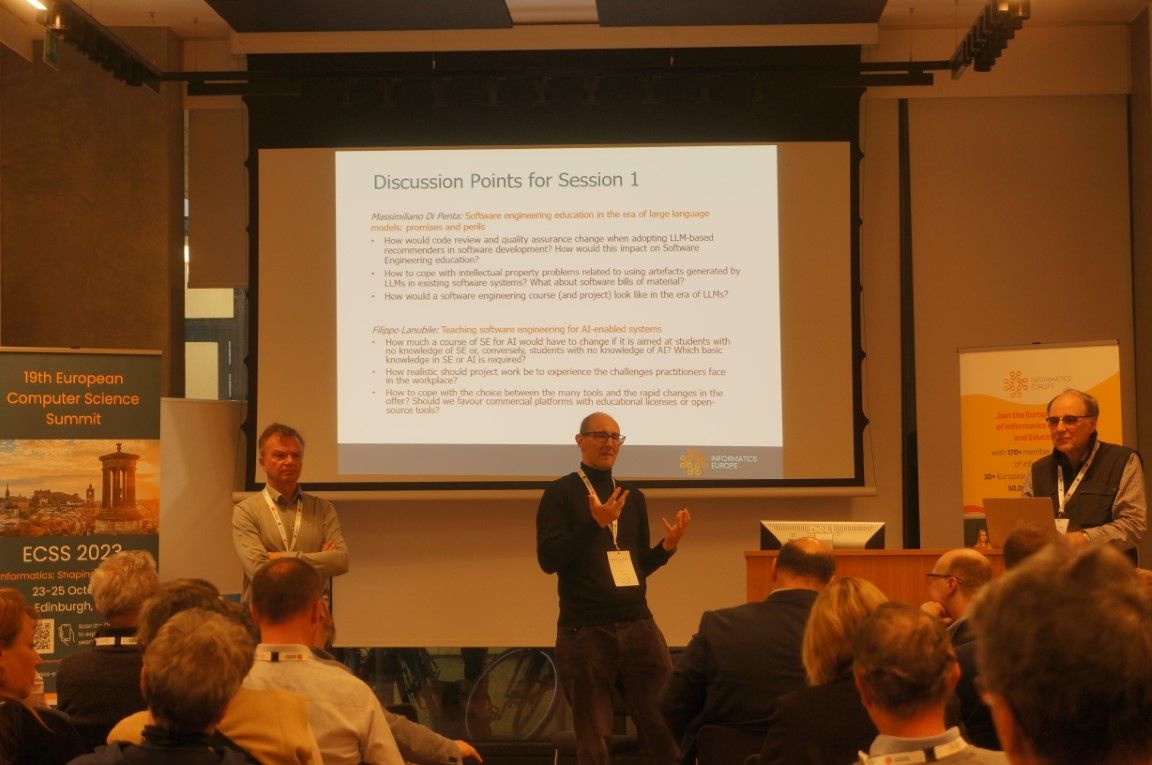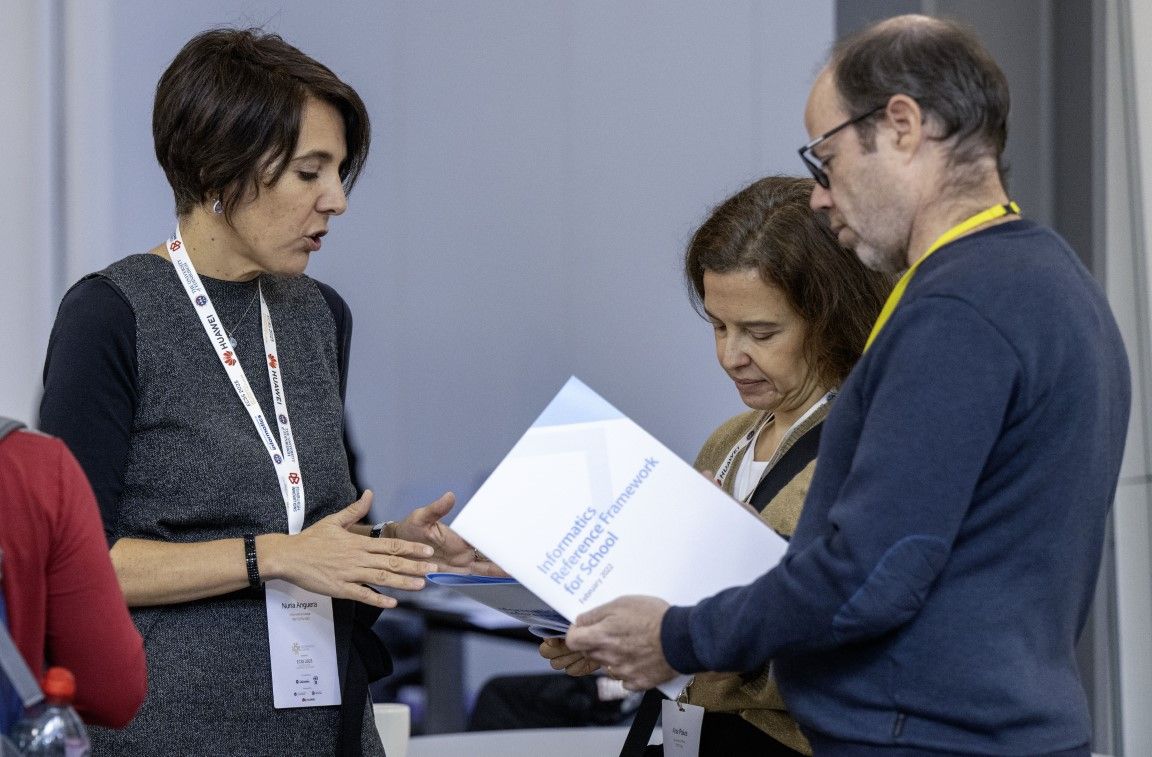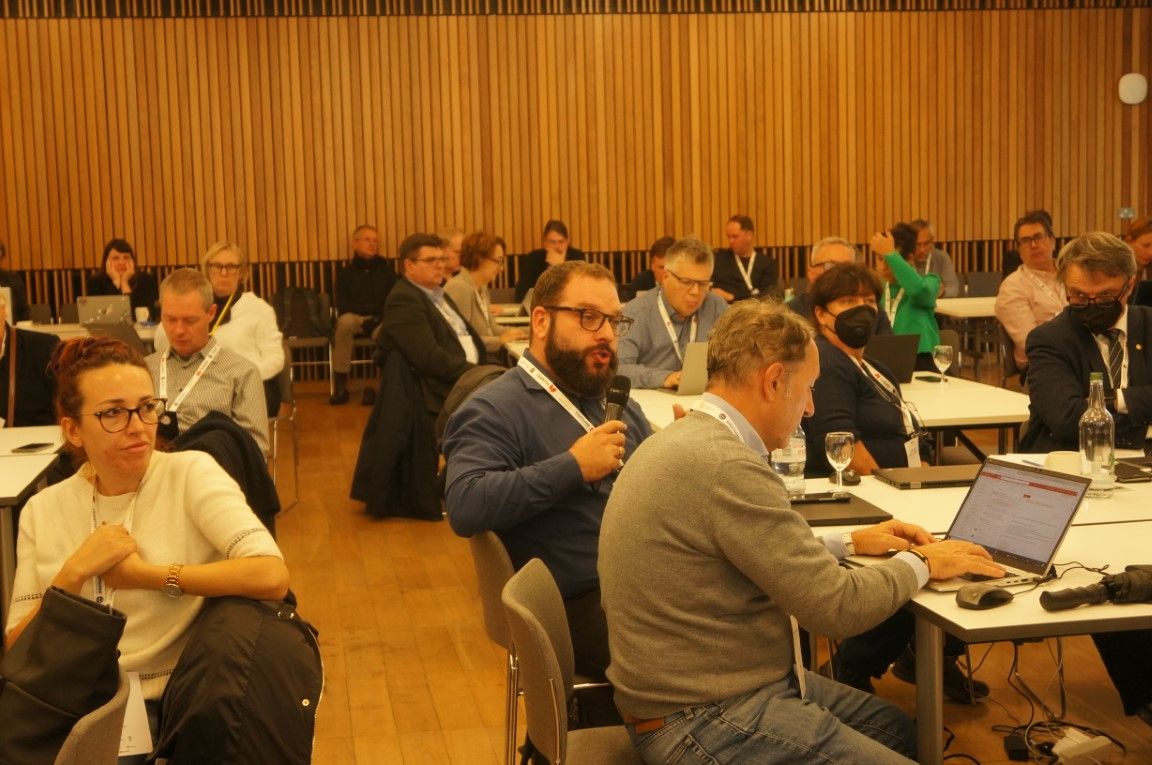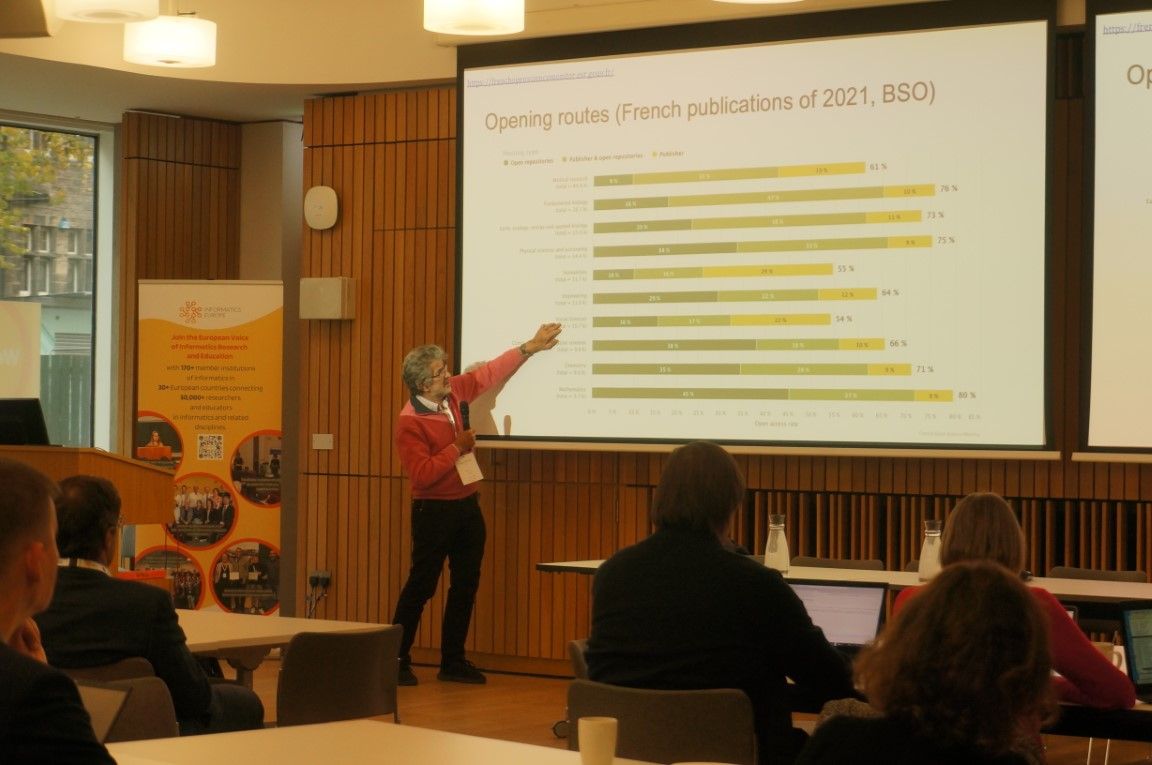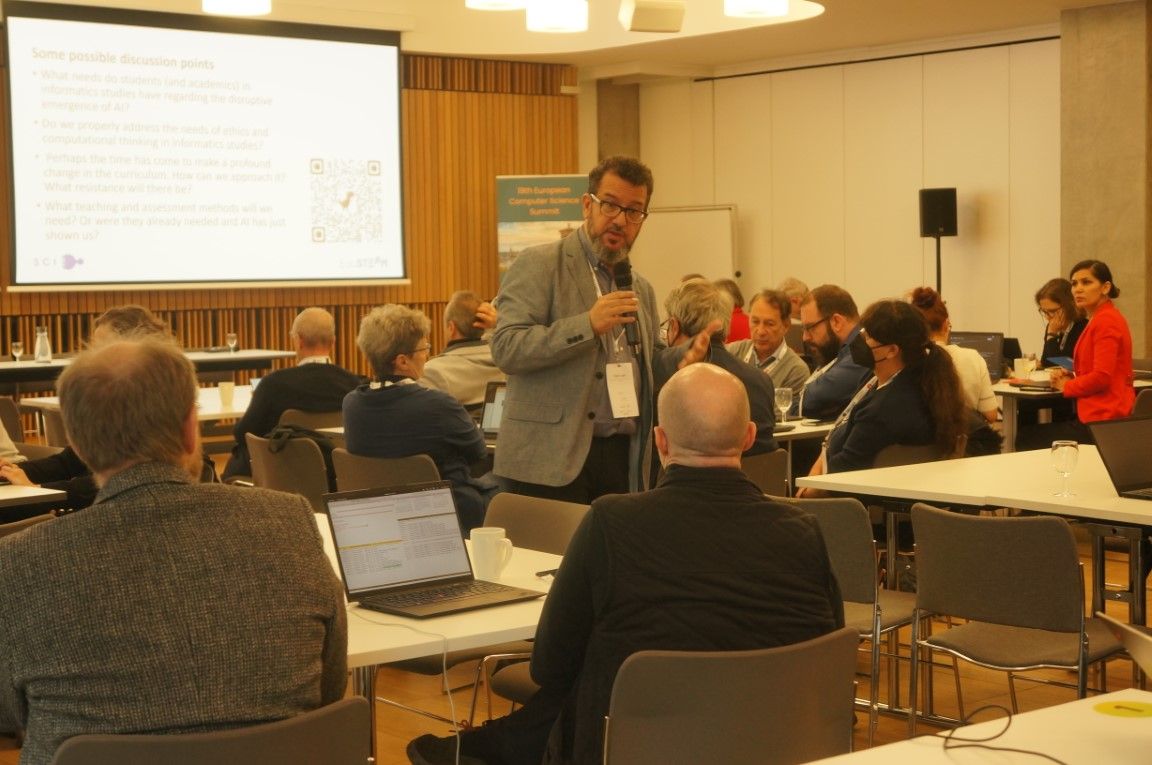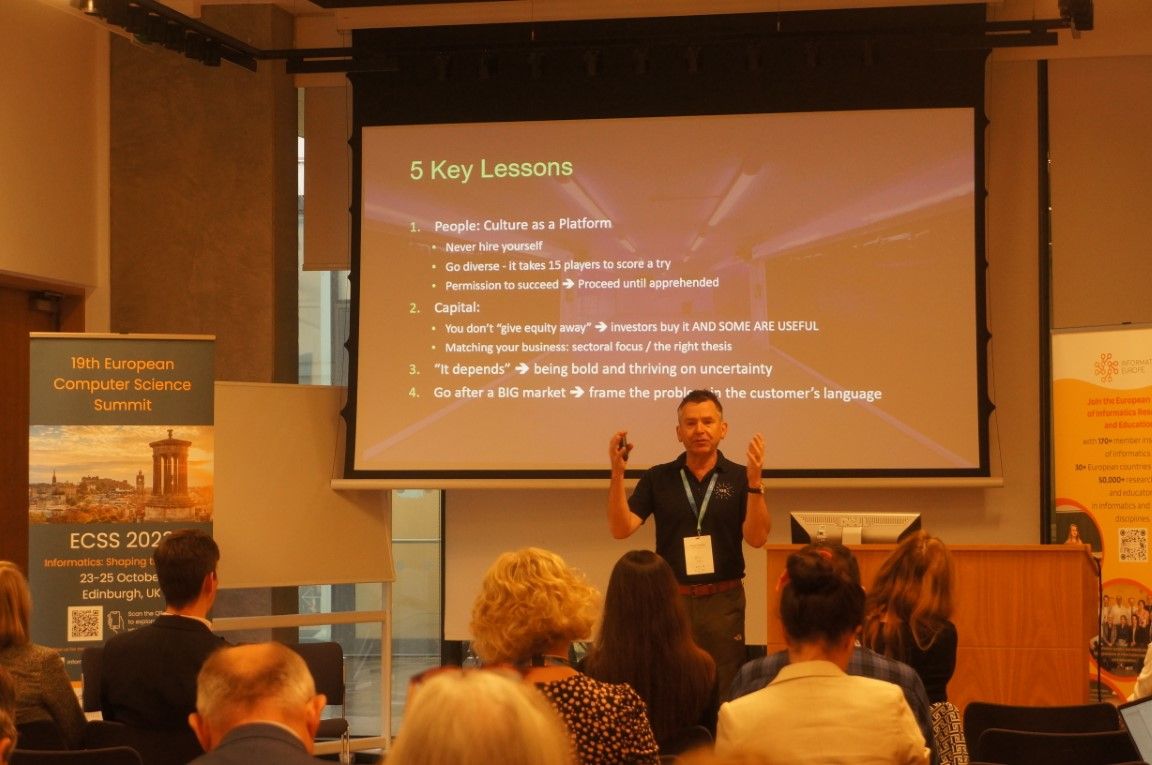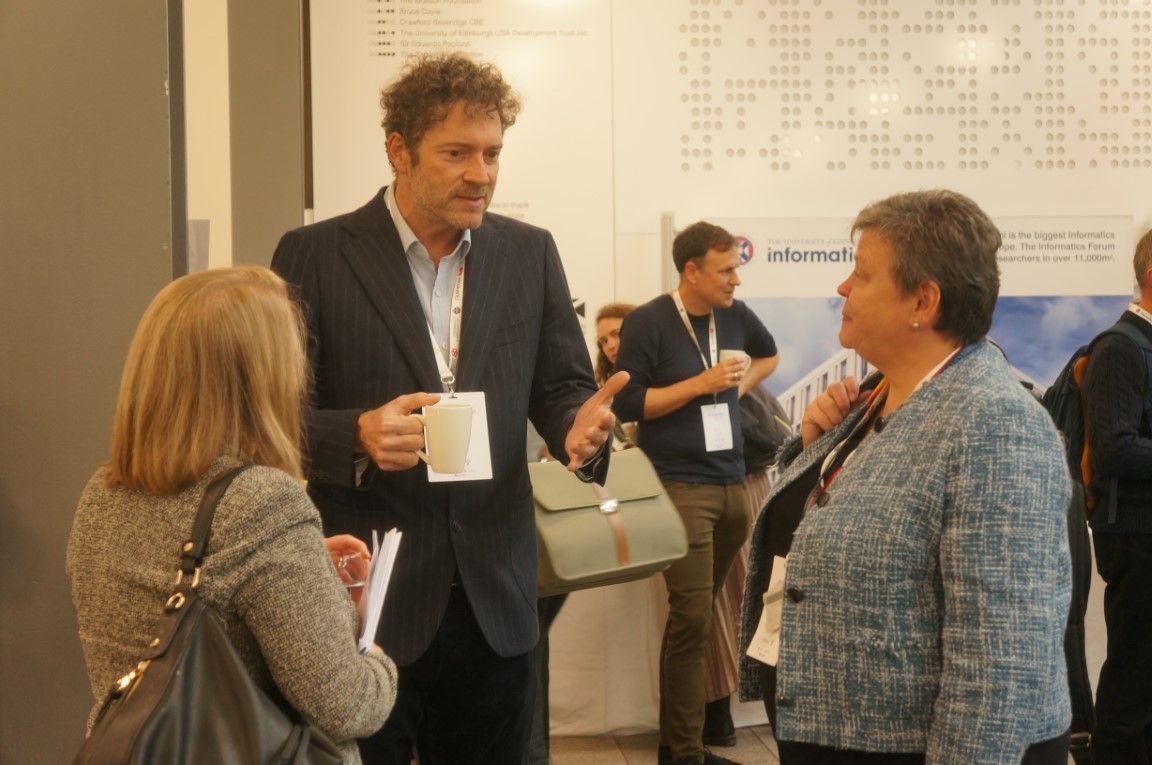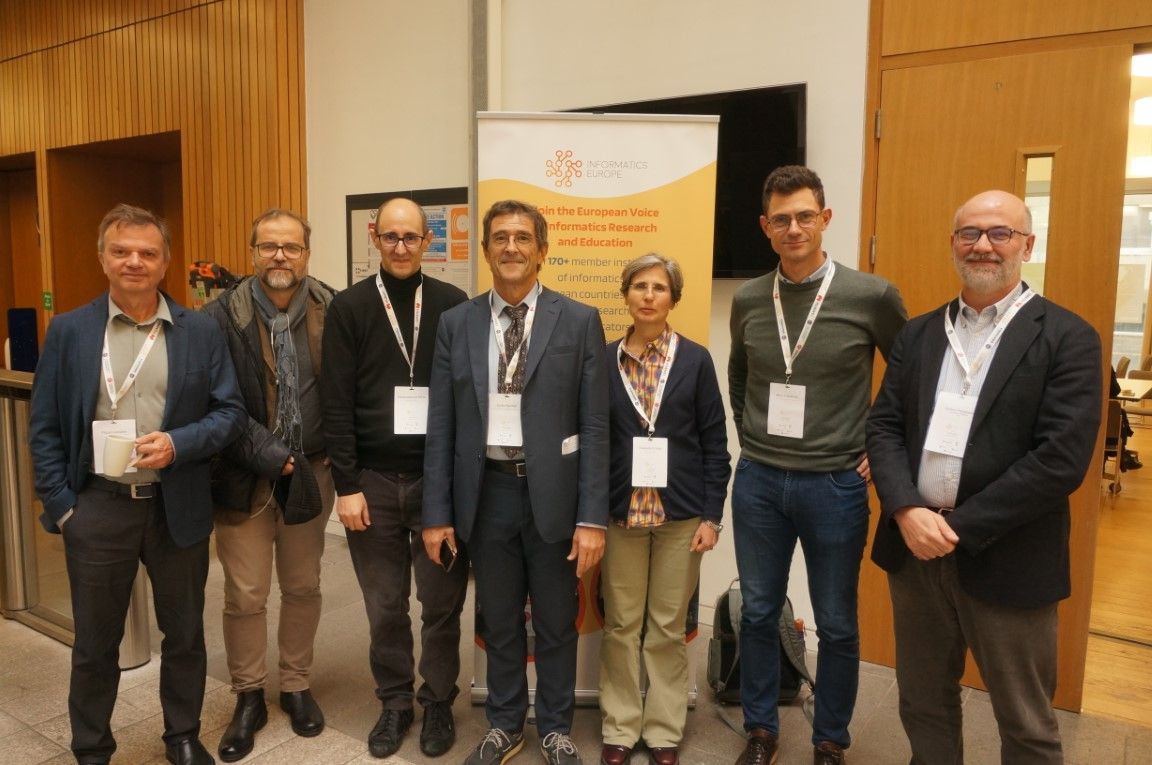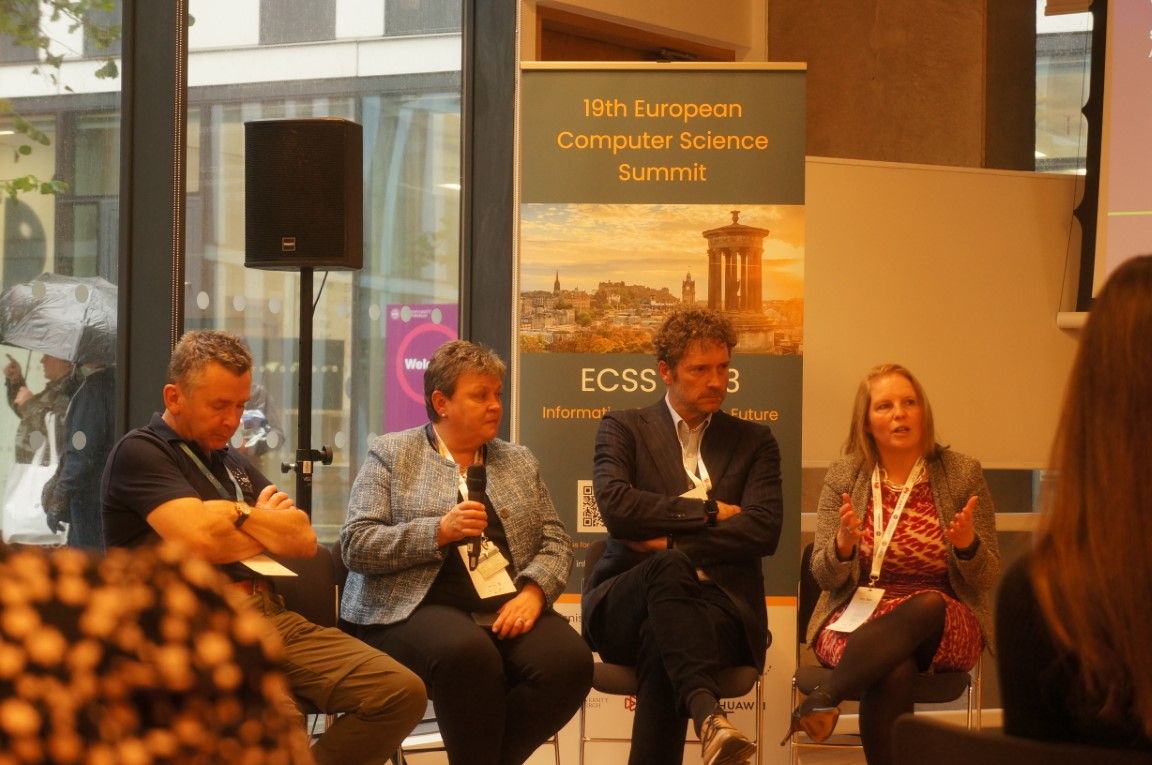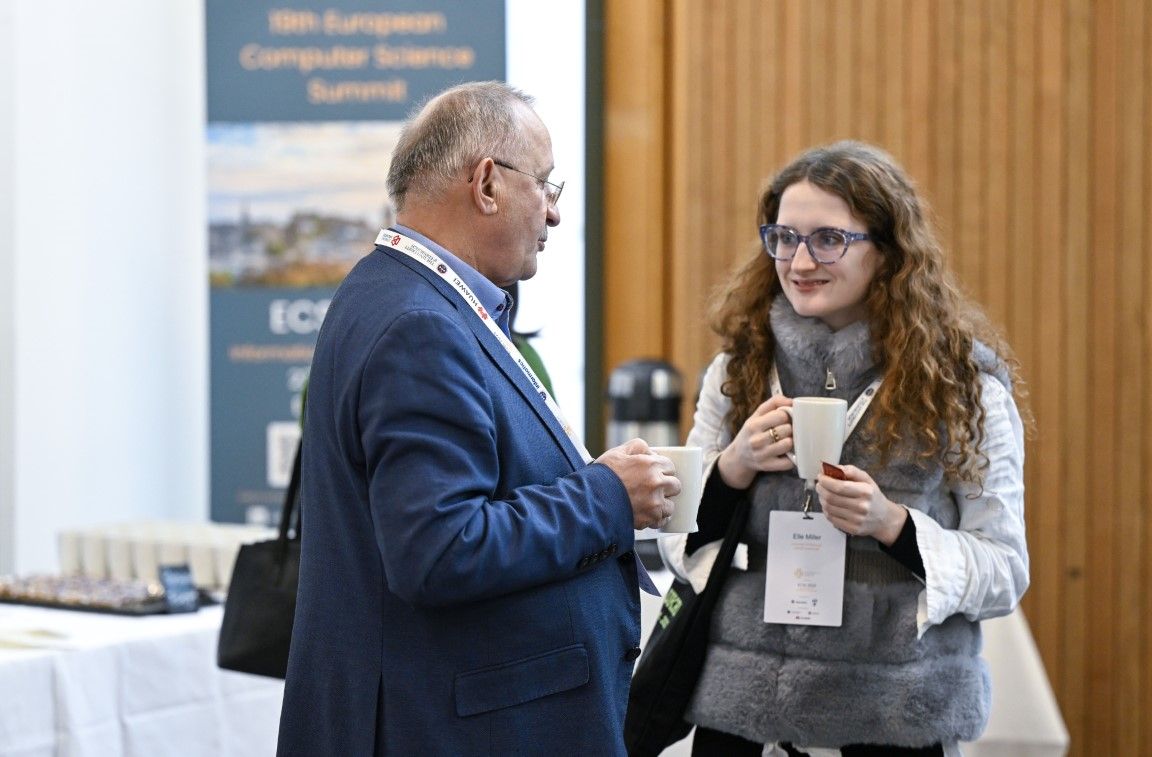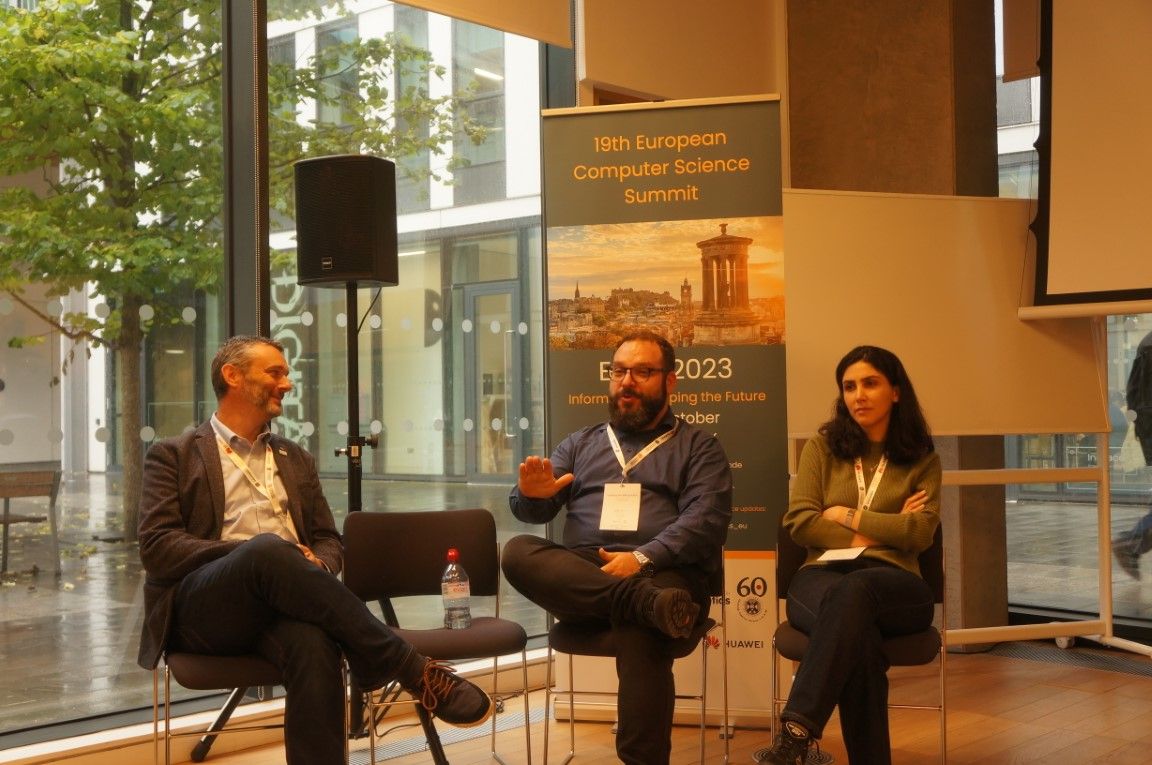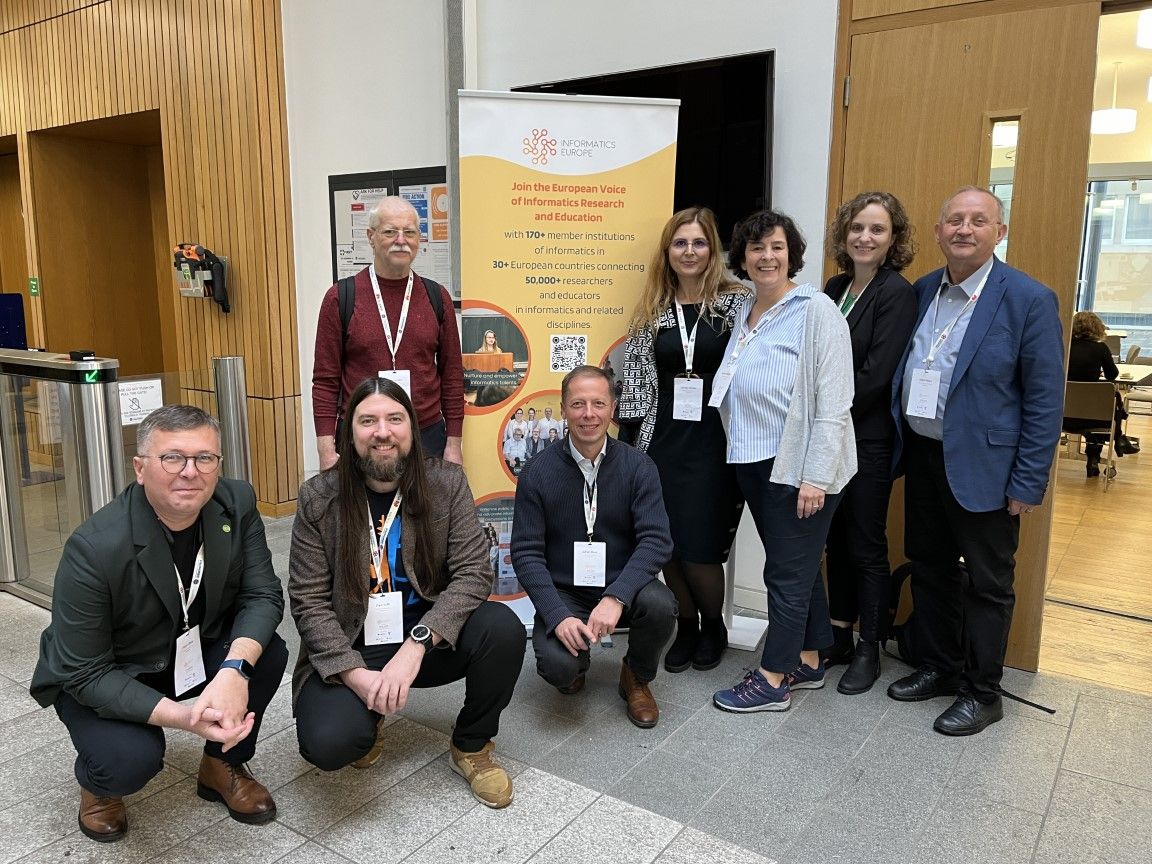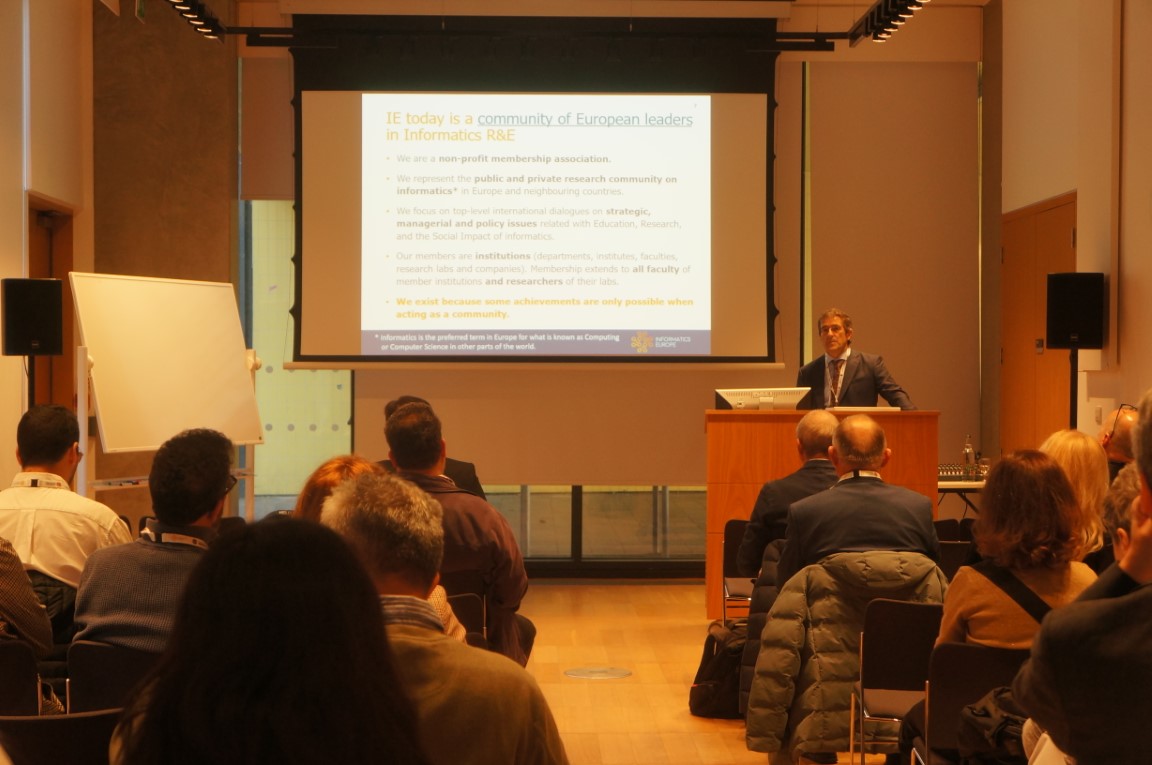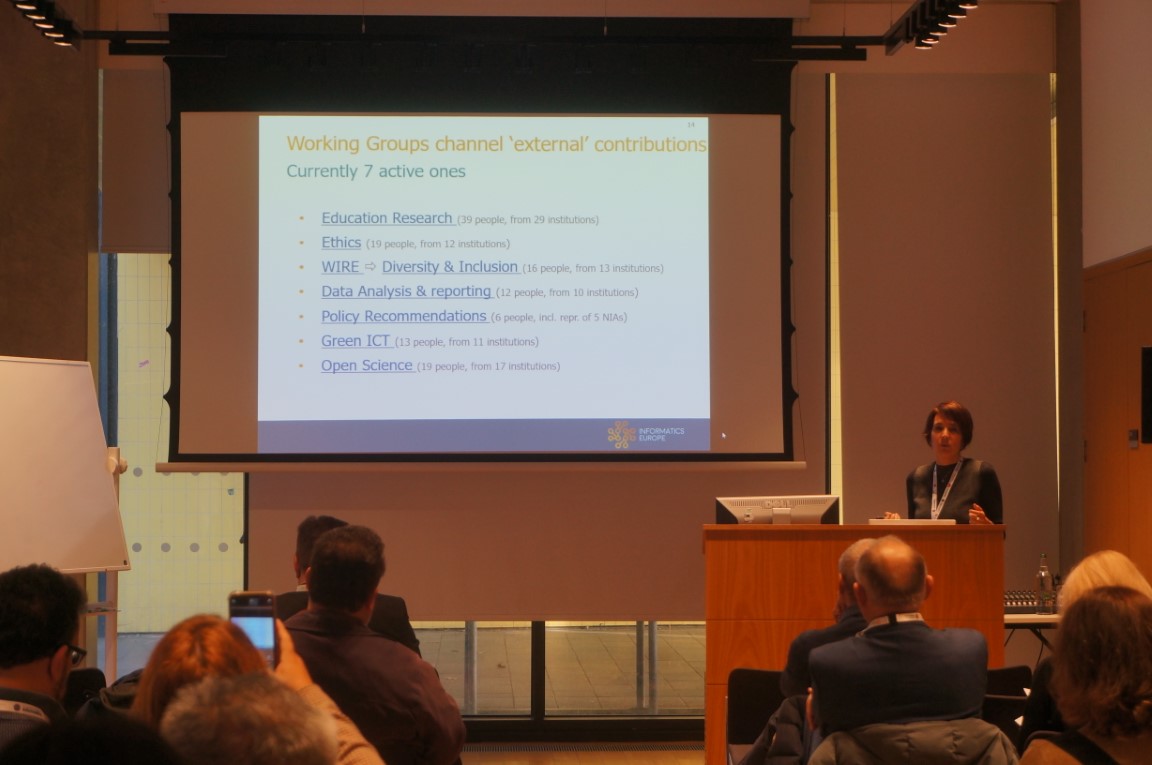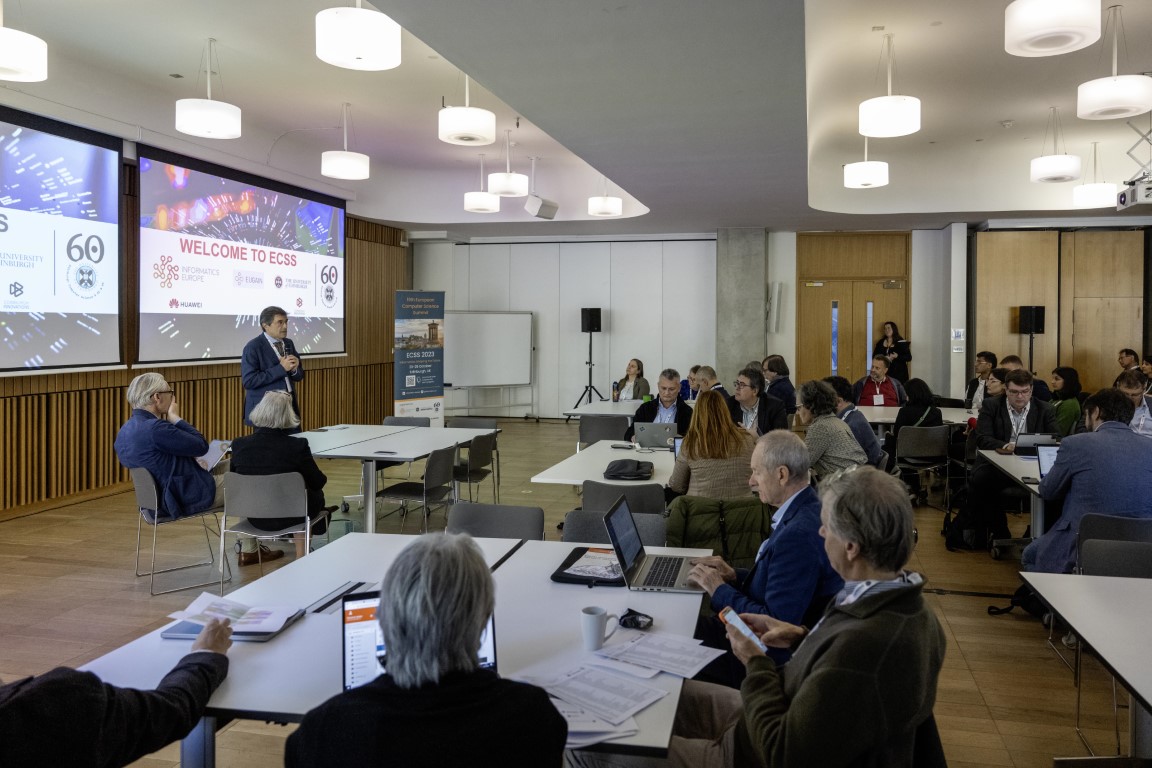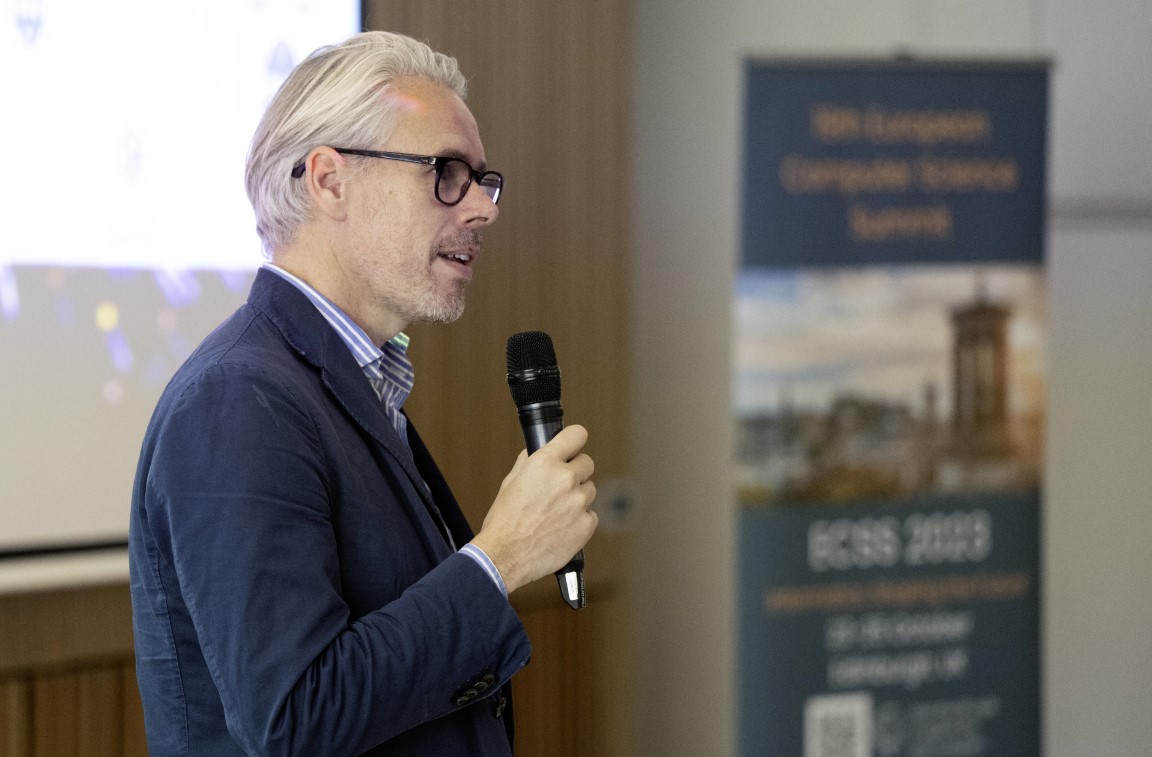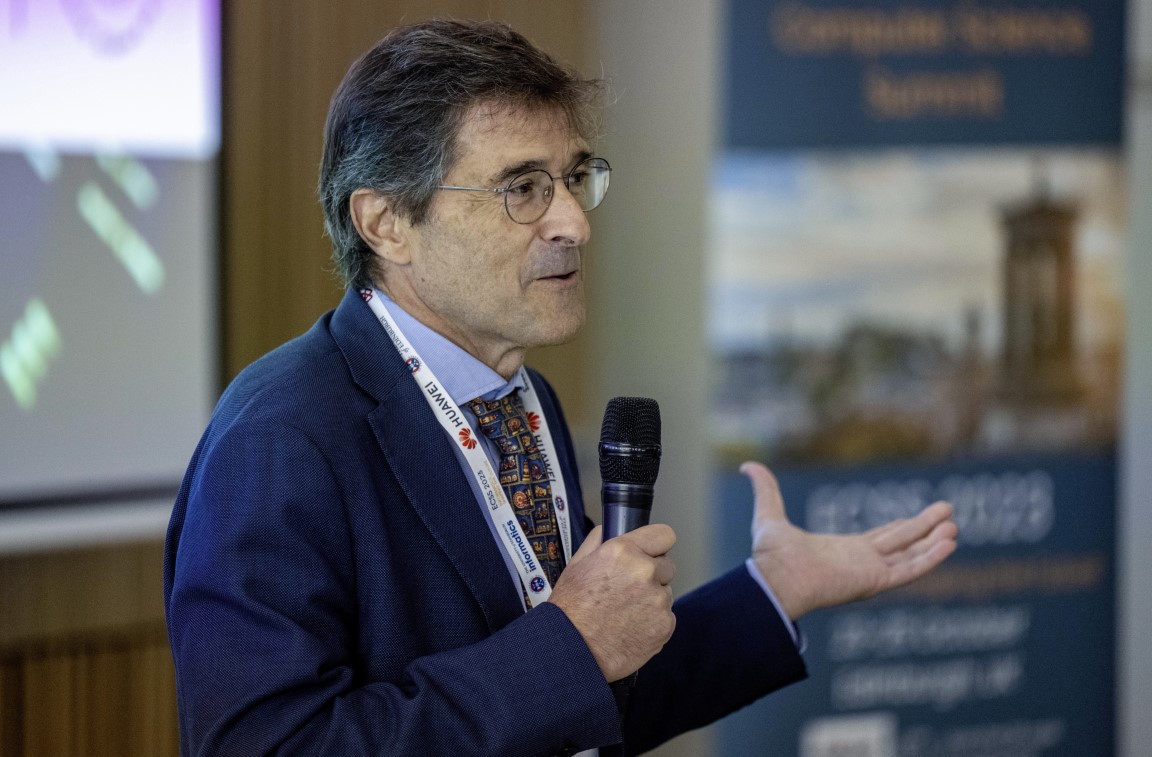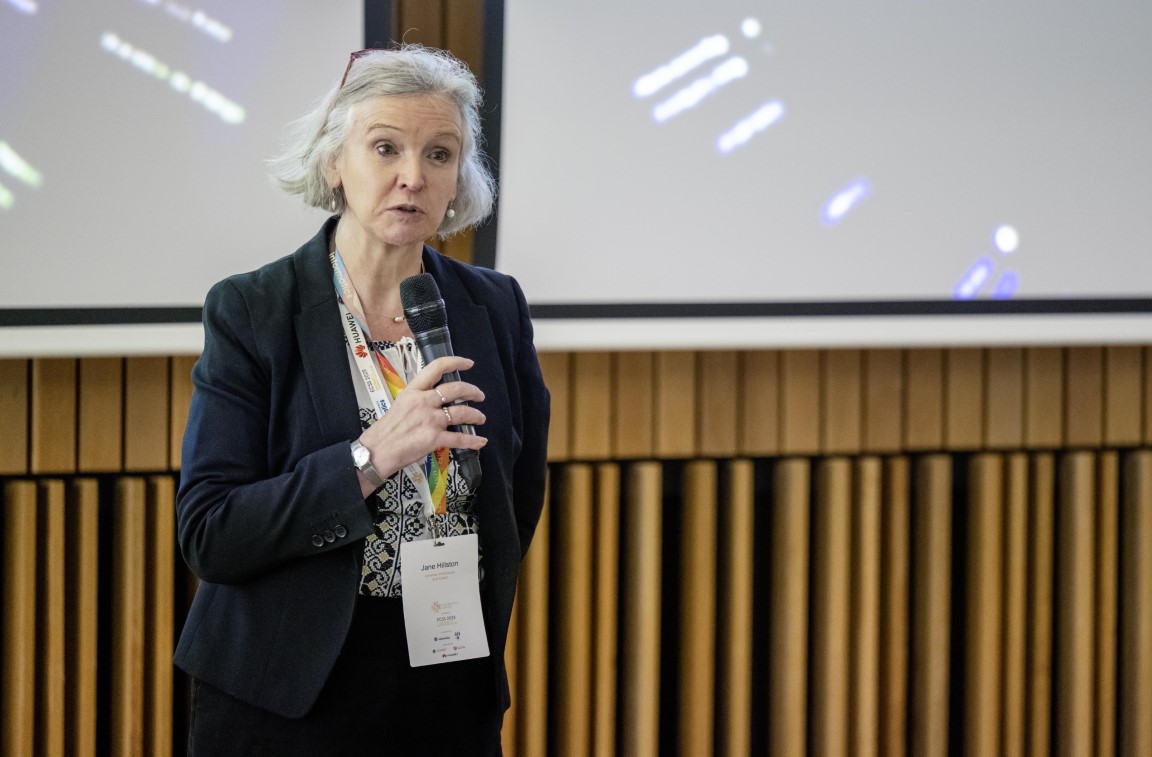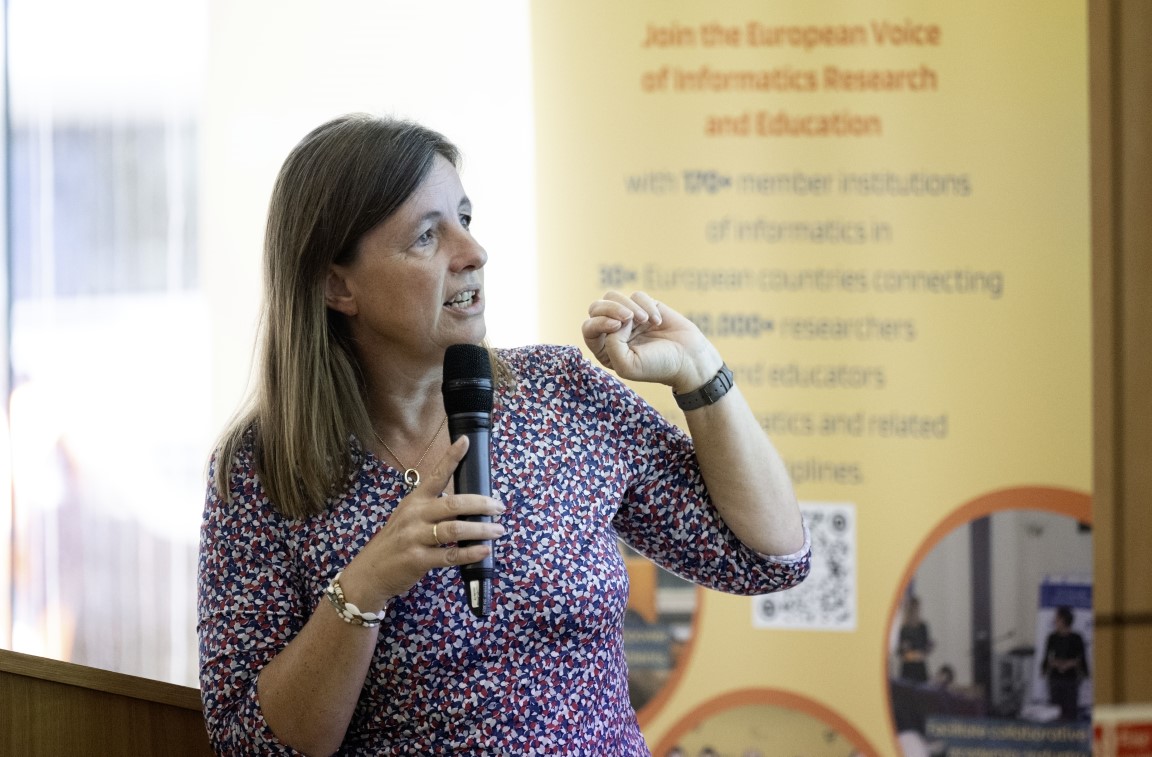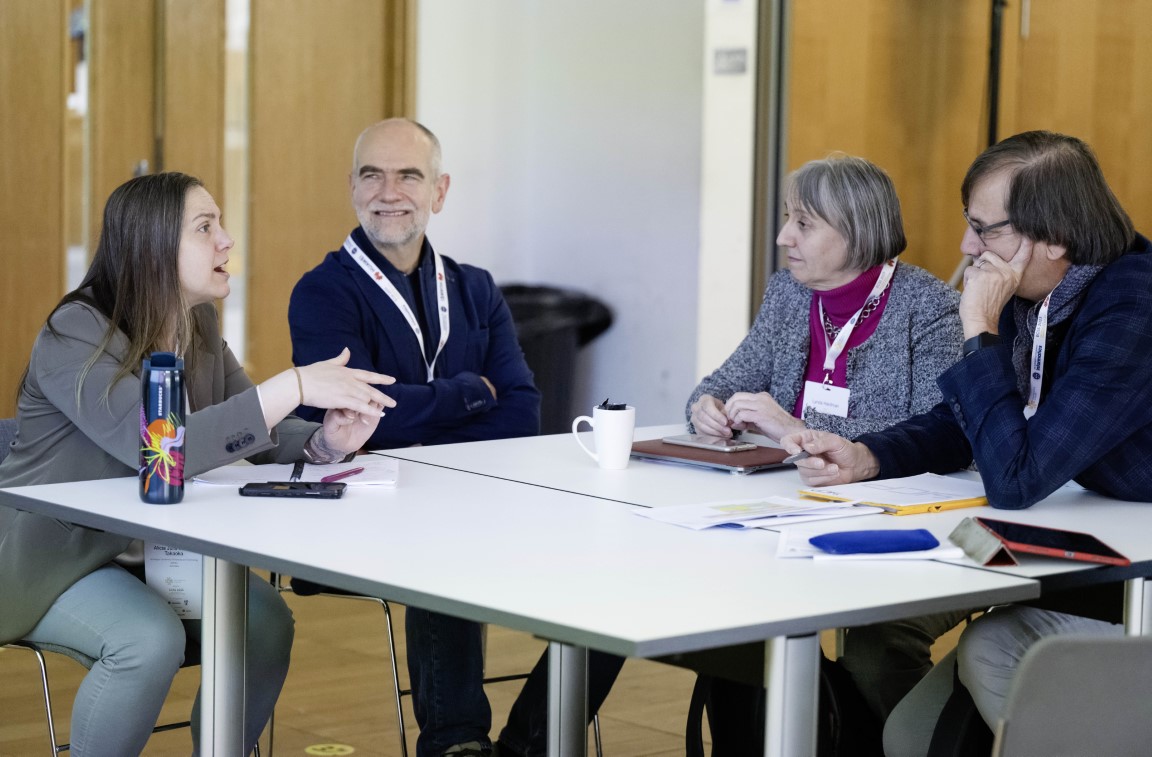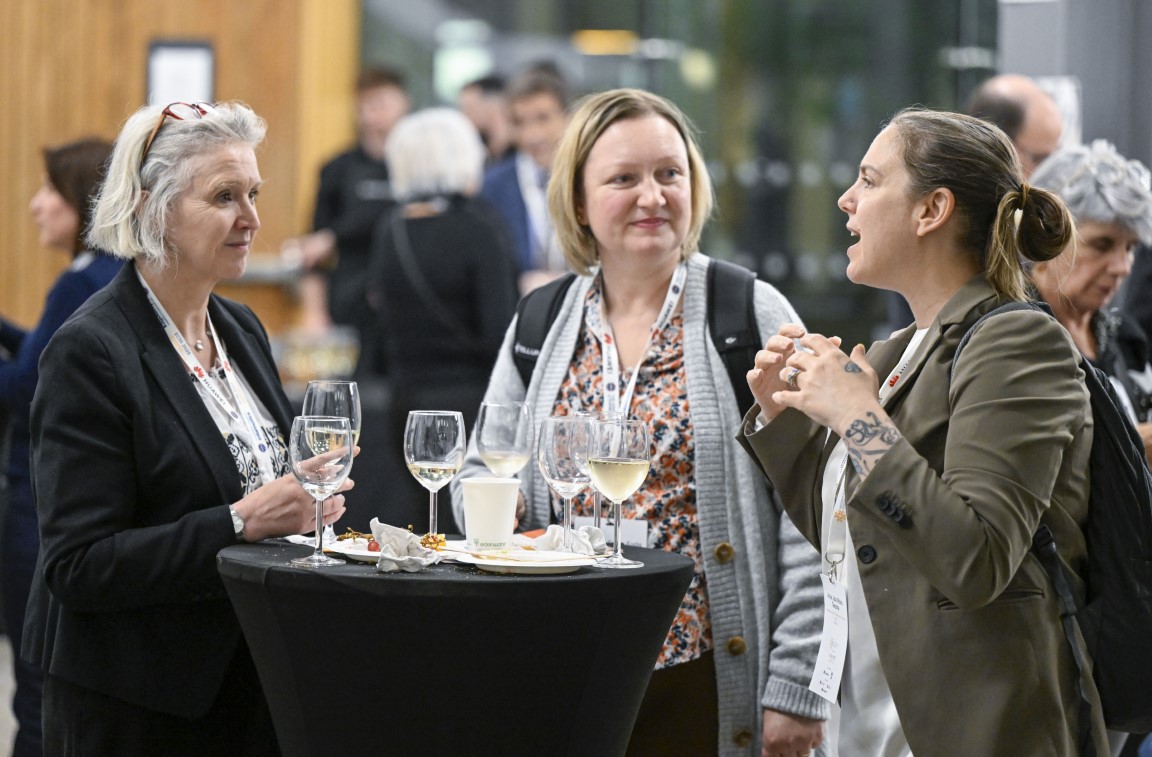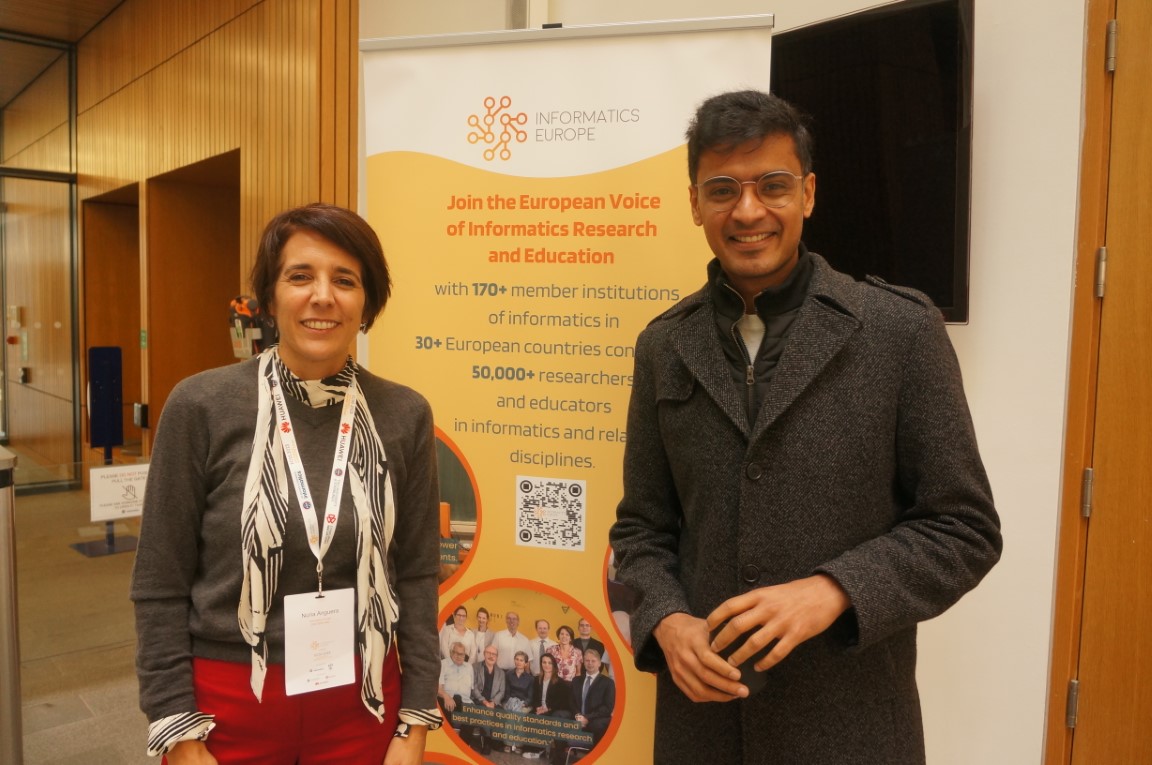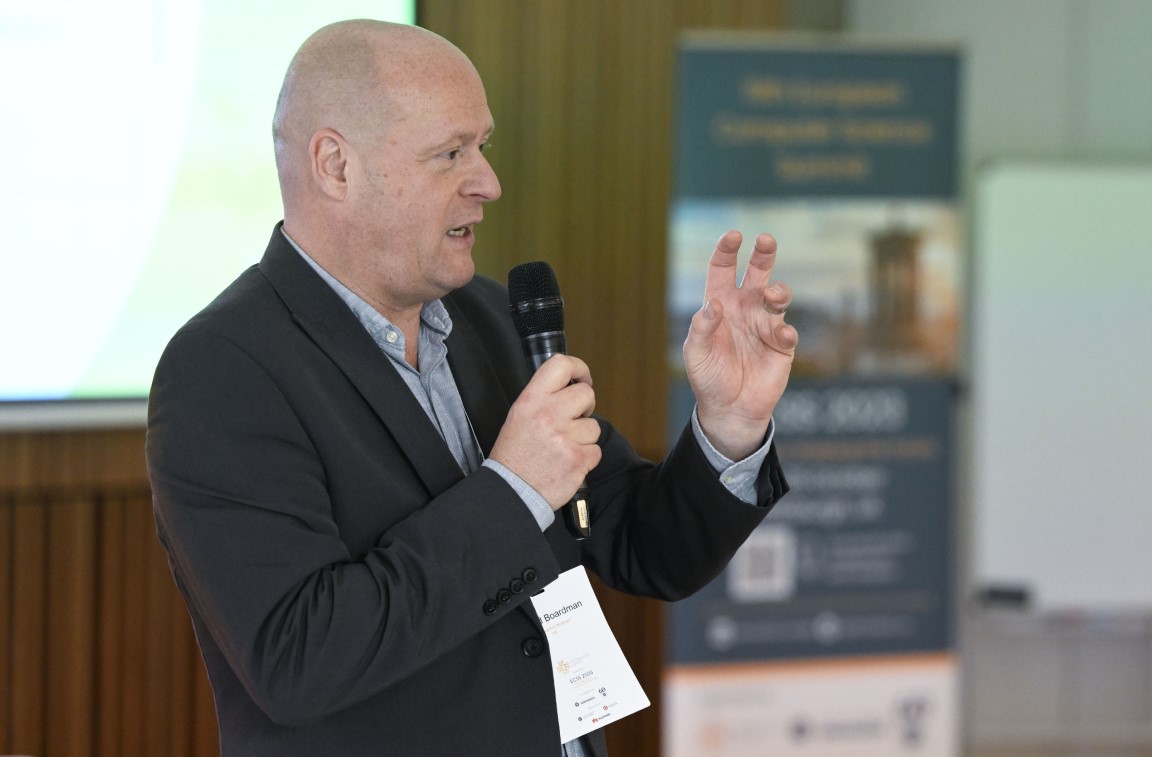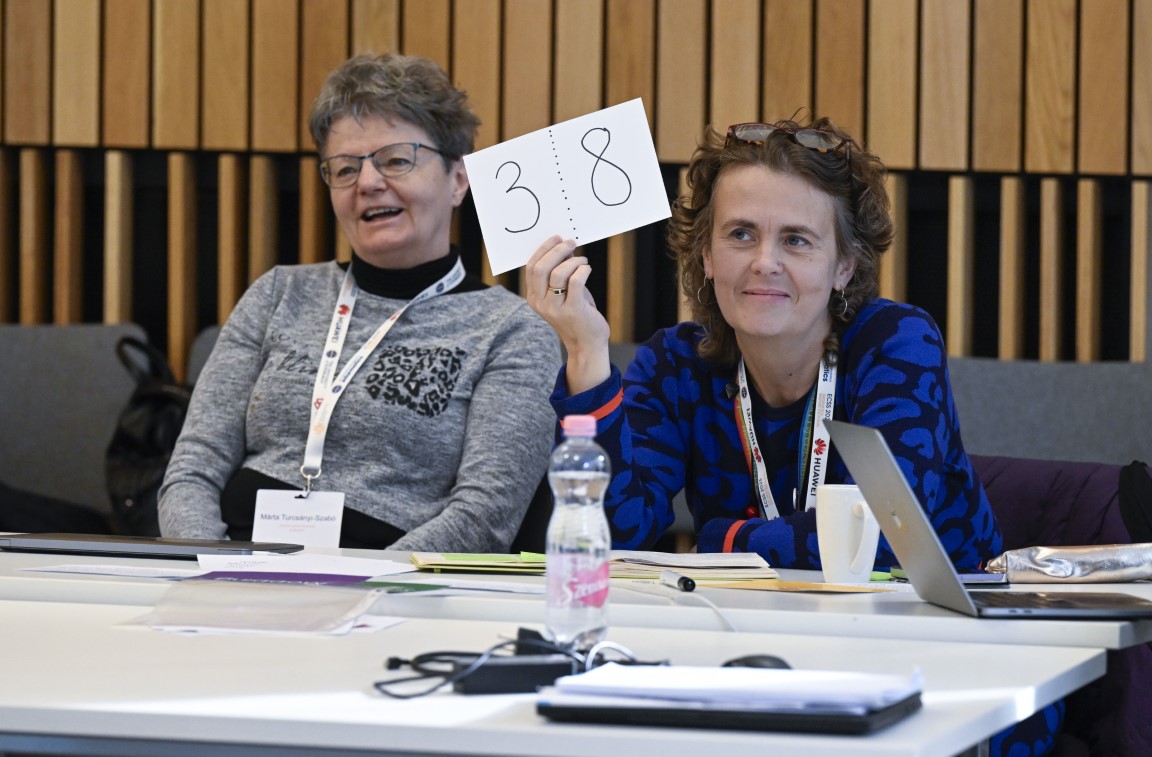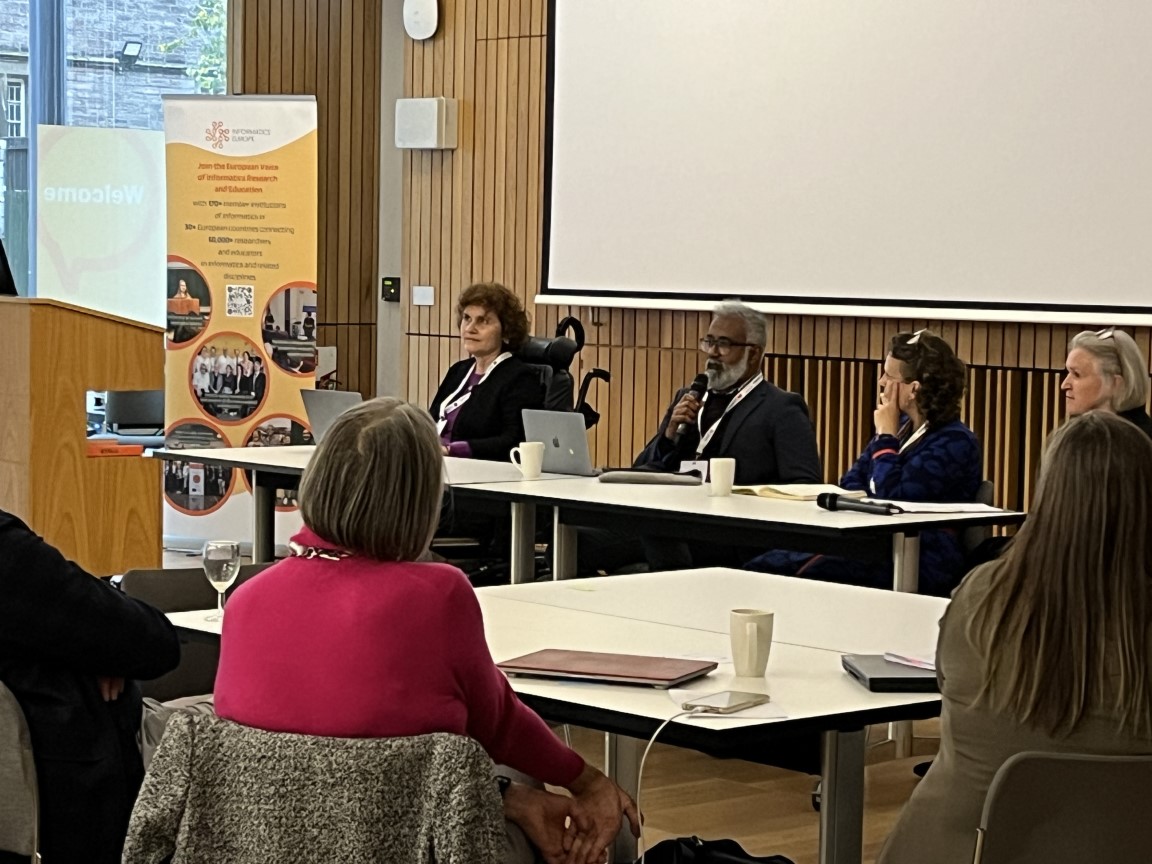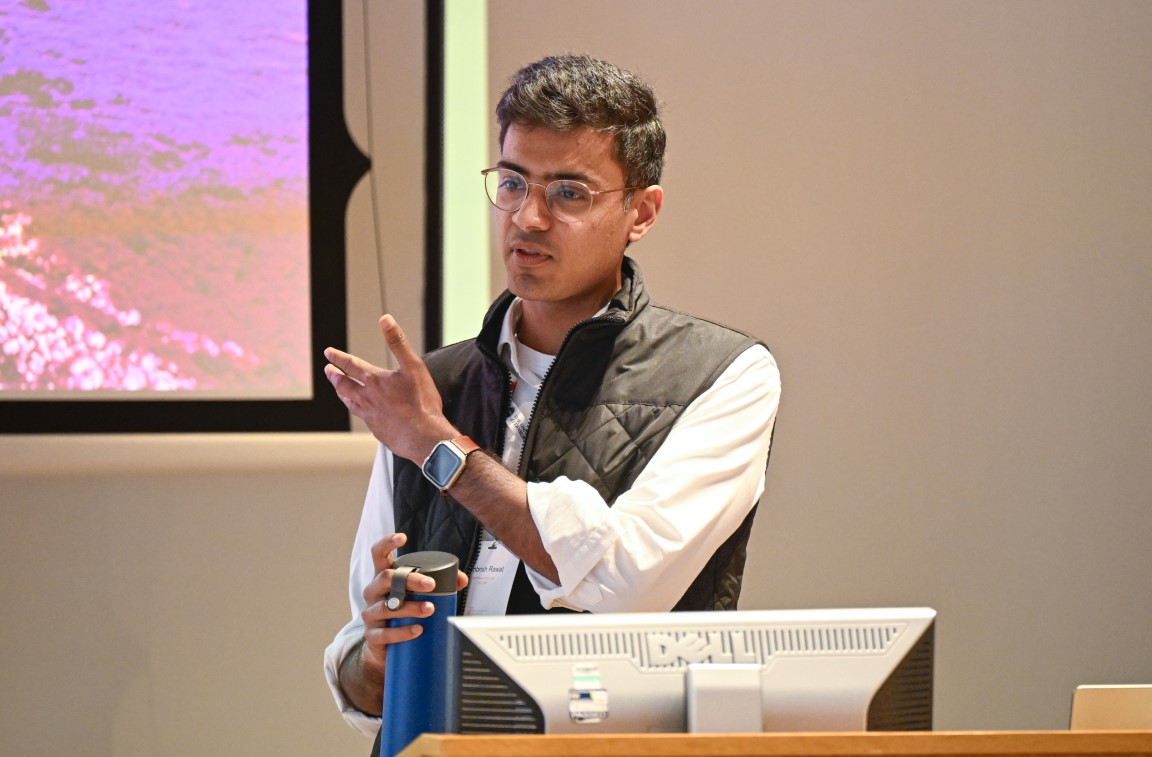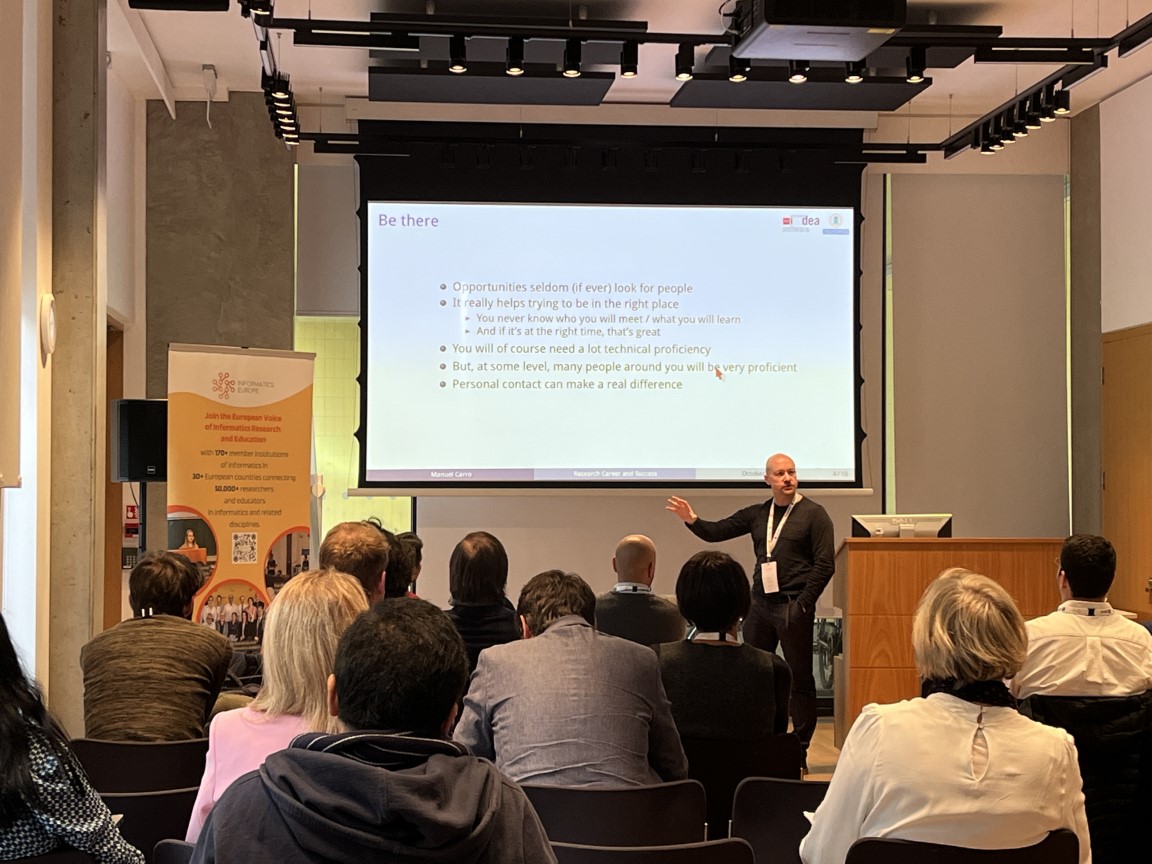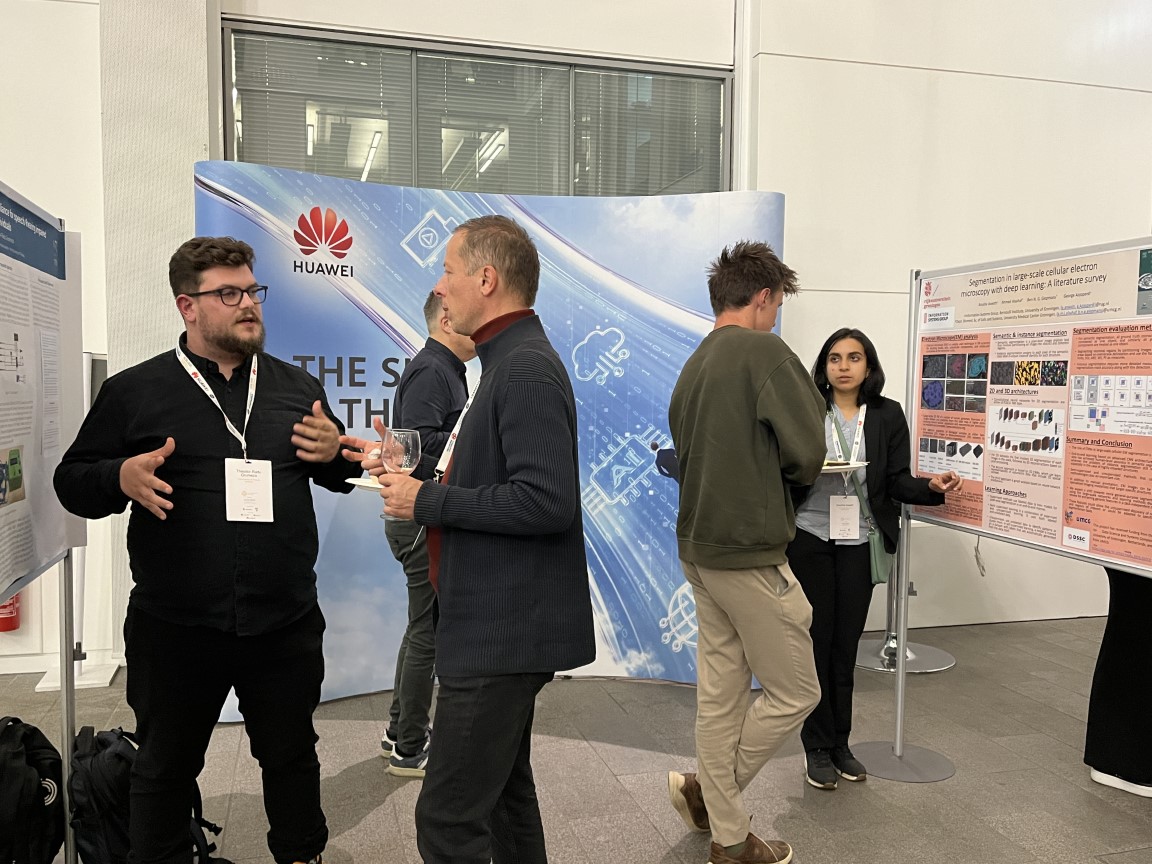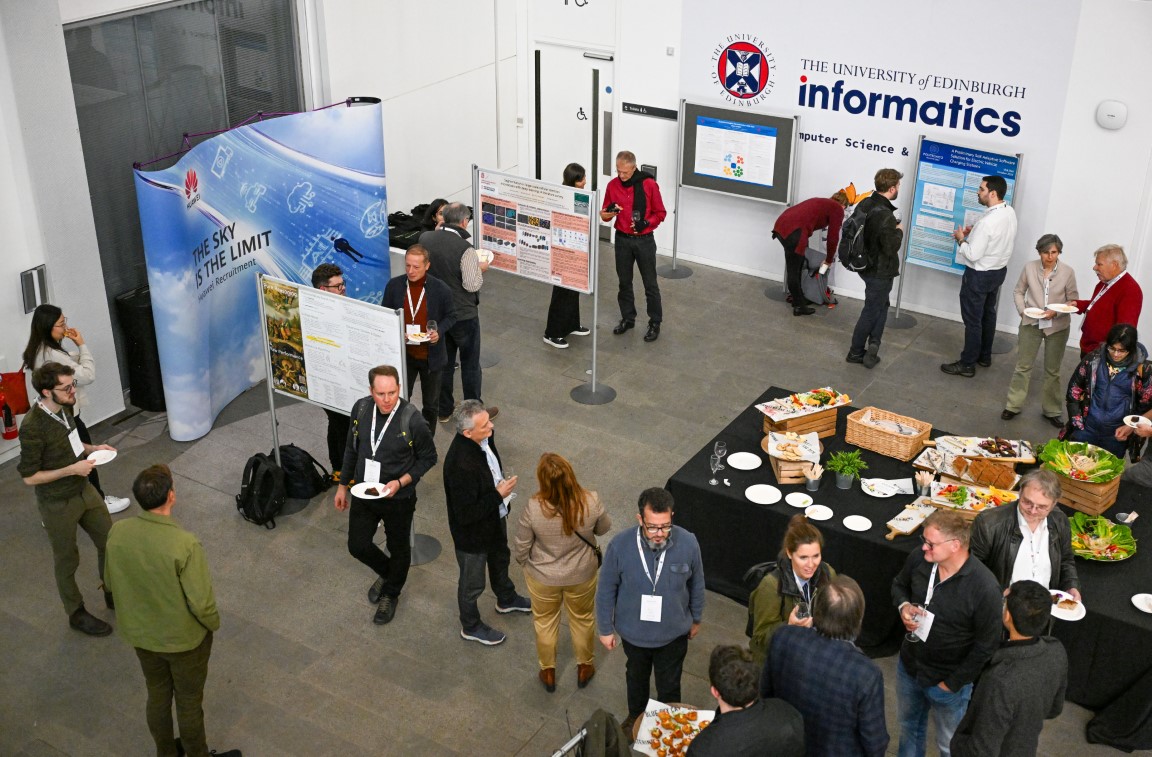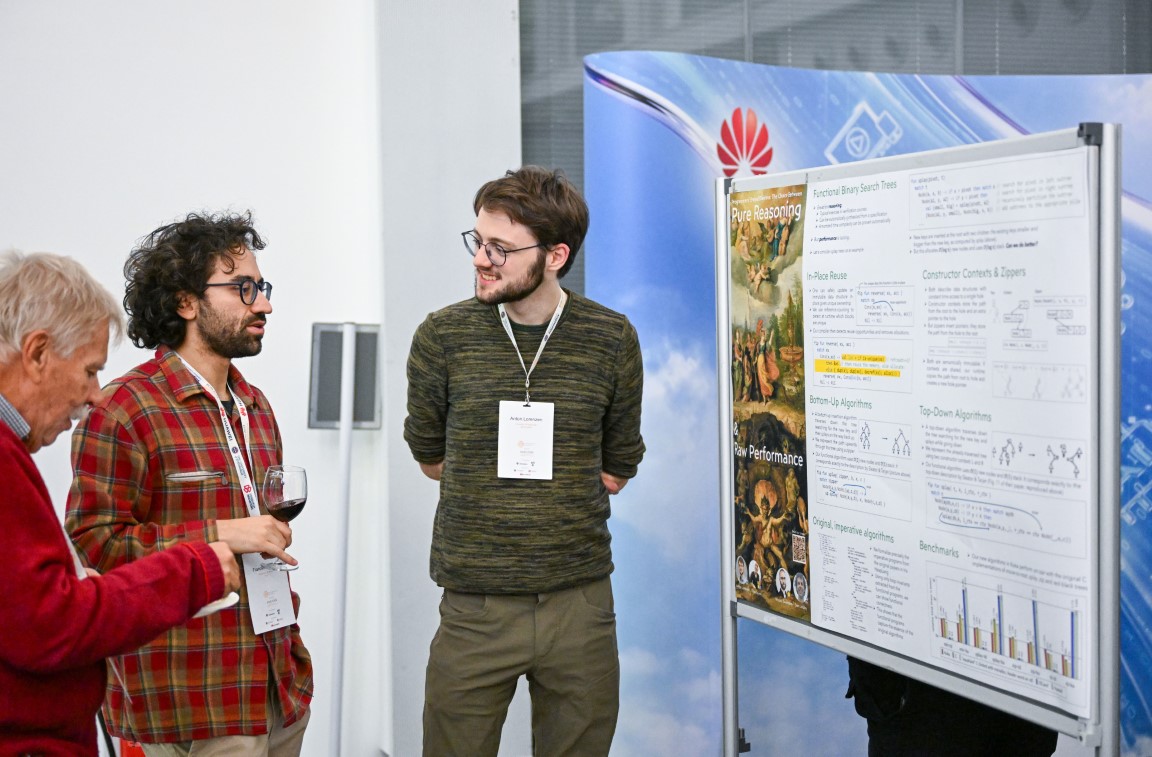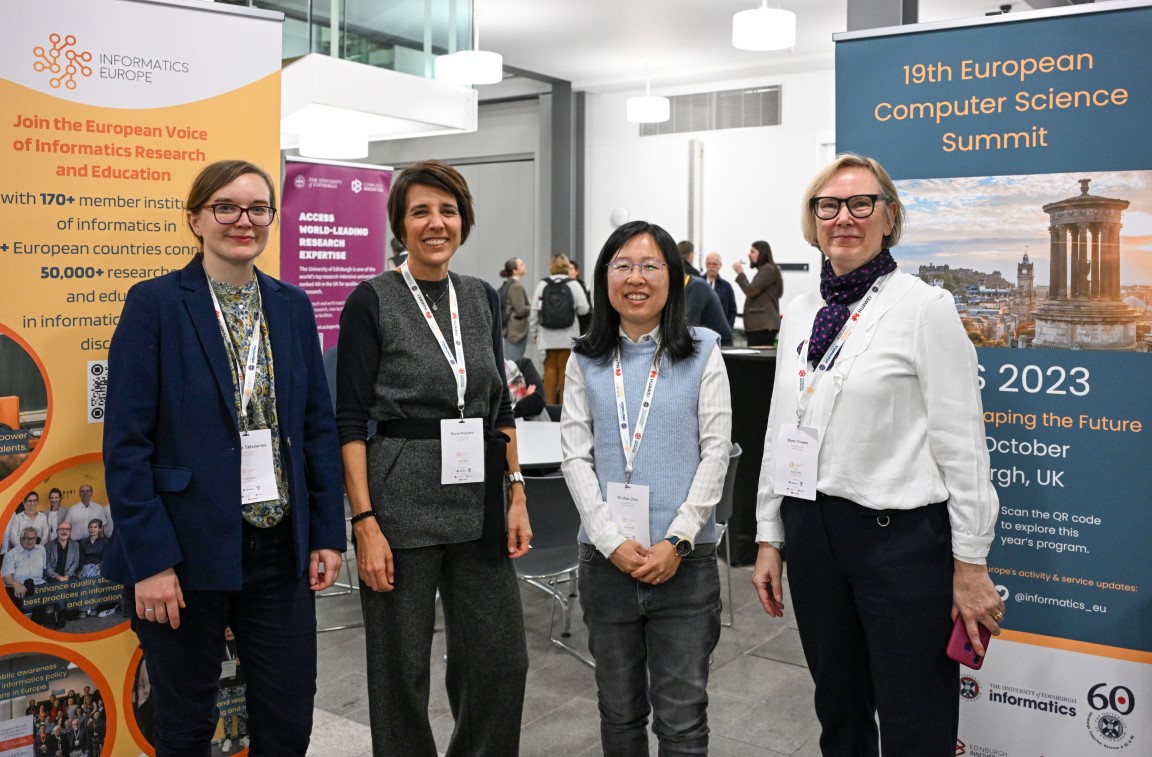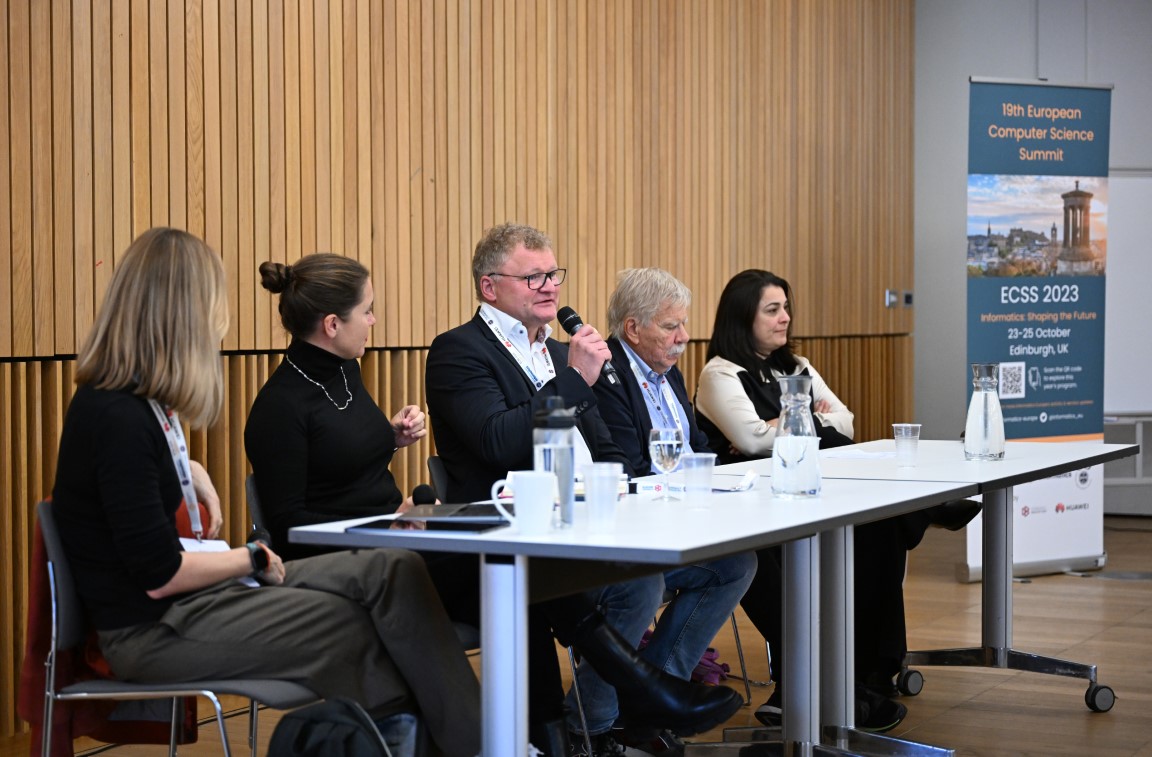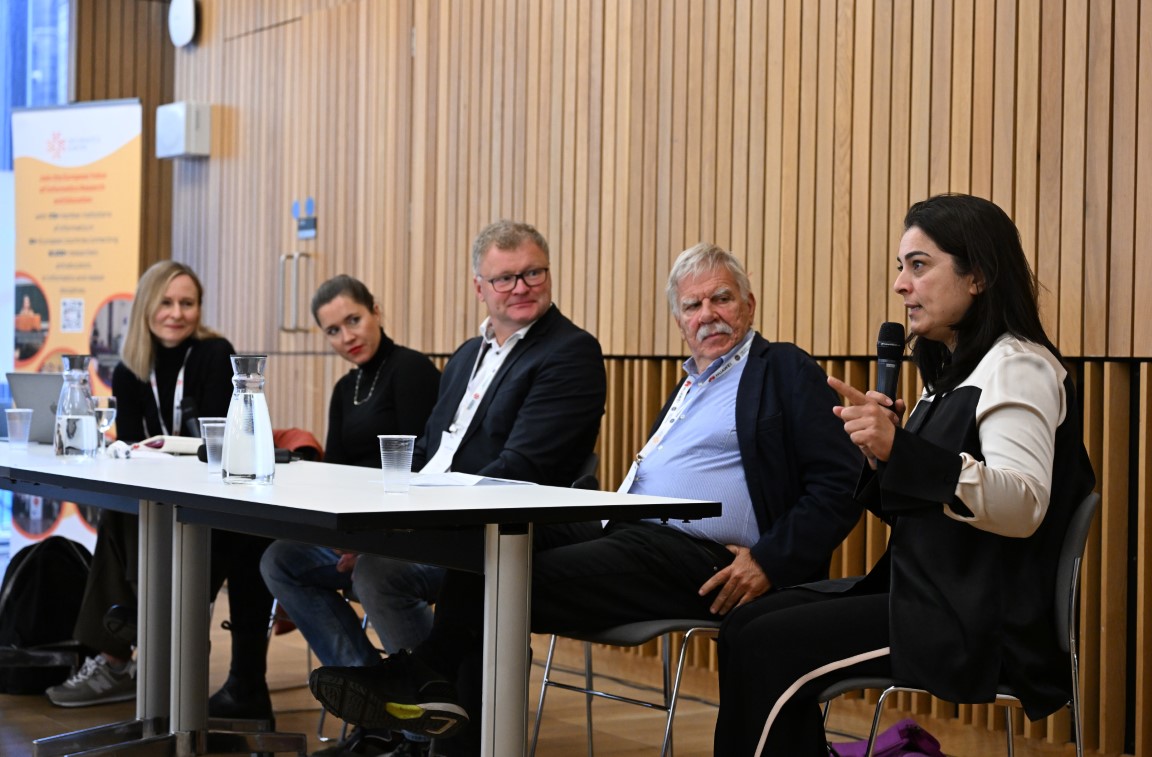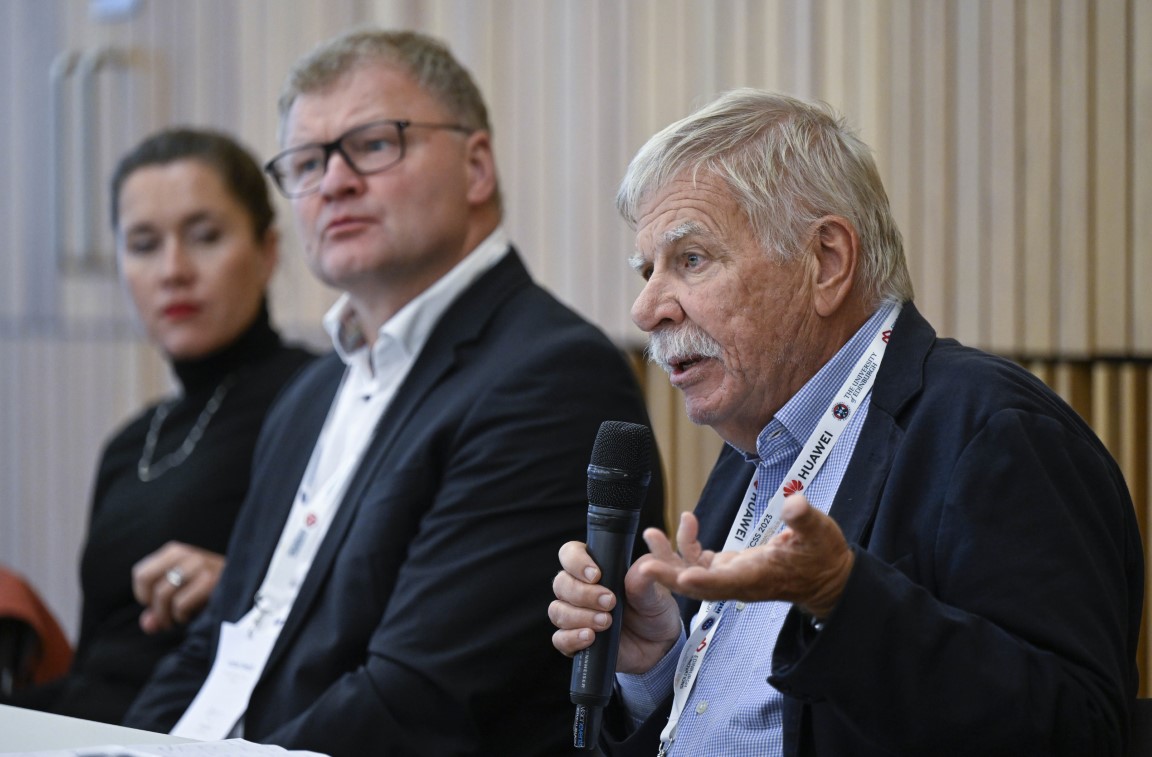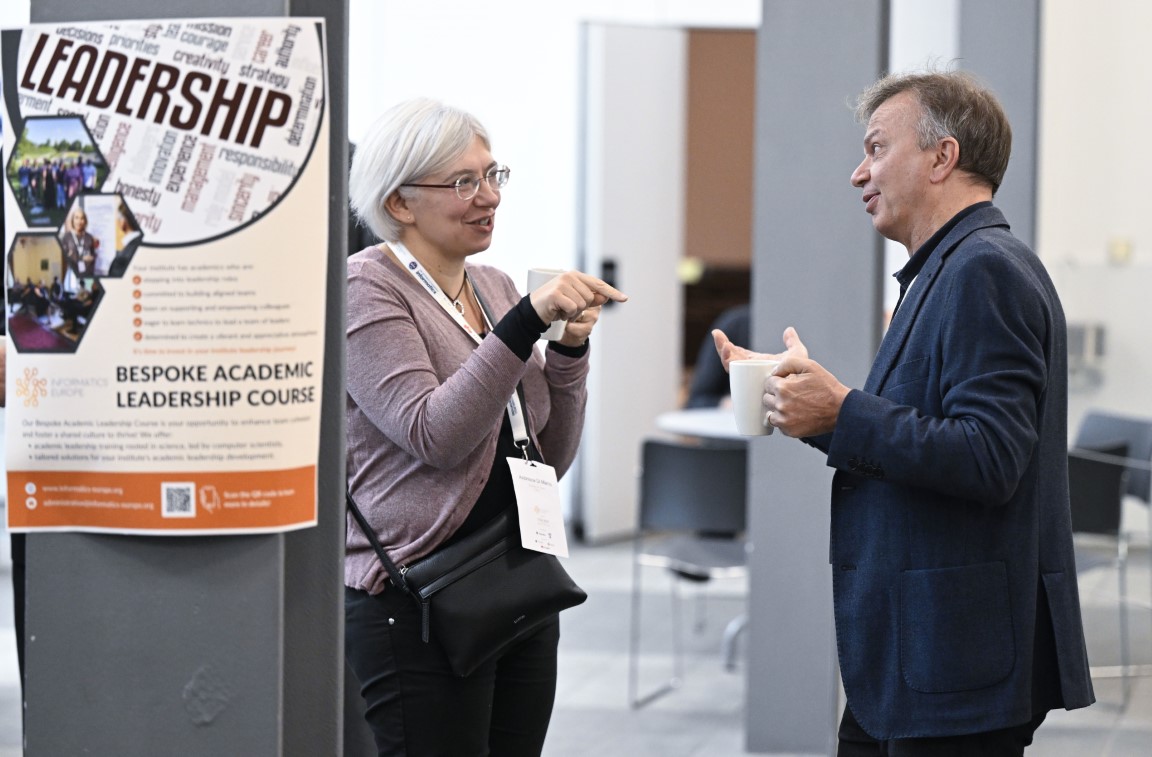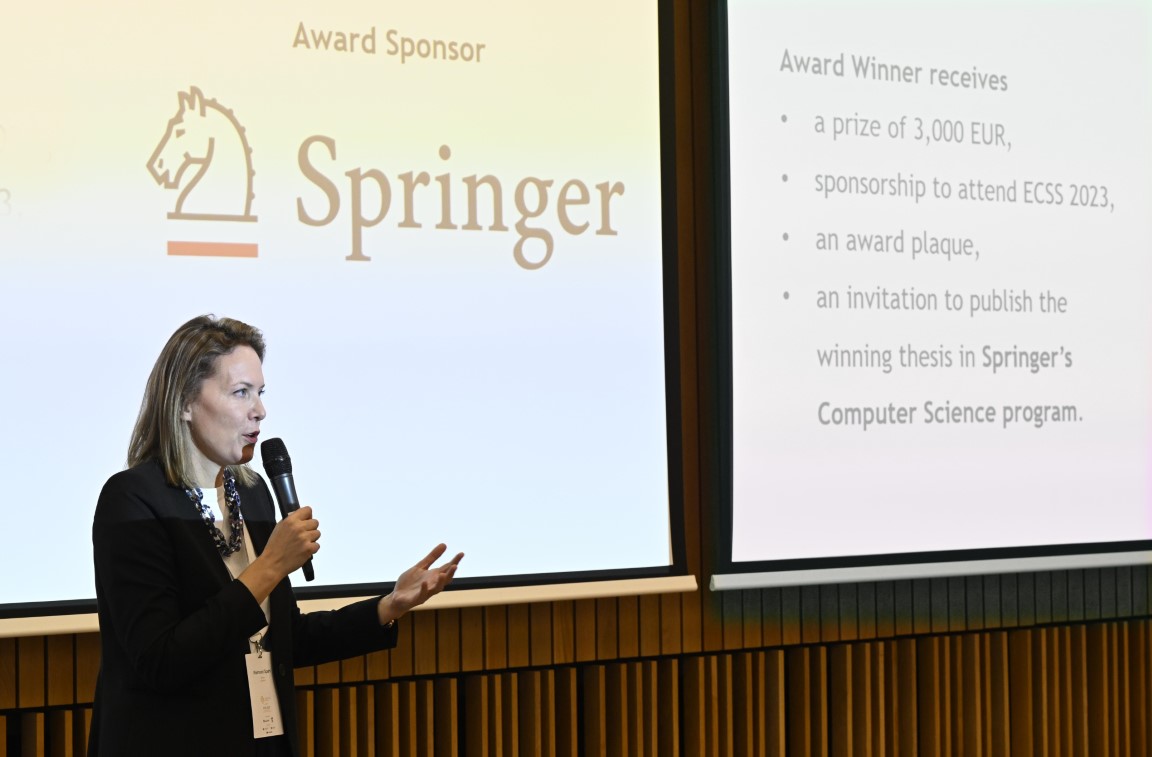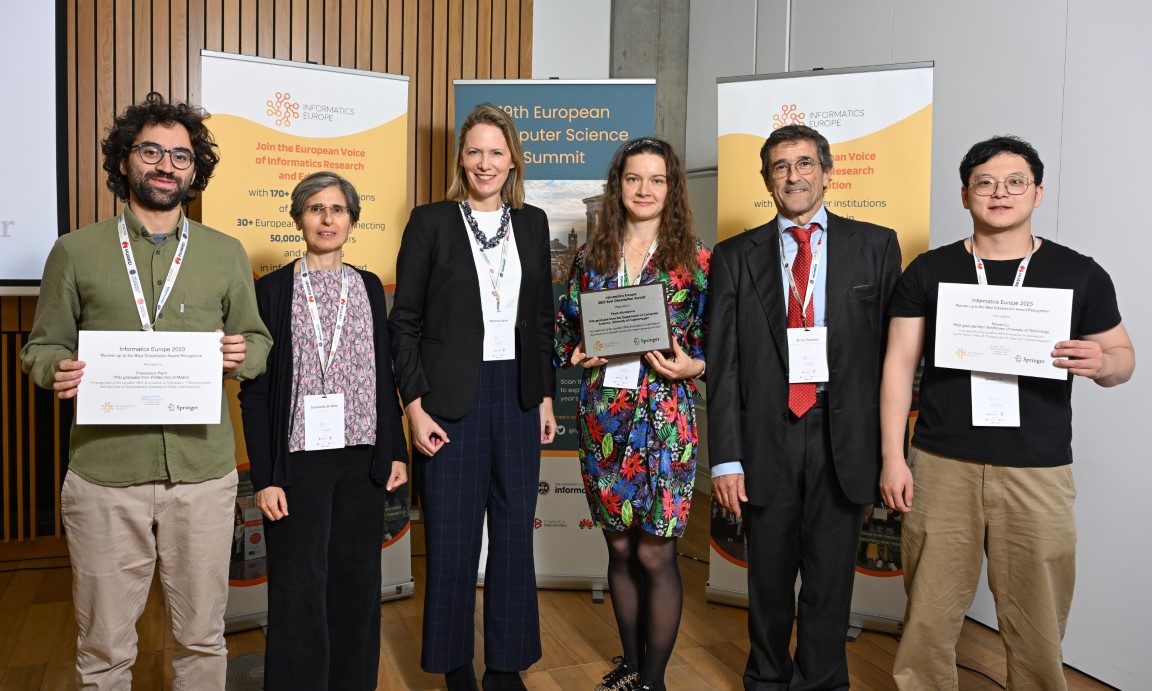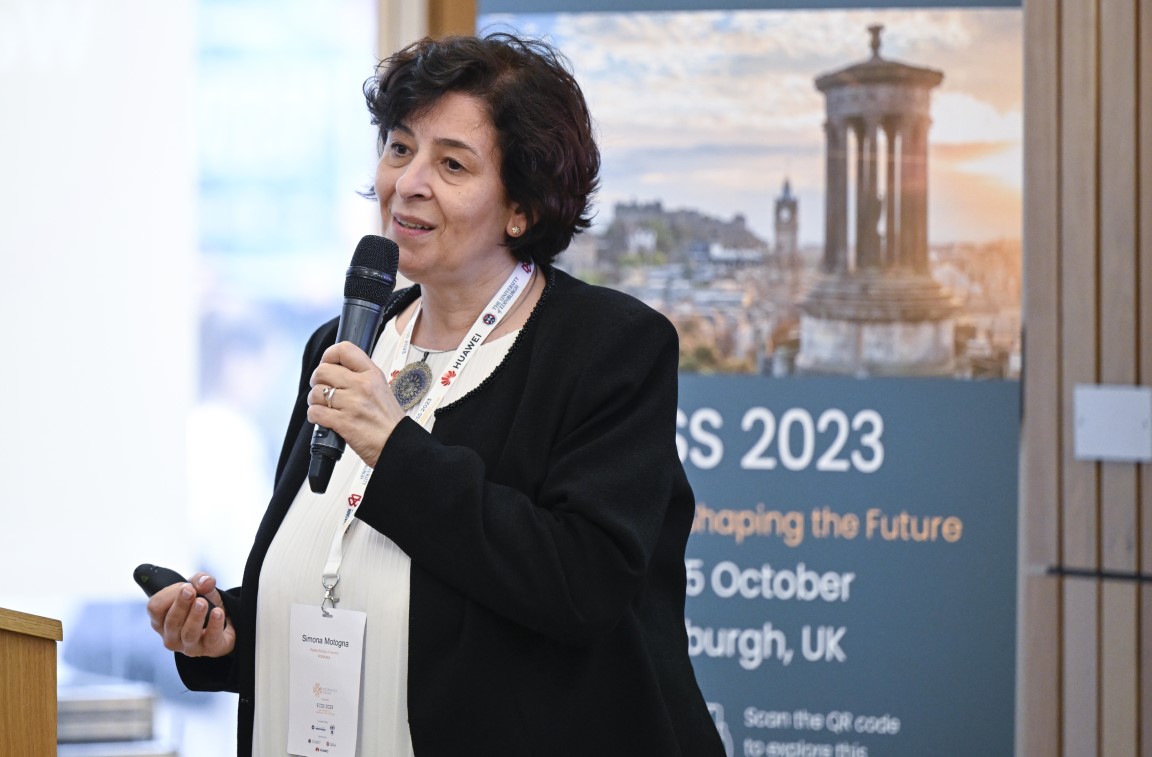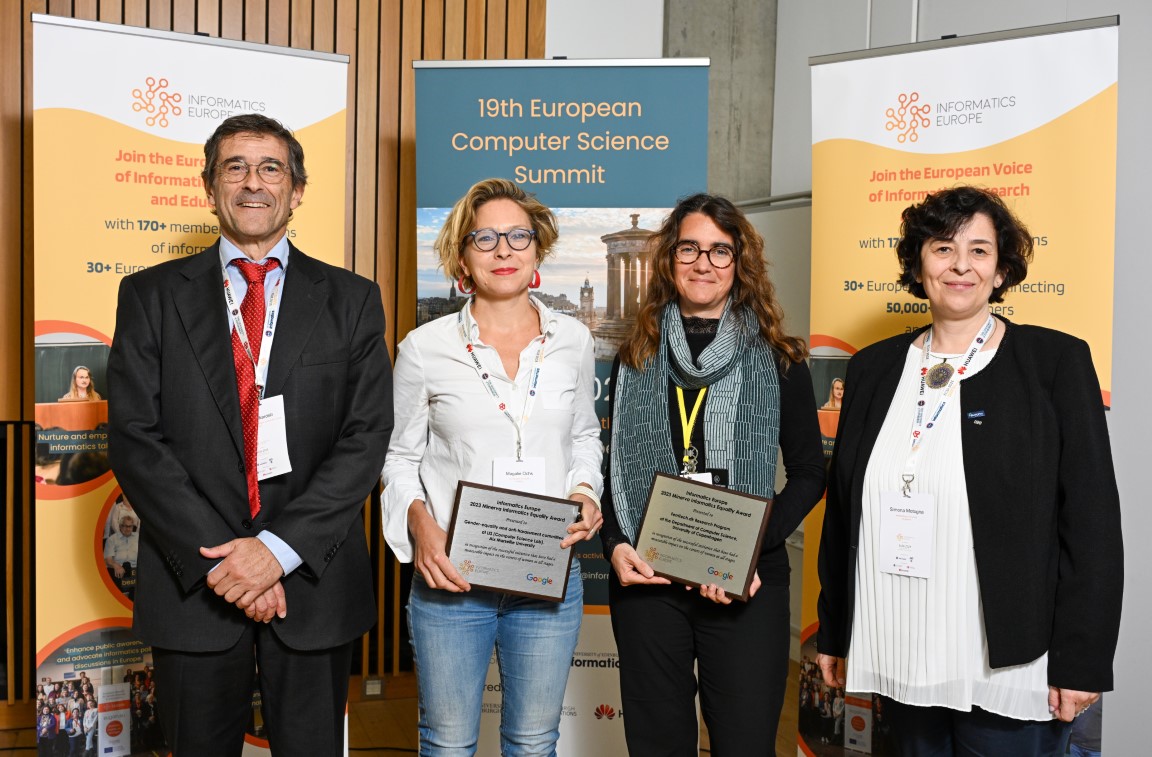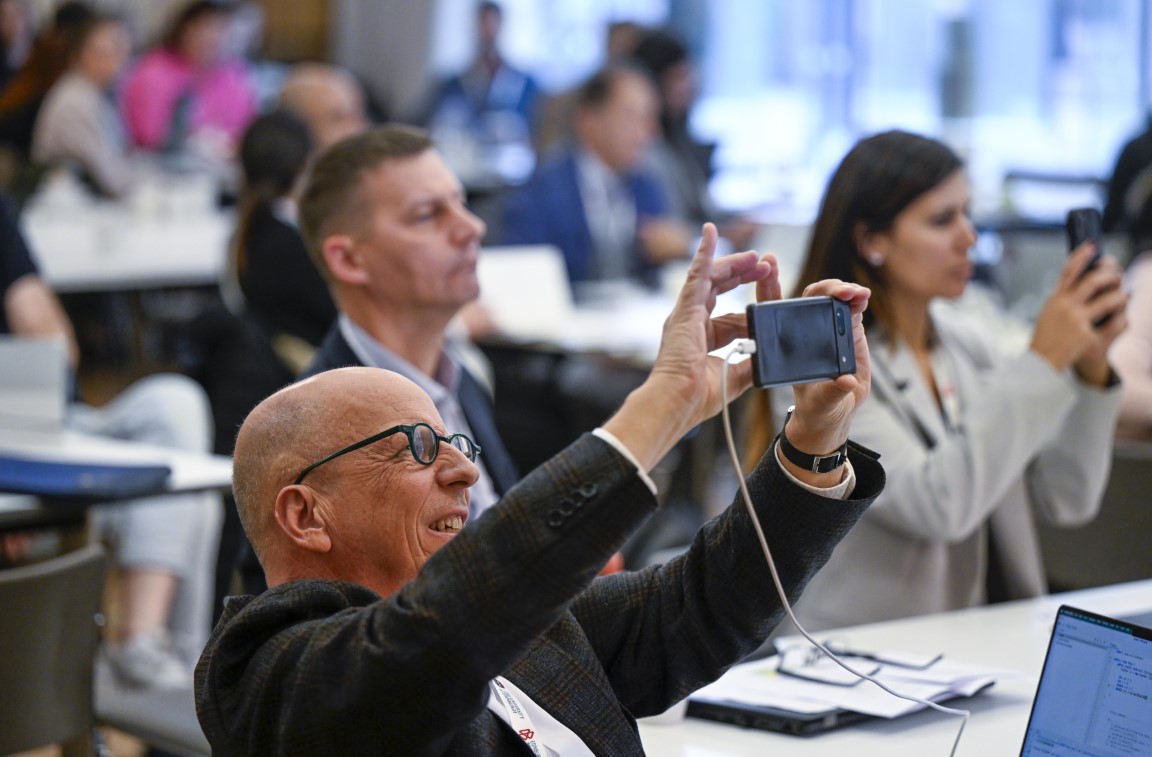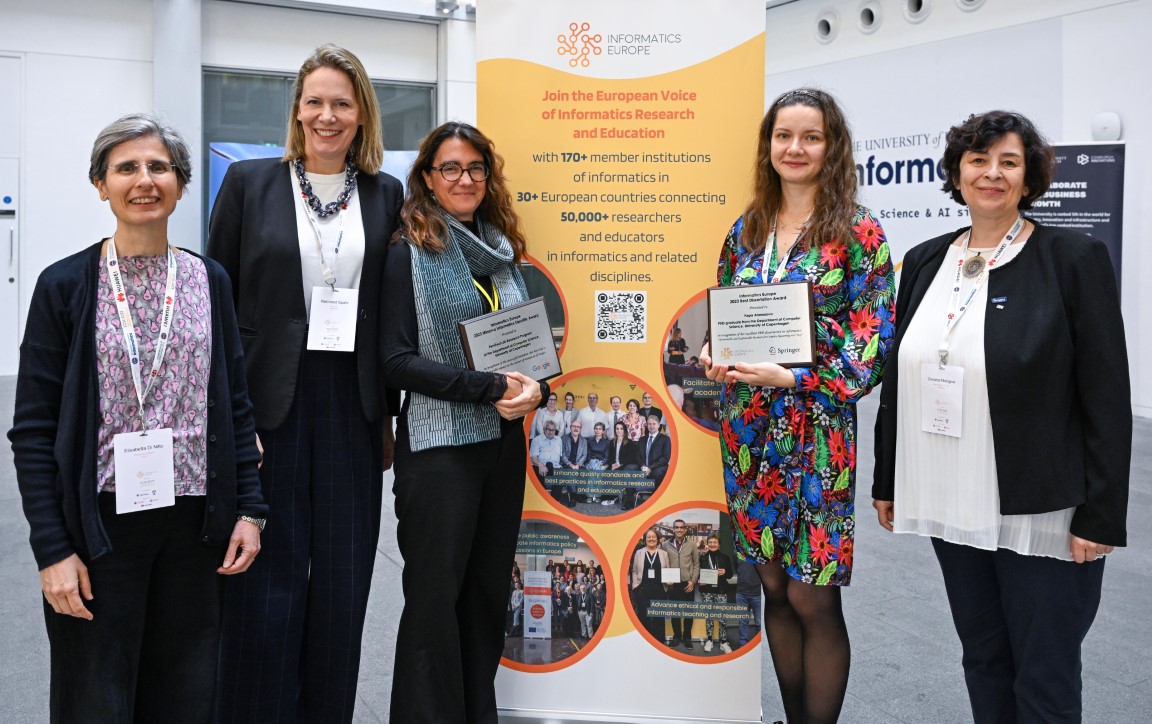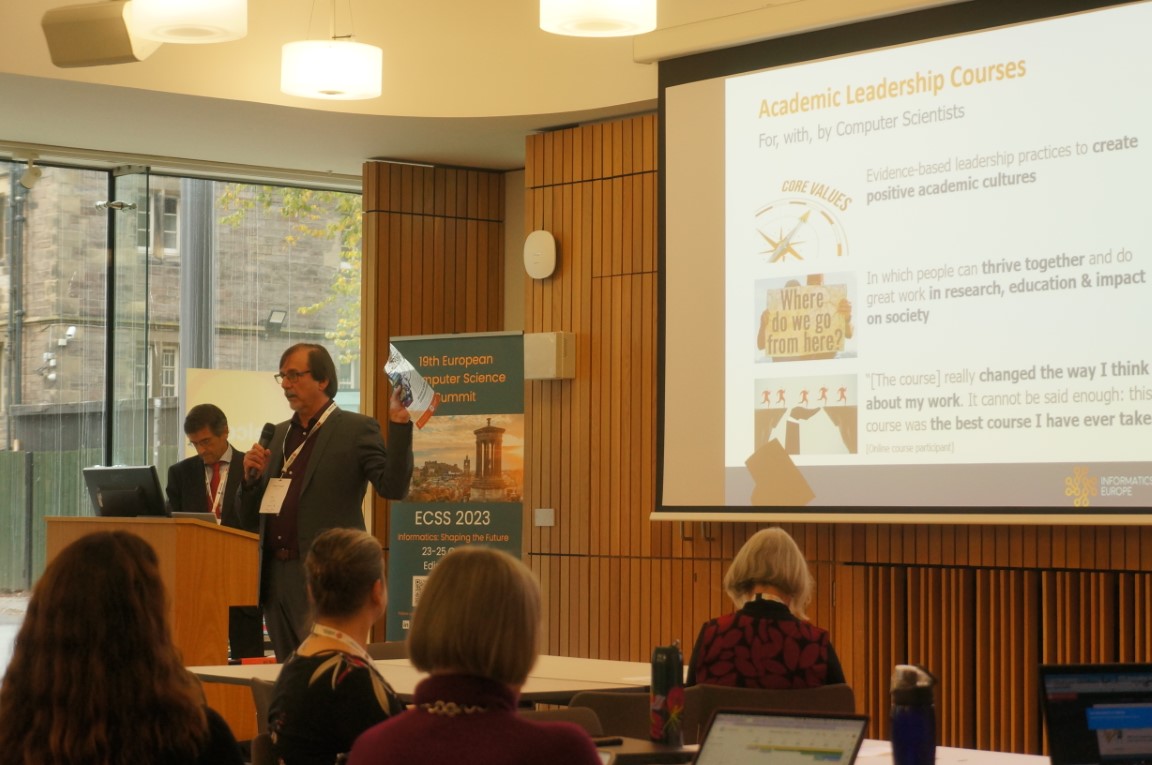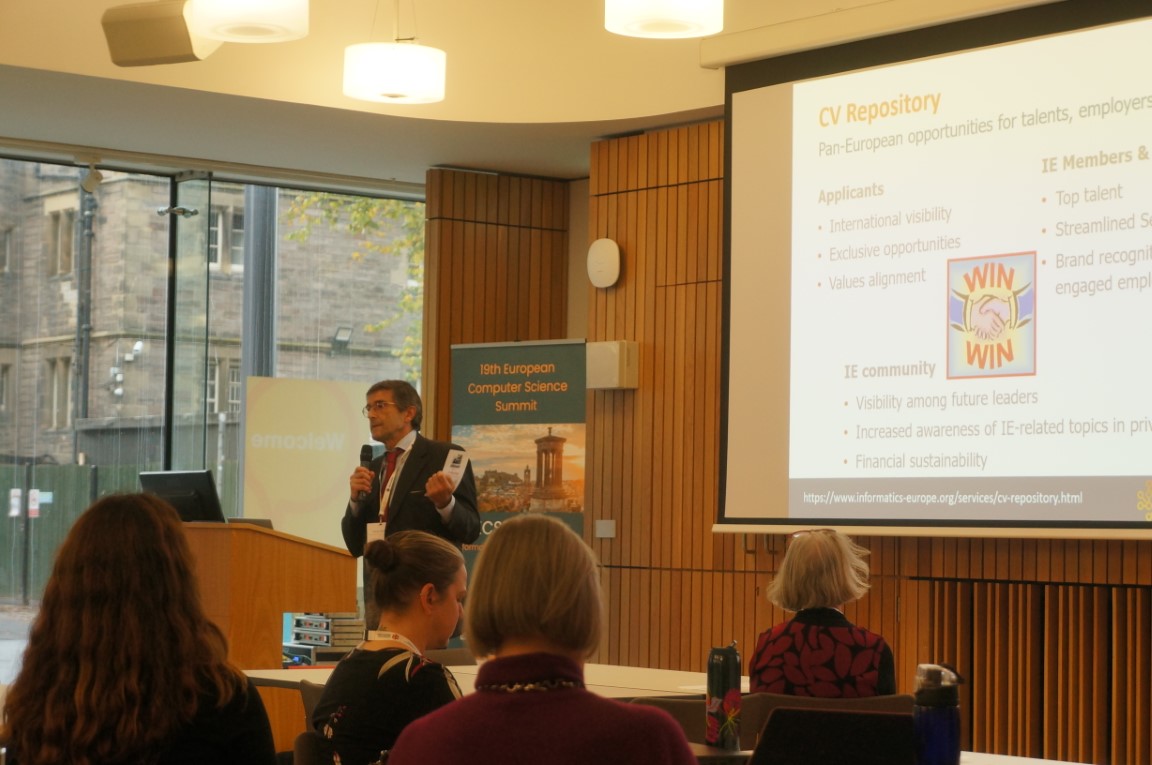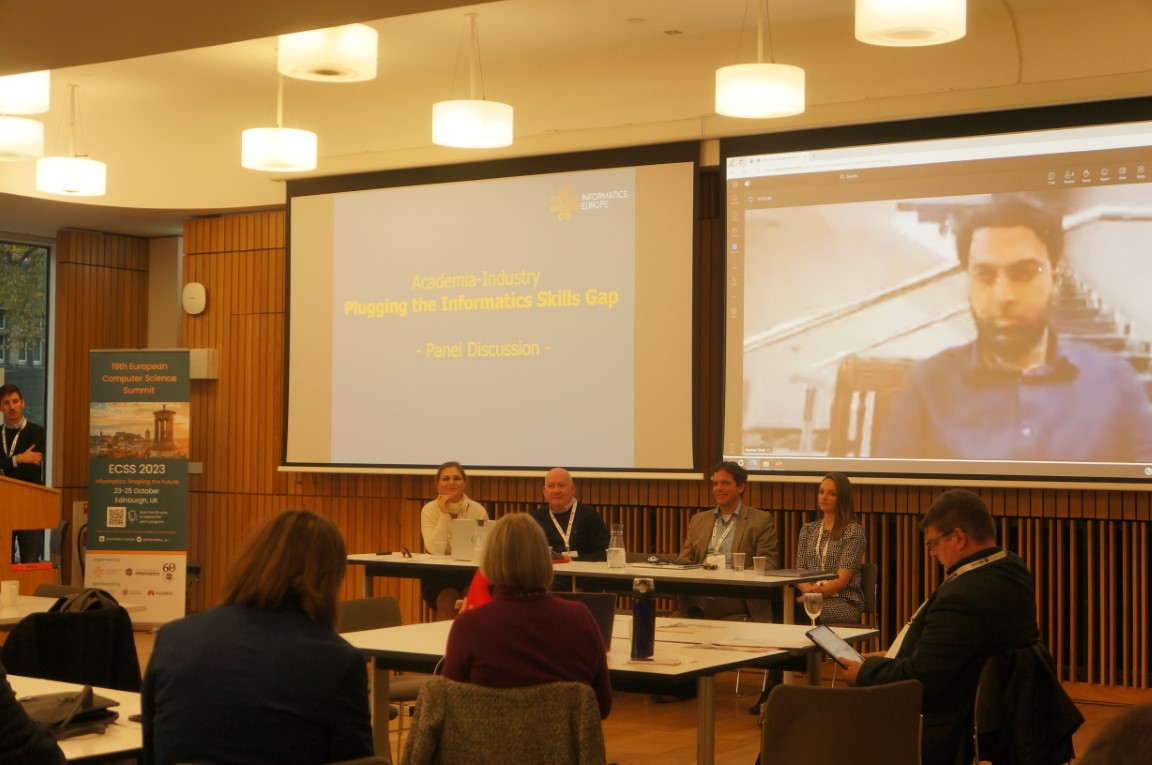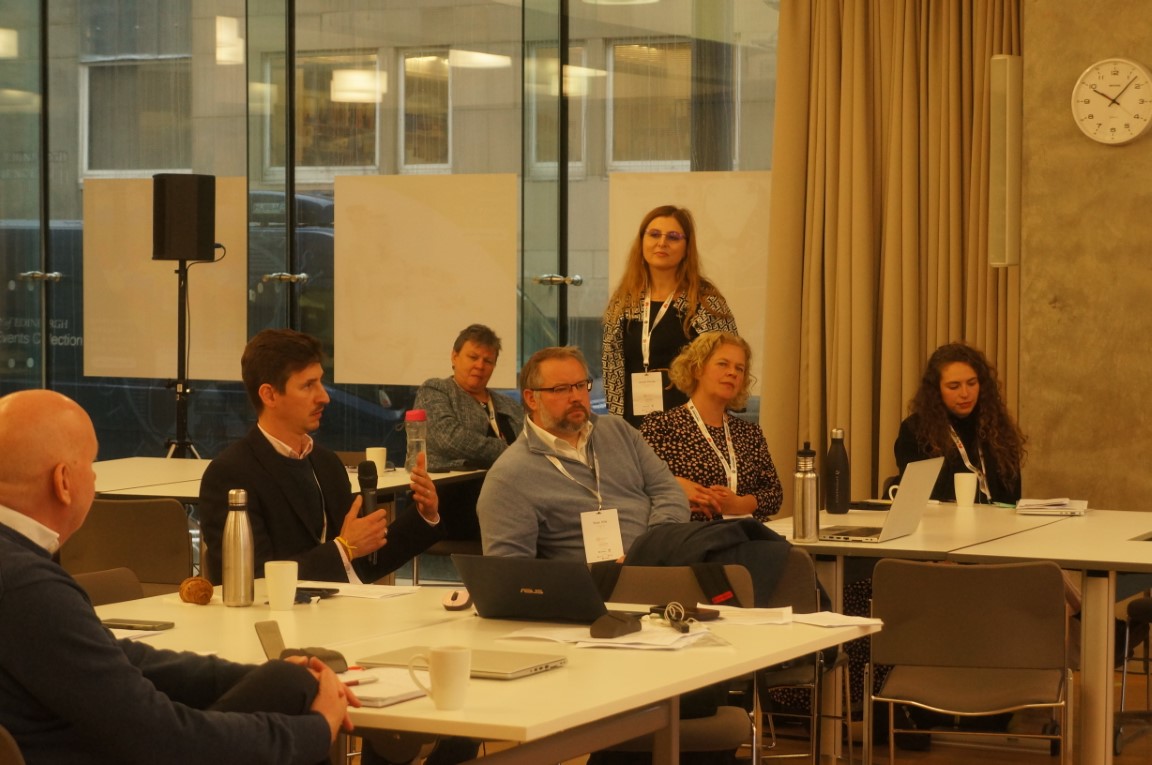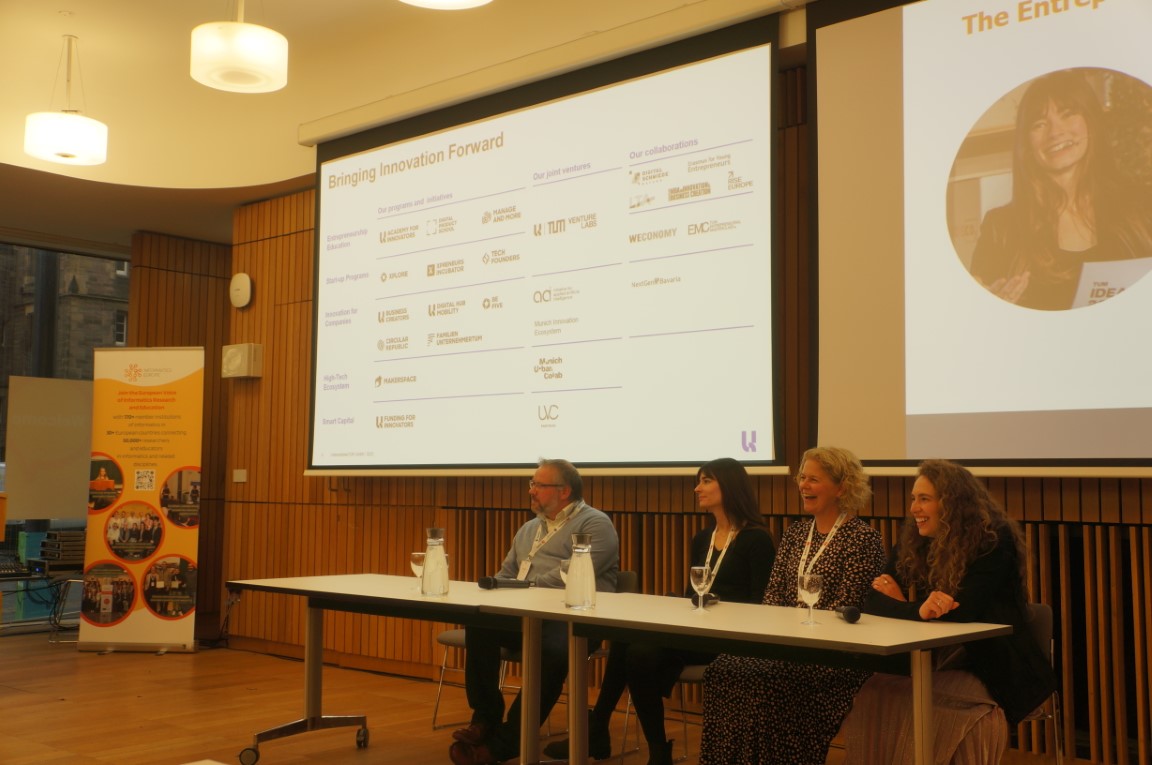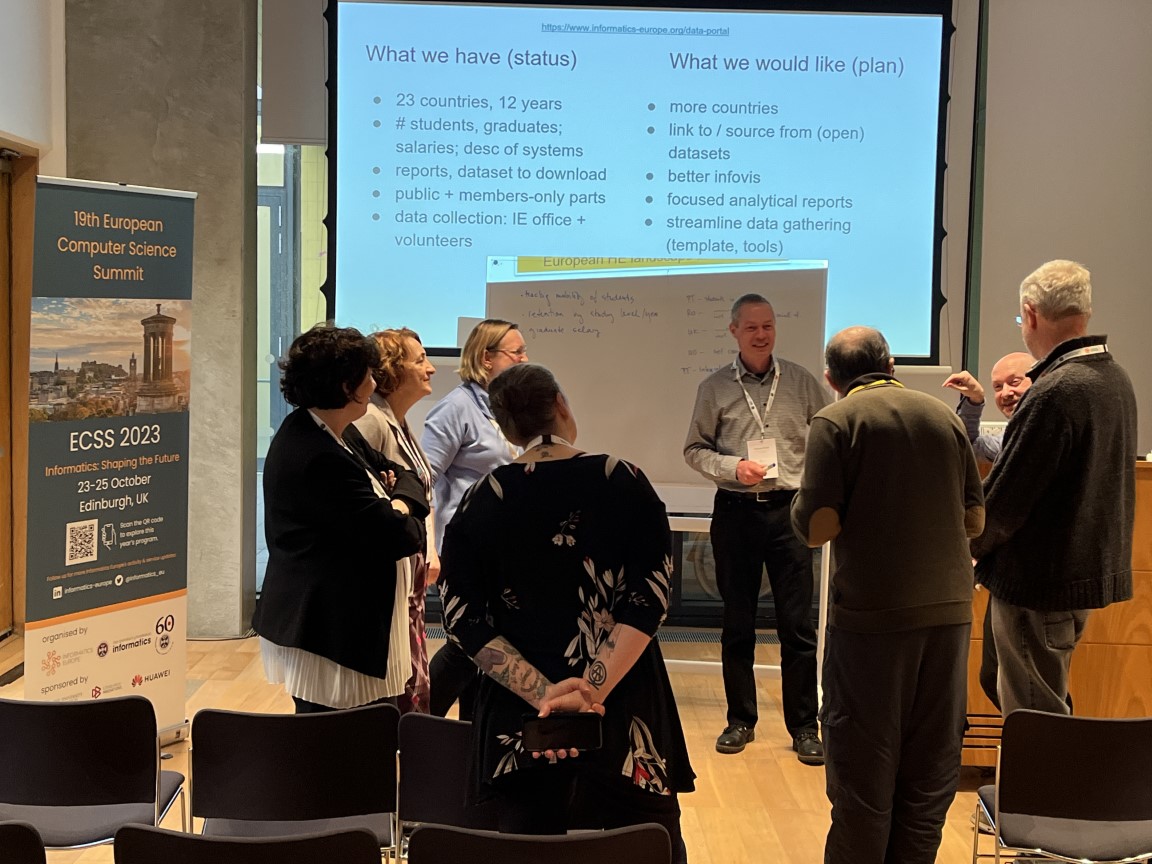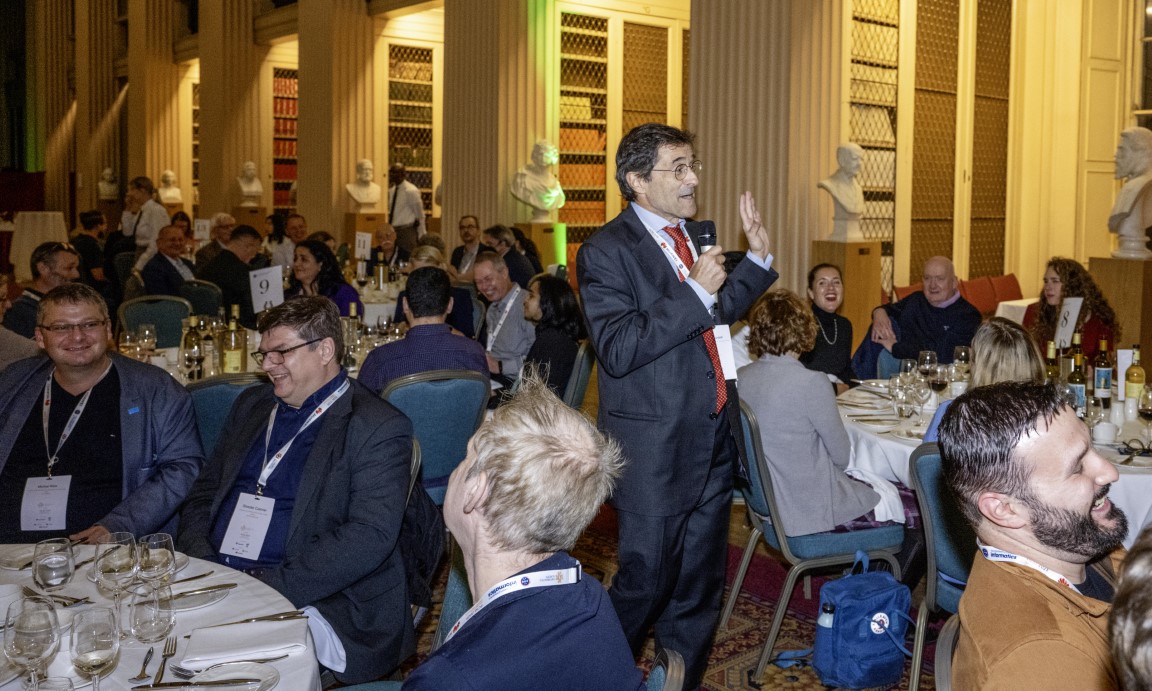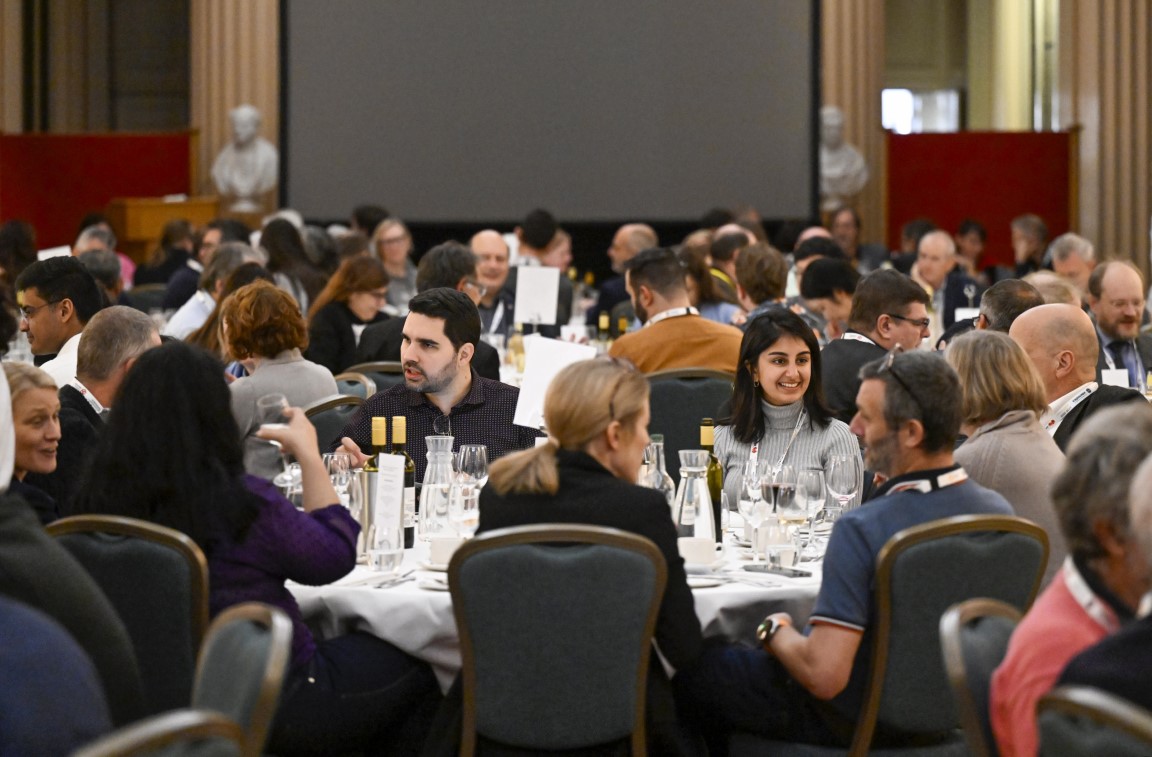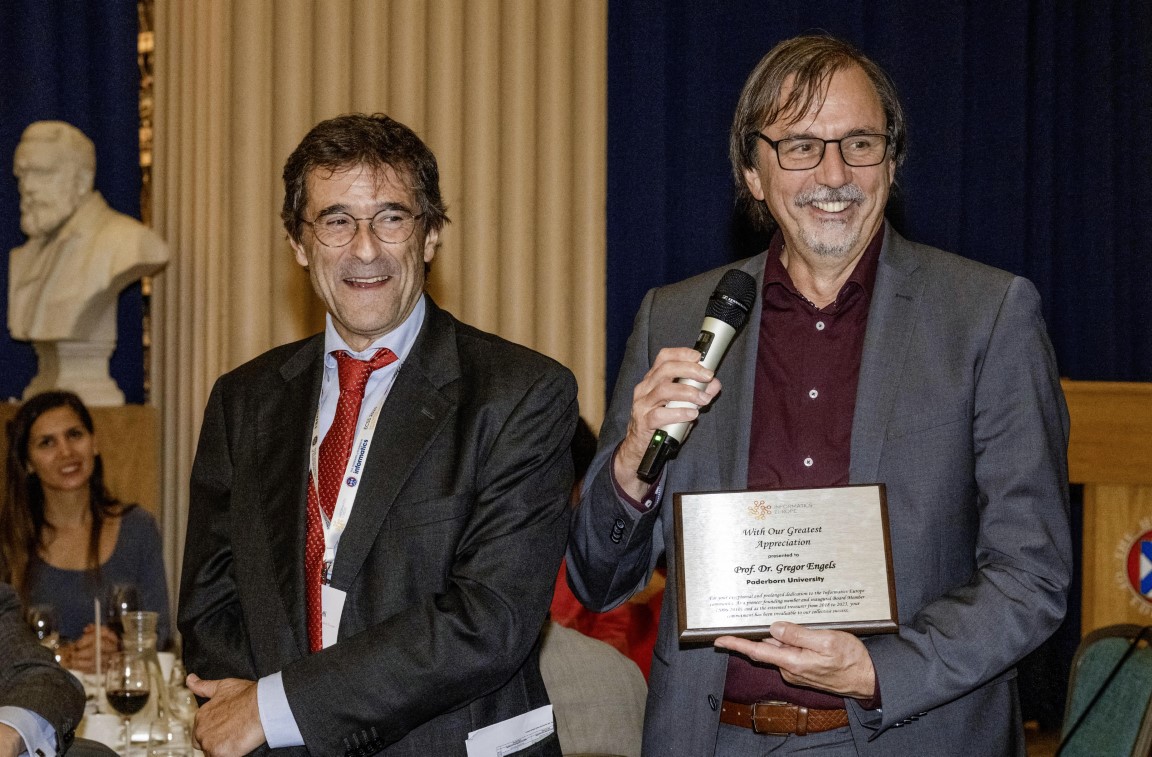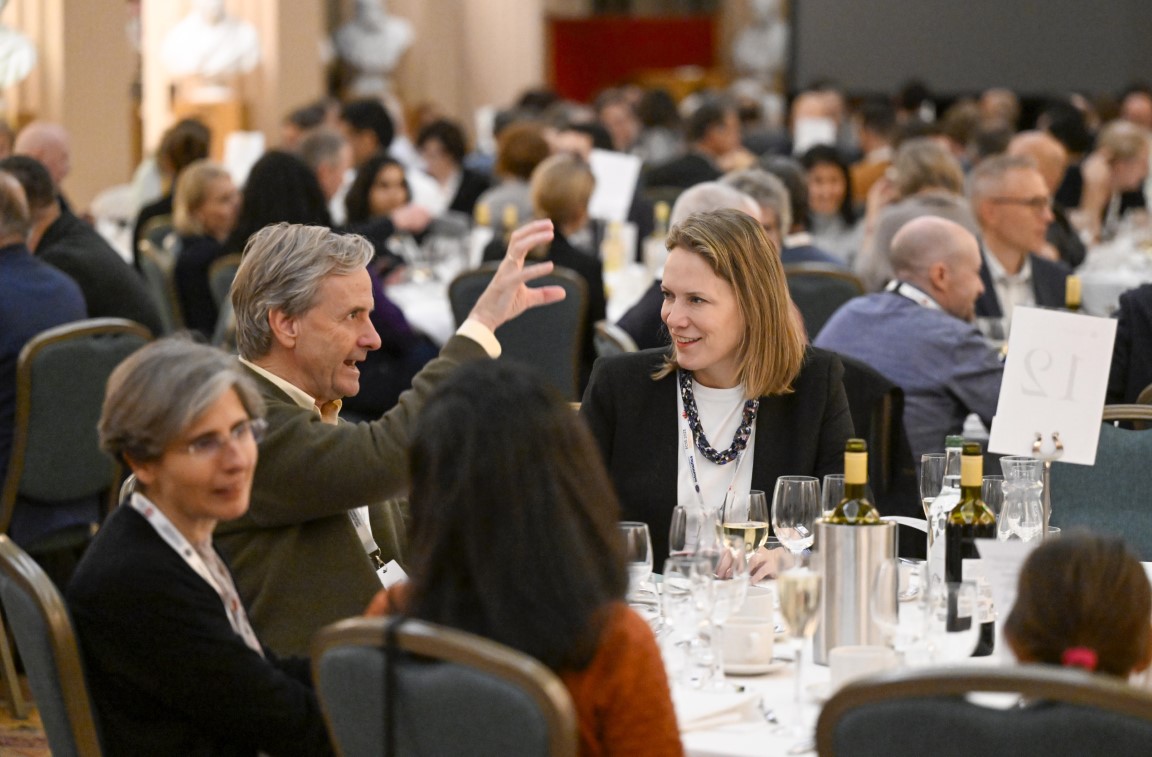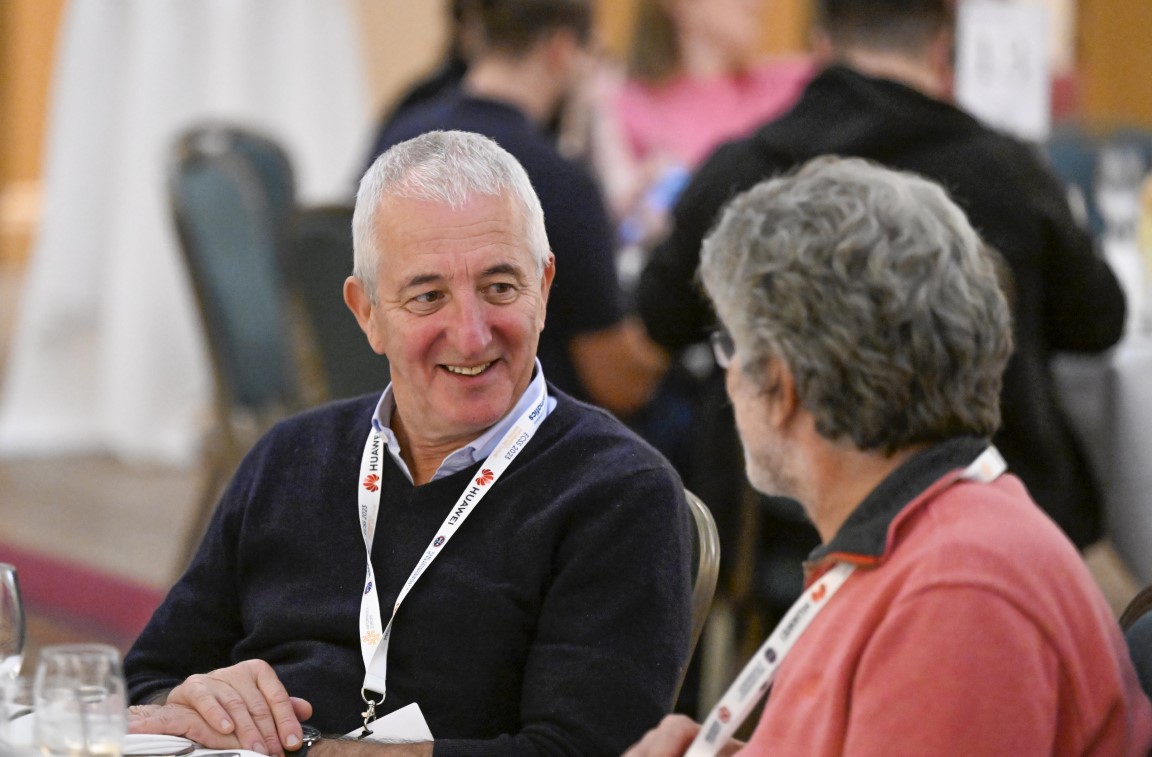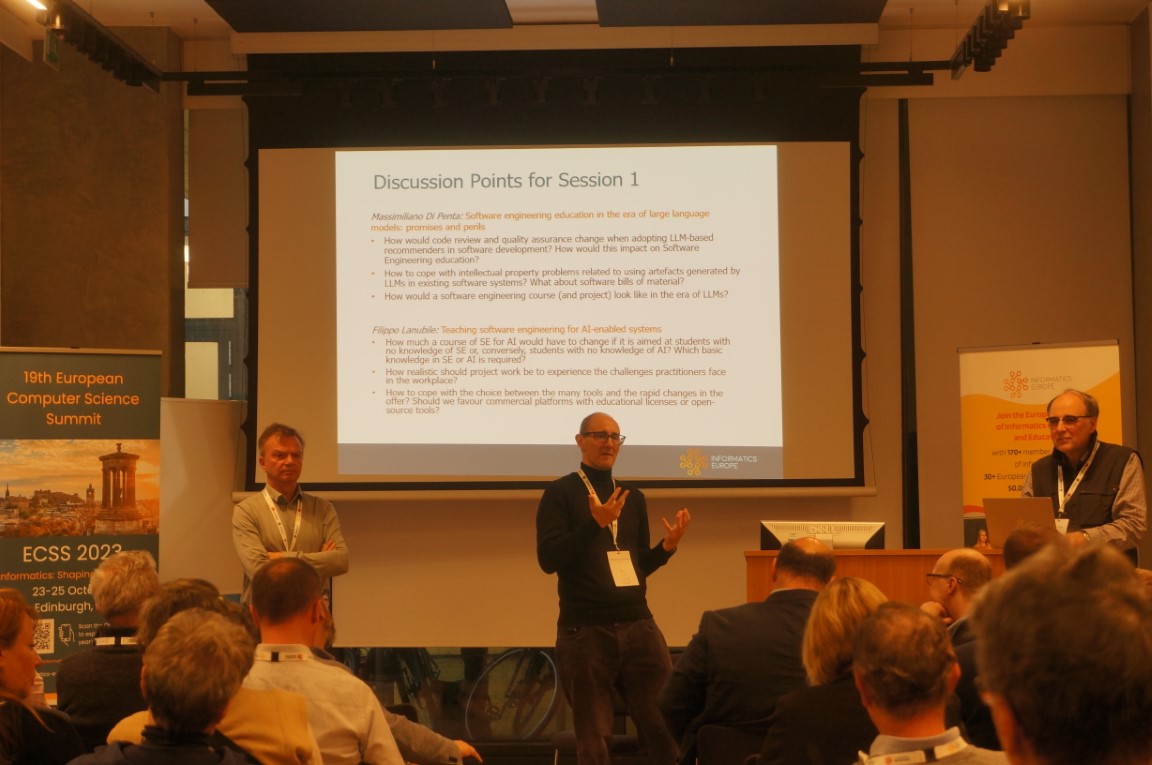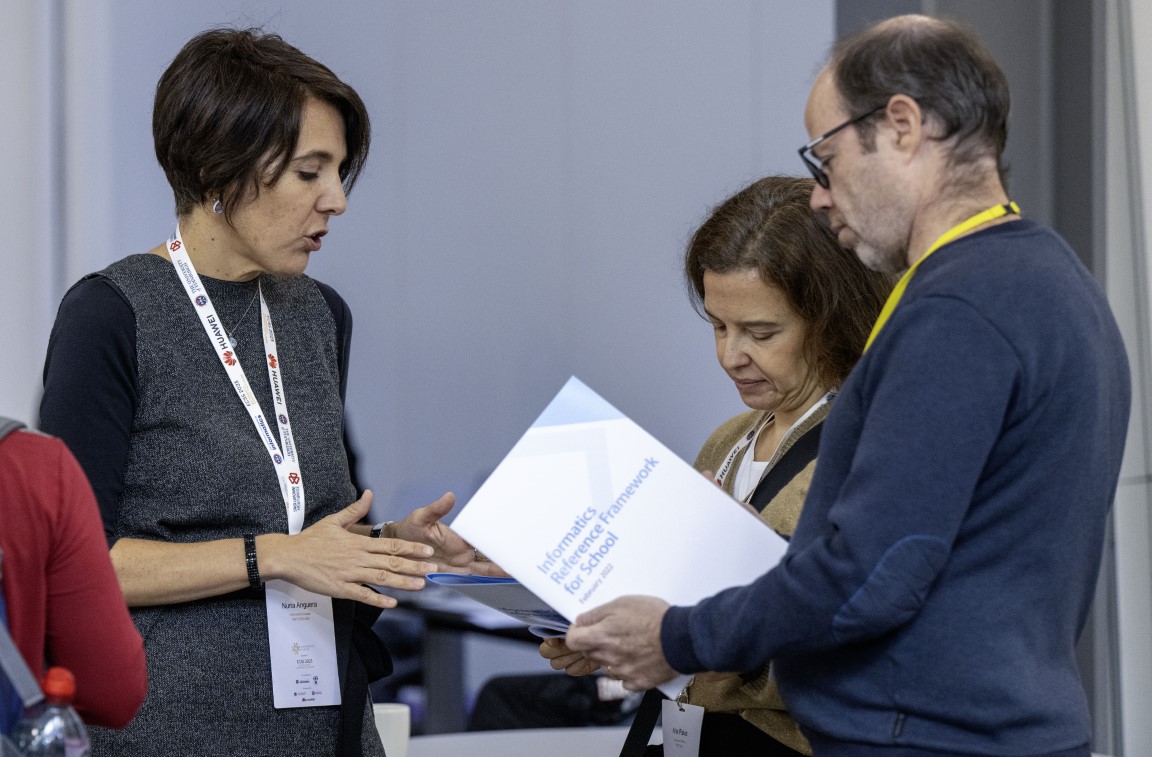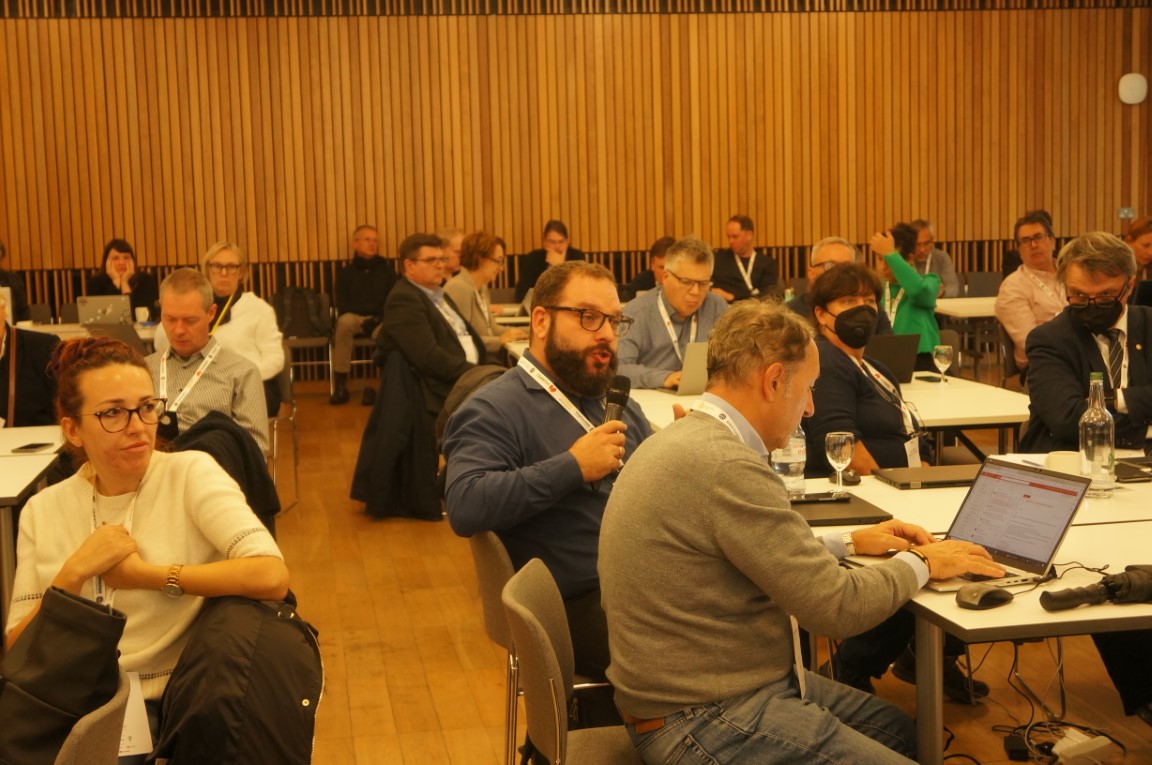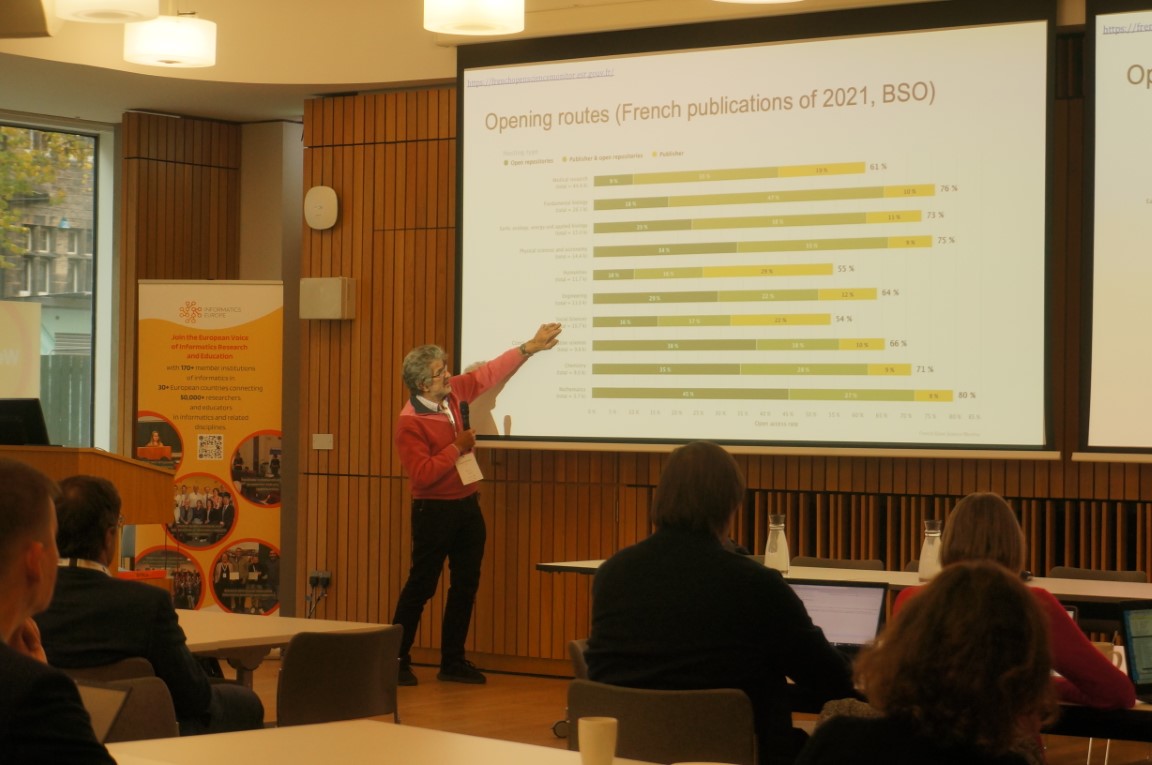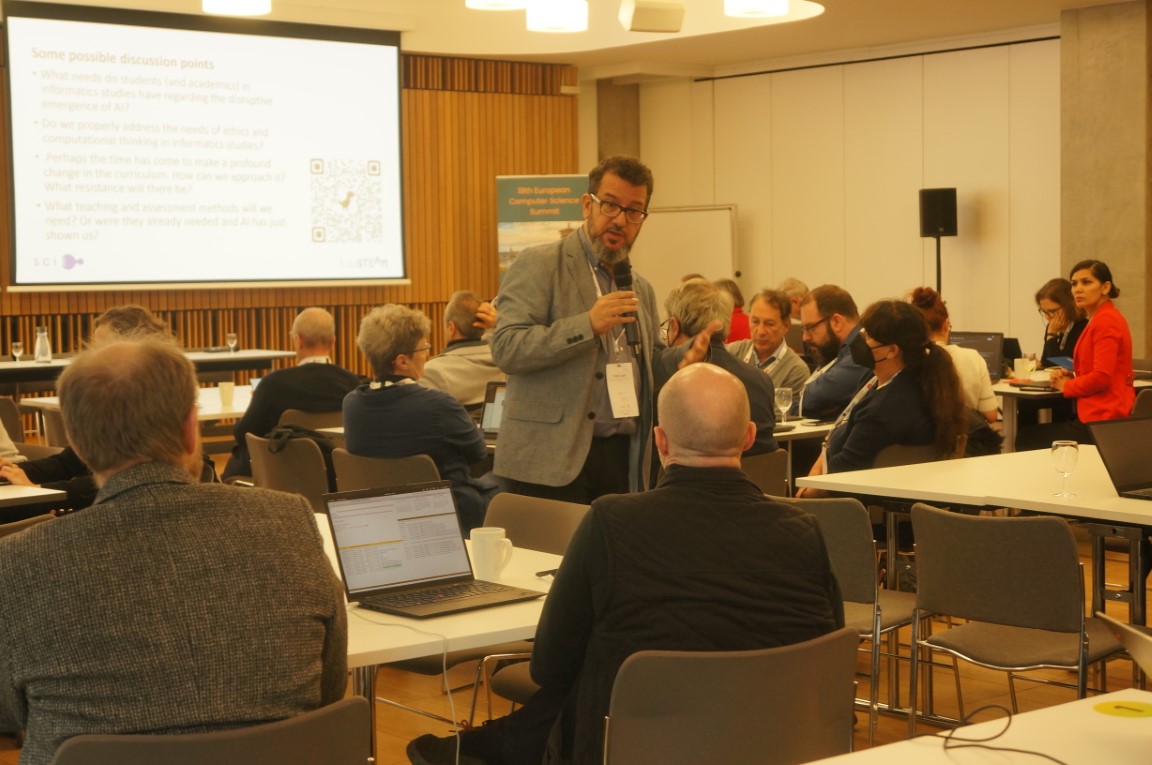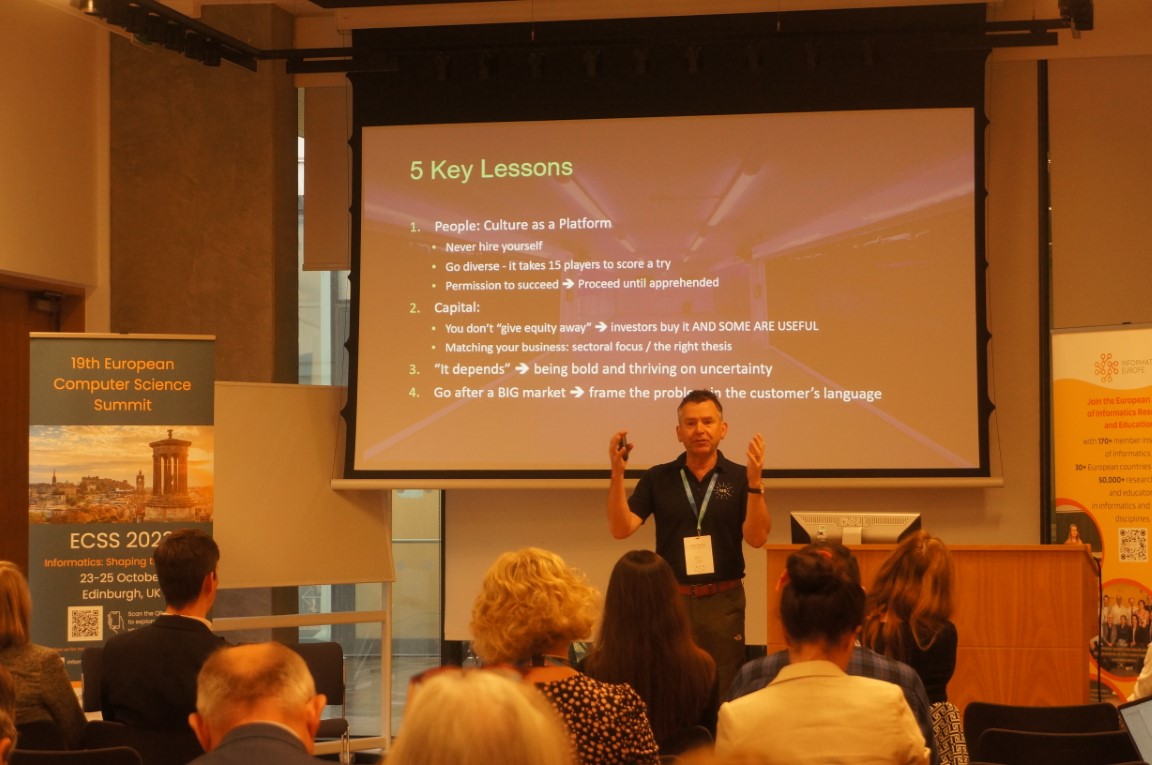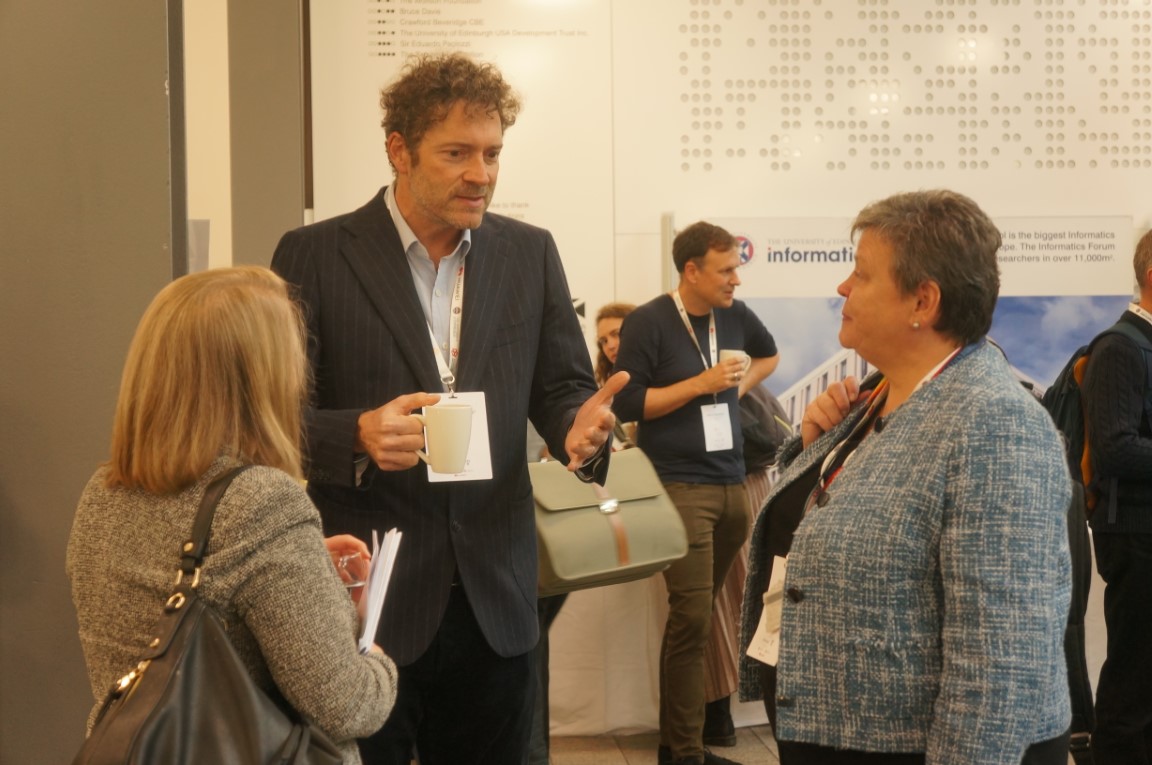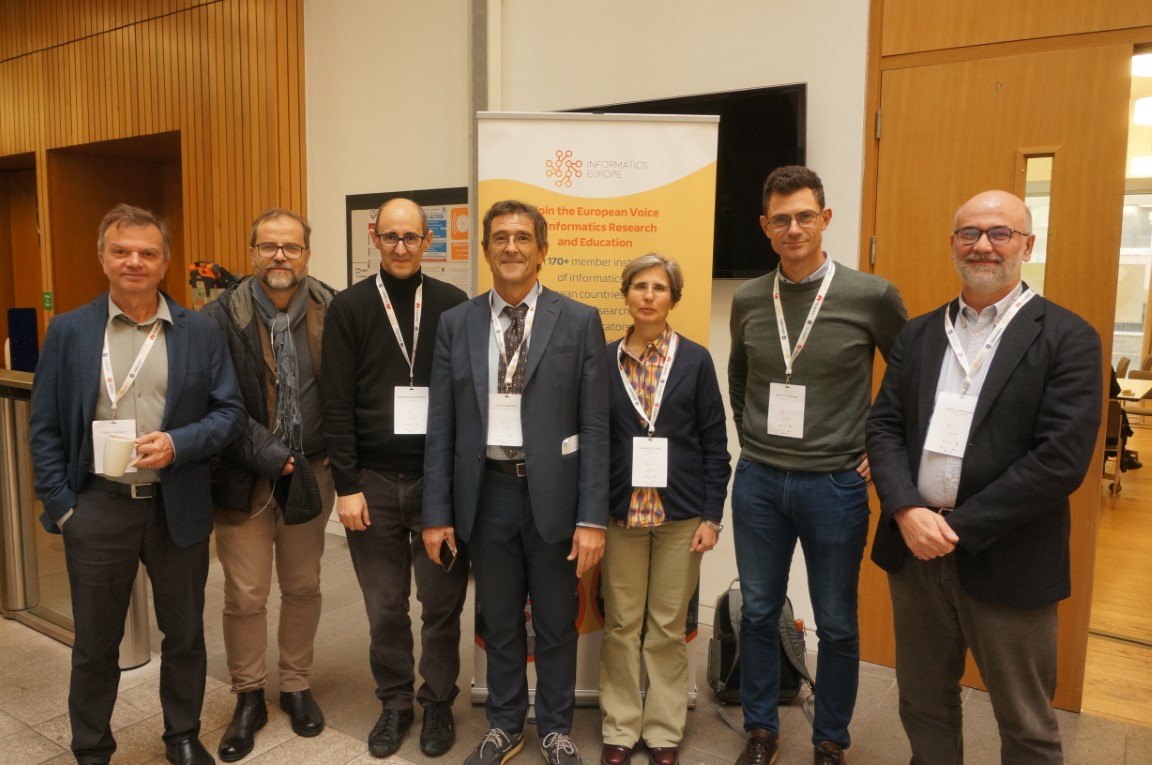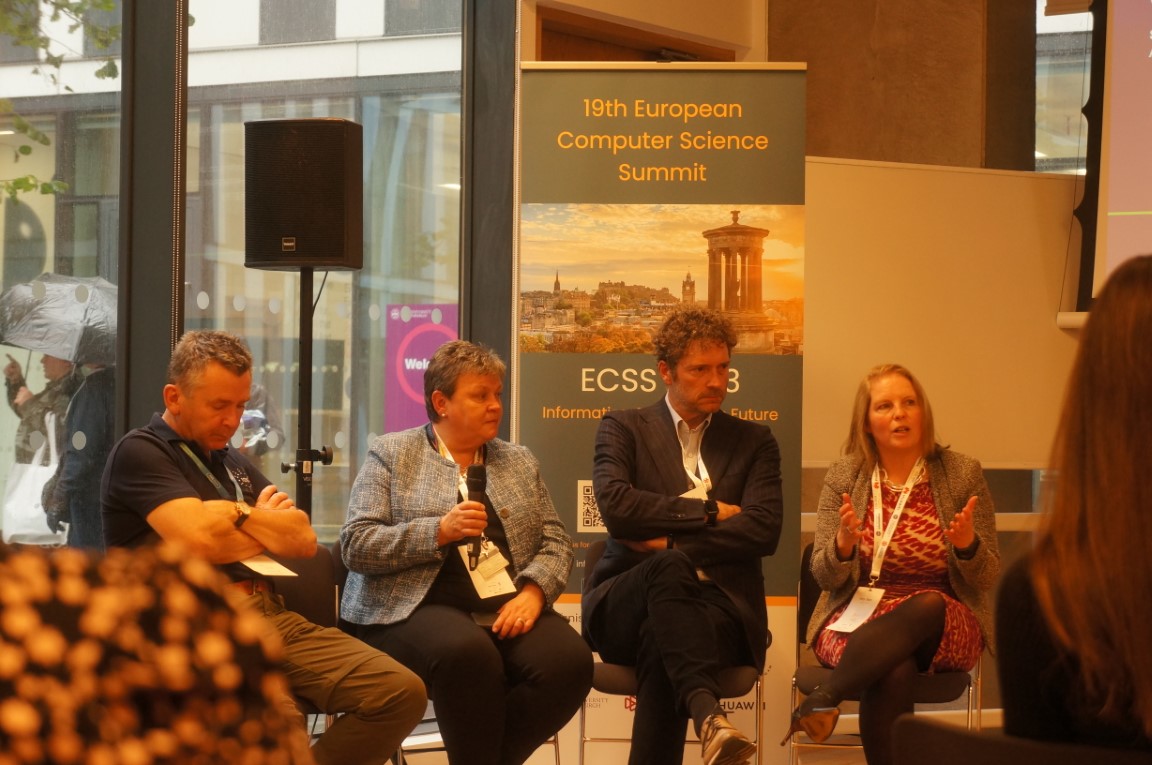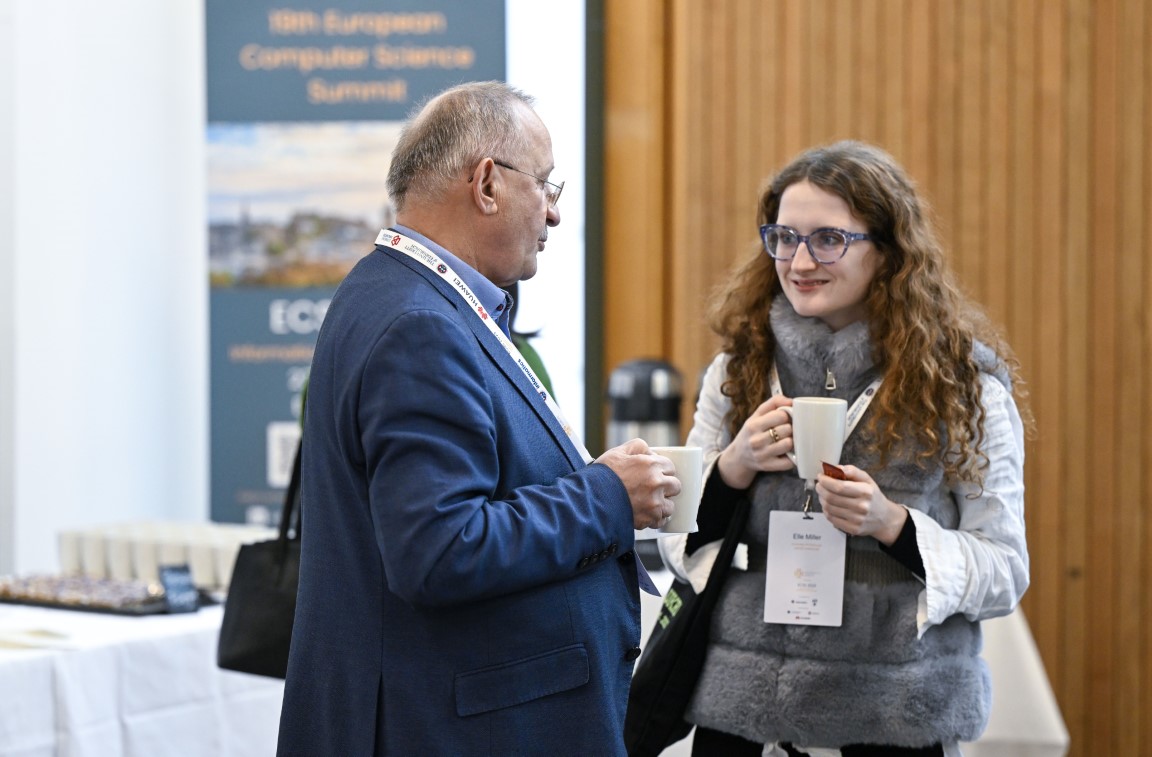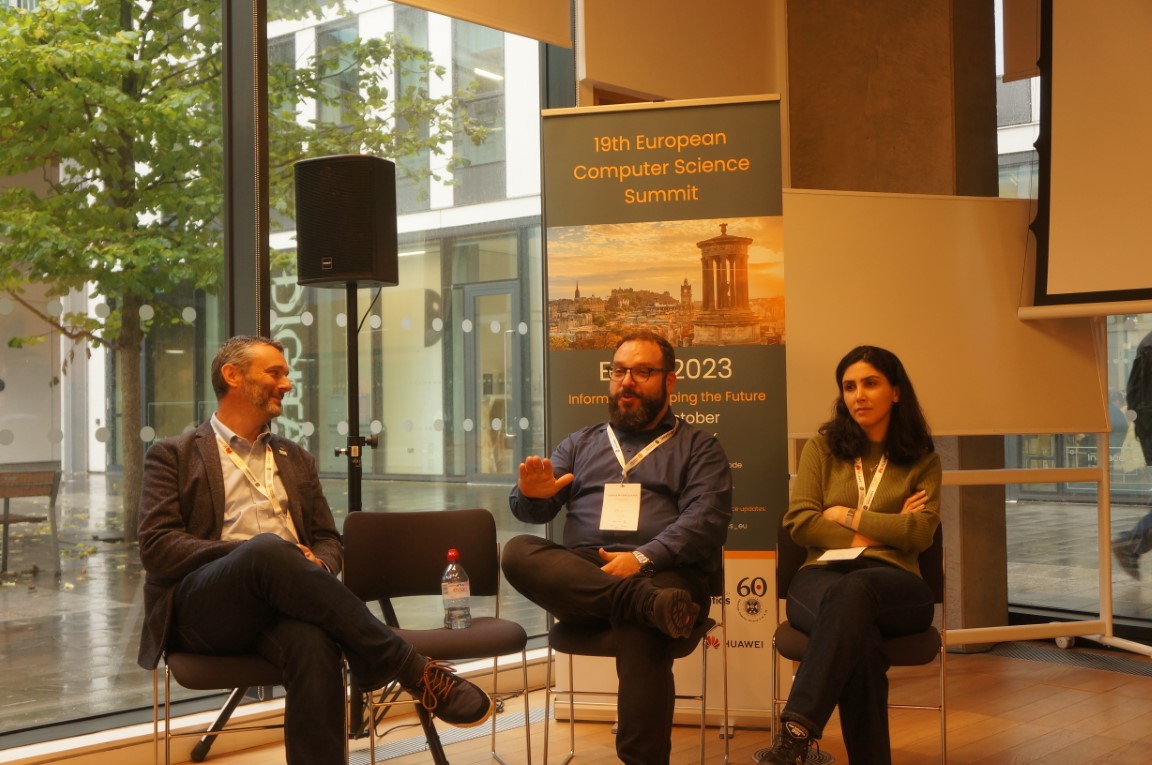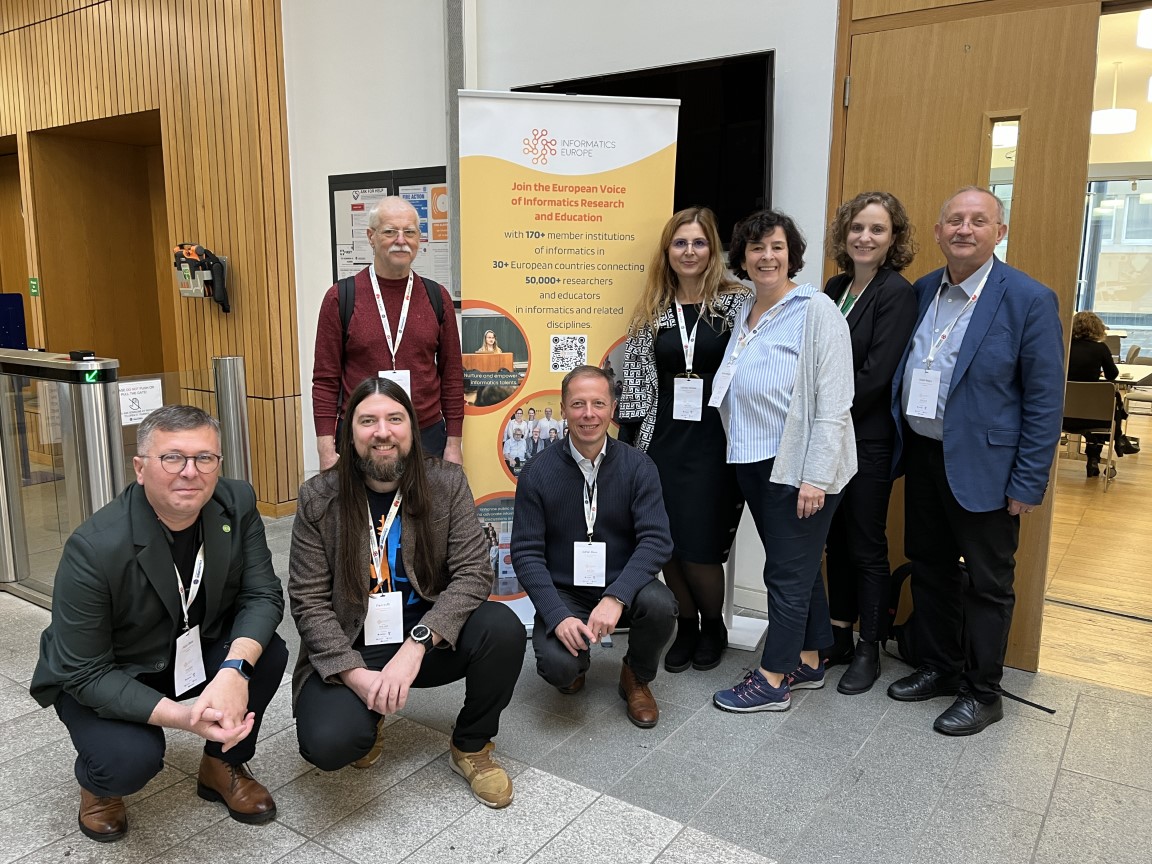ECSS 2023 - Highlights
The 19th European Computer Science Summit (ECSS 2023) was held from October 23-25 in Edinburgh, UK. Co-organised by the School of Informatics of the University of Edinburgh and sponsored by Huawei and Edinburgh Innovations, the Summit convened all levels of informatics leaders, researchers, policymakers and industry representatives to discuss this year’s main theme “Informatics: Shaping the Future”.
A special Informatics Europe introductory session took place before the official opening of ECSS 2023, where Enrico Nardelli, IE President and Nuria Anguera, IE Executive Director offered insights into IE activities and membership benefits.
Following the special session, Iain Grant Gordon, Vice-Principal at University of Edinburgh and Head of its College of Science and Engineering, Jane Hillston, Conference Co-Chair and Professor of School of Informatics at University of Edinburgh, and Enrico Nardelli, IE President and Conference Co-Chair, officially inaugurated ECSS 2023. The Summit then commenced with two concurrent workshops: Leaders Workshop and Professional Development Workshop for Early Career Researchers.
Leaders Workshop
Co-organised with COST Action EUGAIN – European Network For Gender Balance in Informatics, the Workshop brought together leaders from various backgrounds and regions across Europe to discuss critical issues of diversity and inclusion in the field of informatics, including gender equality.
Facilitated by Jane Hillston (University of Edinburgh, UK & EUGAIN COST Action member), the first session encouraged participants to reflect on their journeys in the field of informatics, and share their diverse experiences, perspectives and where they stand today. The session was then followed by a presentation by Marieke Huisman (University of Twente, the Netherlands & EUGAIN COST Action member), who provided valuable insights into promoting diversity and inclusivity, especially in hiring and promoting women within informatics departments, in both academic and professional settings.
After lunch, Richard Boardman (2Macs, UK) led a thought-provoking workshop with group discussions on weighing the balance between rights and wants, acceptability, and boundaries. Attendees left with actionable insights for promoting inclusivity. The workshop was then followed by a vivid panel discussion with Aurora Constantin, Jacques Fleuriot, and Sara Shinton (University of Edinburgh, UK), on underrepresented groups such as people with disabilities and racial/ethnic minority groups. Their perspectives shed light on the challenges they have faced and the strategies they have employed to thrive in the field of informatics.
The workshop concluded with closing remarks by Jane Hillston and Sara Shinton. Participants left with a sense of purpose and a grasp of necessary actions to drive change and foster a more inclusive future for informatics.
Professional Development Workshop for Early Career Researchers
This year’s edition of the Early Career Researchers (ECRs) Workshop, which attracted a big number of participants from different career stages, focused on helping early career researchers plan a successful research career.
Sara Shinton (UKRI Future Leaders Fellowship Development Network, UK) kicked off the workshop with a dynamic presentation on research and innovation leadership. She provided tools to support ECRs seize leadership opportunities and develop the skills necessary to become impactful leaders. She encouraged ECRs to build their networks so as to support their development, and also incorporate leadership training into their plans.
In the afternoon, the workshop continued with a session featuring five panel speakers from academia and industry, who shared with us their experiences and views on the factors that contribute to a successful research career in various sectors:
- Dympna O'Sullivan (TU Dublin, Ireland) outlined crucial factors for ECRs, emphasizing focus on research, effective time management, strategic publication planning, knowing the funding environment and developing leadership skills.
- Marco Aiello (University of Stuttgart, Germany) highlighted the significance of seizing mobility opportunities to expand knowledge, foster collaborations, build networks and enrich experiences with diverse academic cultures as these would help ECRs thrive in academic environments.
- Manuel Carro (Technical University of Madrid/IMDEA Software Institute, Spain) shared his career insights, including the value of community engagement, trying to be at the forefront of opportunities, being reliable and going the extra mile when collaborating. He encouraged ECRs to surround themselves with a network of excellent people, and emphasize the importance of public speaking skills and maintaining a big-picture perspective.
- Ambrish Rawat (IBM Research Europe, Ireland) shared insights as an industry researcher, discussing challenges and opportunities in applied research within the commercial sector. He highlighted the pros and cons of working in hybrid teams, where interesting research challenges needed to be weighed against concrete commercial goals. He highlighted the mindset shift from academia to industry, emphasizing the importance of network support for this transition.
- Victor Lomüler (CodePlay, UK) stressed the significance of passion for research in an industrial setting and developing leadership skills to cope with organizational nuances. He underscored the value of mentors as a crucial support network for enhancing both research and leadership skills.
Participants had the chance to ask questions in a plenary session moderated by Dimka Karastoyanova (University of Groningen, the Netherlands), and joined round table discussions with panelists facilitated by Tobias Grosser (University of Edinburgh, UK).
As part of the workshop, a total of 10 research work were presented with posters by informatics PhD students during the ECSS opening reception on Monday evening.
Main Theme – “Informatics: Shaping the Future”
Chaired by Jane Hillston (University of Edinburgh, UK) and Gregor Engels (Paderborn University, Germany), the second day of ECSS 2023 started with the main theme session on the relevance of informatics for shaping the future.
Elham Kashefi (The National Quantum Computing Centre, UK) highlighted characteristics and advantages of quantum computing technology in general and also with a focus on UK initiatives. Mirella Lapata (University of Edinburgh, UK) discussed the central role of large language models in generative AI tools and techniques nowadays, emphasizing the need for human involvement to mitigate risks and ensure unbiased information management. Stefano Ceri (Politecnico di Milano, Italy) delved into data modeling and data analytics techniques in life sciences, demonstrating their effective application in analyzing data during the Covid-19 crisis. Finally, Jochen Viehoff (Heinz Nixdorf MuseumsForum, Germany) addressed diverse computing paradigms, asserting that sustainability demands new (and old) alternatives beyond traditional digital computing to tackle global energy consumption challenges.
The session continued with a panel chaired by Ewa Luger (University of Edinburgh, UK), where Mira L. Wolf-Bauwens (IBM Research Zurich, Switzerland) also joined the group. Being trained in philosophy, politics and economics, Mira addressed socio-ethical questions that arise with the development of useful quantum computing and quantum-safe technologies. The panelists agreed that it takes the entire classical informatics research to raise useful and reliable quantum computing as well as data science applications. In order to cope with energy consumption and sustainability demands, hybrid approaches combining different computing models aligned with the problem requirements should be the solution in the future. A final take-away was the value of understanding the past to design a reliable and value-based future.
Awards Ceremony
During each ECSS, we celebrate institutions, teams and individuals who have outstanding contributions and performances in the field of informatics.
This year, we were delighted to announce at our award ceremony that Pepa Atanasova, a PhD graduate from University of Copenhagen, Denmark won the inaugural IE Best Dissertation Award (BDA). The ceremony was attended by our award sponsor Springer, represented by Welmoed Spahr (Vice President Computer Science Books) who presented the Award to Pepa, along with the runners-up Shiwei Liu (Eindhoven University of Technology, the Netherlands) and Francesco Pierri (Politecnico di Milano, Italy).
In collaboration with COST Action EUGAIN, the IE 2023 Minerva Informatics Equality Award (MIEA), sponsored by Google, acknowledged efforts and dedication from initiatives that support women in informatics education and research. This year we again celebrated two deserving winners: gender-equality and anti-harassment committee from LIS (Computer Science Lab), Aix Marseille University (France), and FemTech.dk research program at the Department of Computer Science, University of Copenhagen (Denmark).
For further details on the work of this year’s winners or previous years’, please explore our BDA & MIEA webpages.
Dialogue with Members - Informatics Europe Activities and Outcomes
As usual, we provided updates of IE’s key activities and achievements in a dedicated session during ECSS. Additionally, we offered IE members the chance to provide feedback and propose ideas to shape the IE strategies.
Today IE has 177 member institutions from 34 countries, connecting around 50,000 informatics researchers across Europe. The potential of IE extends as far as our collective ambitions. We encourage our members to stay engaged in our working groups, as any contribution, whether large or small, plays a crucial role in developing initiatives and activities that bring positive changes to the European informatics community.
We also presented reviews and updates on various IE services such as the IE Department Evaluation Service, evidence-based Academic Leadership Courses (now customizable for individual departments) and our latest career service CV Repository offering pan-European opportunities for talents and employers in informatics and related fields. Members were reminded of the significance of supporting IE by sharing our activities within their networks, utilizing our services, and encouraging more peer institutions and colleagues to join the IE community.
Higher Education Data Workshop
With the Higher Education Data Portal as one of our most appreciated services, this workshop presented the latest data as a result of our portal and work carried out by IE’s Data Analysis and Reporting Working Group.
Elisabetta di Nitto (Politecnico di Milano, Italy), IE’s Vice-President, presented a recent IE publication “Informatics Higher Education in Europe: A Data Portal and Case-Study” “Informatics Higher Education in Europe: A Data Portal and Case-Study” published in the November 2023 issue of the Communications of the ACM Journal. Svetlana Tikhonenko (IE’s Program Associate – Web, Data and Analysis) also gave a behind-the-scenes presentation of our data portal, explaining what constitutes the portal, where and how we gather the data, and how country representatives and other members of the organization can help in its development.
With Premek Brada (University of West Bohemia in Pilsen, Czechia) and Elisabetta di Nitto serving as moderators, participants were divided into small groups and discussed what functionalities and data from the Data Portal they would be interested in. The outcomes are ranked by priority:
- tracking of student mobility, double and joint degrees;
- language of instruction in informatics study programmes;
- evolution of informatics-related study degrees by years;
- minors that go together with informatics, programmes where informatics is a minor;
- retention and graduation rates, employability of graduates;
- student nationality and other demographics, for example, country of origin.
The Working Group will take into account these feedback as we persist in our effort to enhance our data portal. We invite organisations and colleagues to collaborate on these and other shared interests by joining our Working Group and research activities.
Academia-Industry Sessions
Chaired by Lenuta Alboaie (Alexandru Ioan Cuza University of Iasi, Romania) and Jim Ashe (University of Edinburgh, UK), two pivotal sessions carved out the intersection between academia and industry during ECSS 2023.
Tuesday’s session "Plugging the Informatics Skills Gap” showcased the urgency of lifelong learning in the tech domain. Critical takeaways were provided by industry leaders: Faisal Kamran (SONY) emphasized the collaborative potential between industry and academia; Michael Gienger (Honda Research Institute) highlighted the role of continuous learning in company research, and Elizabeth Barr (CISCO Networking Academy) presented a vision for an inclusive tech future.
Wednesday’s session "The Journey from Higher Education to Entrepreneurship” pivoted towards monetizing academic research and nurturing entrepreneurship. Key highlights included insights from Edinburgh Innovations on creating AI-driven businesses, The DataLab's ethical journey from research to startup, and UnternehmerTUM GmbH's entrepreneurial blueprint. Moreover, success stories by David Farquhar (Intelligent Growth Solutions Limited, UK) and Chris Van der Kuyl (4J Studios, UK) resonated with budding entrepreneurs, while investment perspectives were shared by Andrea Young (Old College Capital, UK) and Kerry Sharp (Scottish Enterprise, UK), emphasizing its pivotal role in tech innovation.
In essence, these sessions underscored the evolving symbiosis between academia and industry, enriched by the insights and experiences of all participants. .
National Informatics Associations “AI and the Future of Informatics Education” Workshop
The National Informatics Associations workshop covered two areas this year: two morning sessions were devoted to the interaction between the latest developments of AI and its interaction informatics education, and one afternoon session continued last year's open science workshop, focusing on the evaluation of research in the realm of open science.
In the first morning session, two talks delved into two complementary aspects of the interplay between AI and SE. In the first talk, Massimiliano di Penta (University of Sannio, Italy) addressed the influence of Large Language Models (LLMs) in Software Engineering (SE) education, highlighting concerns arising from their effectiveness in code generation, review and bug patching. A decrease in manual code writing will continue with the ongoing progress of AI support, prompting adjustments in SE education. Students should understand AI capabilities and techniques, while also considering limitations, trust issues and legal challenges associated with AI applications, such as prompt engineering.
In the second talk, Filippo Lanubile (University of Bari, Italy) discussed how to do SE where some of the components are AI-enhanced and need training at large scale with specific data. He reported on an experimental course developed at the University of Bari and the Technical University of Catalunya, where ML components are perceived as first-class citizens and put into production as part of a more traditional SE pipeline, resulting in the concept of MLOps as a counterpart of DevOps. This brings about challenges that are not so prominent in traditional SE such as reproducibility. Students appreciated the course but noted a high workload and tool diversity, sometimes lacking robustness/documentation.
The third talk of the morning was given by David López (Scientific Society of Computing of Spain/Universitat Politècnica de Catalunya, Spain) who presented his ideas on the wide impact of AI on teaching informatics. He highlighted AI’s amplification of existing issues and the divisive opinions surrounding it. He mentioned that educators can take advantage of the potential of modern AI to overcome some of the prevalent tenets in current education practices, such as homogeneity and repetition. AI can be leveraged to, for example, create tailored curricula and use alternative, open-ended evaluation methods that encourage creativity. This should be coupled with, on the one hand, general training on AI and, on the other hand, ethical codes and guidelines.
David’s presentation was followed by Thomas Gross (ETH Zurich, Switzerland) who delved into the question "up to which point can AI-enhanced tools replace programmers?". His talk reported on experimental data using Copilot on a series of code tasks usually delivered to students at ETH Zurich. Preliminary results suggest that such tools can be effective, but under the command/hints of a fairly seasoned programmer. At the moment, this programmer needs to have the skills necessary to read a problem statement and come up with a feasible solution for the task at hand (so that they can judge on the correctness and quality of the code generated by the AI program), and to craft tests to check that the code behaves as expected.
The afternoon session of the workshop addressed the topic of evaluating informatics research in view of the developments in open science. Pierre Paradinas (CNAM/SIF, France) and Laurent Romary (Inria, France) jointly presented on the theme with the aim of generating questions, rather than providing definitive answers. Informatics has specific characteristics, such as being inaccurately represented by journal publications, which make many widespread evaluation techniques inadequate. Moreover, in the realm of open science, also research outcomes such as code and data ought to be evaluated. There are existing initiatives to save, categorise, and link papers, code, and data, with different impact and prevalence in different communities, both within informatics and in closely related areas. Some questions to be pondered would be the right criteria for a fair and balanced research assessment in informatics; how to monitor contributions; and what tools can be produced to help automate this evaluation.
The talks were attended by a very interactive audience who posed several questions to speakers, with identified needs for further guidelines in the areas of teaching informatics/SE in the era of AI and informatics research assessment that accounts for open science. These themes will be developed within the IE working groups as future points of action. .
Green ICT and ICT for Green Workshop
Led by IE Green ICT Working Group Chair Marco Aiello (University of Stuttgart, Germany), the workshop kicked off with an insightful panel. Vasilios Andrikopoulos (University of Groningen, the Netherlands) highlighted challenges in measuring energy usage in cloud architectures and pinpointed the constraints of the Greenhouse Gas Protocol for cloud systems. Kawsar Haghshenas (University of Groningen, the Netherlands) underscored the energy-intensive nature of scheduling machine learning tasks in data centers. Brian Keegan (TU Dublin, Ireland) provided insights into weaving sustainability into computer science education.
A robust discussion ensued, delving into topics like the complexities of calculating embodied emissions, the interdisciplinary nature of ICT and sustainability, and the indispensable contributions required from experts across fields like psychology, sociology, economics, law, and power systems. Regulatory considerations came to the fore, with emphasis on the potential conflicts between societal sustainability objectives and the industry's economic ambitions, necessitating regulations, particularly in Europe.
The workshop concluded that IE’s Green ICT working group should focus on a proposal for enforcing data center transparency in terms of sustainability measurements and goals; the need to define how to educate computer scientists and engineers about sustainability and incorporate it into their ability to design systems; and to define software engineering processes that have sustainability as a core element.
ECSS 2024 in Malta
The next Summit, ECSS 2024, will take place in Malta, marking the 20th anniversary of ECSS, renamed as the European InformatiCs LeaderS Summit to better reflect its focus and goals. It will be again a unique opportunity to join your international peers to debate the future of informatics and contribute to a stronger European informatics community.
We warmly welcome you to become our ambassador and contribute to the growth of our community for enhanced collaborations in informatics and related fields. We would therefore reward you with complimentary registration to attend the next ECSS for any successful referral of new IE members.
Save the dates on your calendar: ECSS 2024, 28-30 October 2024 – we look forward to welcoming you and your colleagues again in our annual flagship summit next year!
To revisit the ECSS presentations, please check out the slides now available to download on our conference schedule webpage. More workshop photos* and additional materials are also available under respective workshop/session pages.
*Please note that the photos below are better viewed when applying zoom out.
